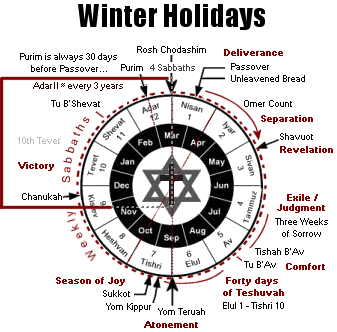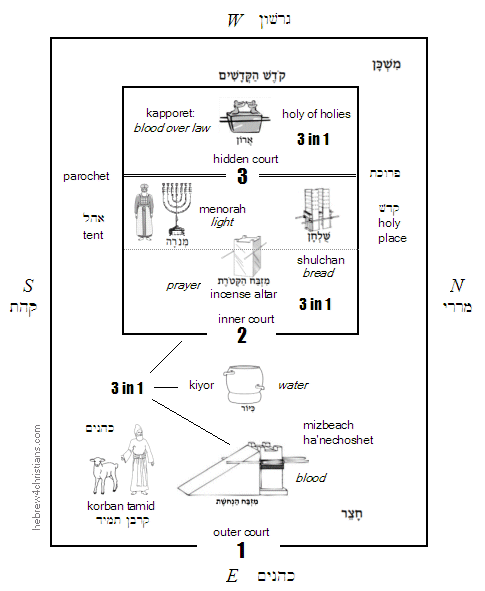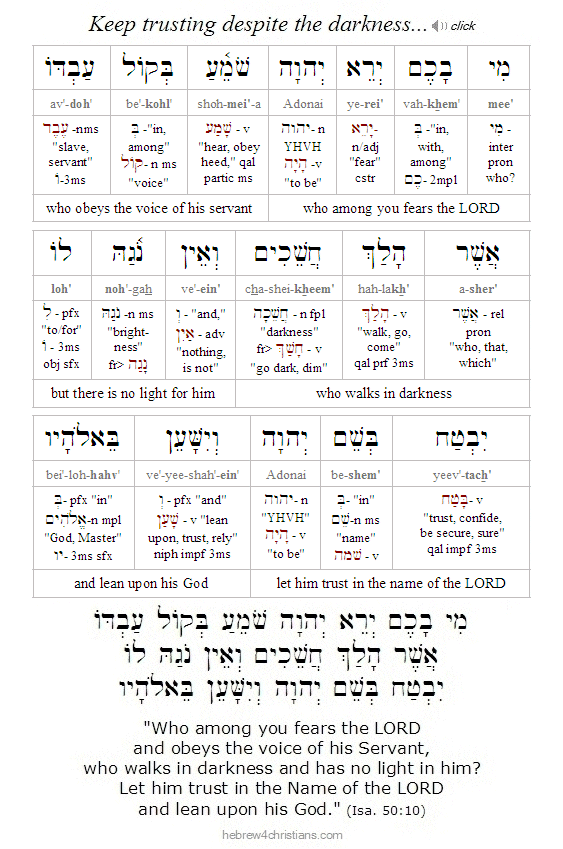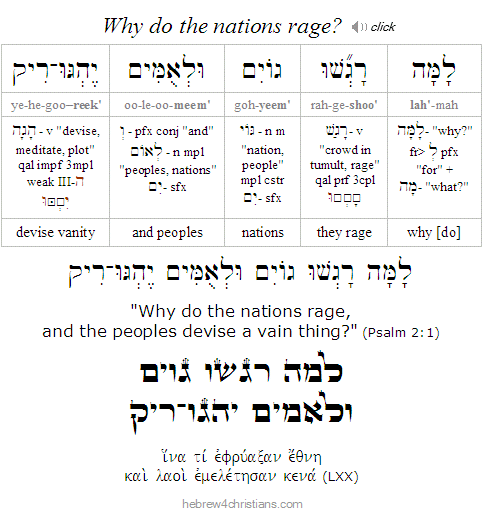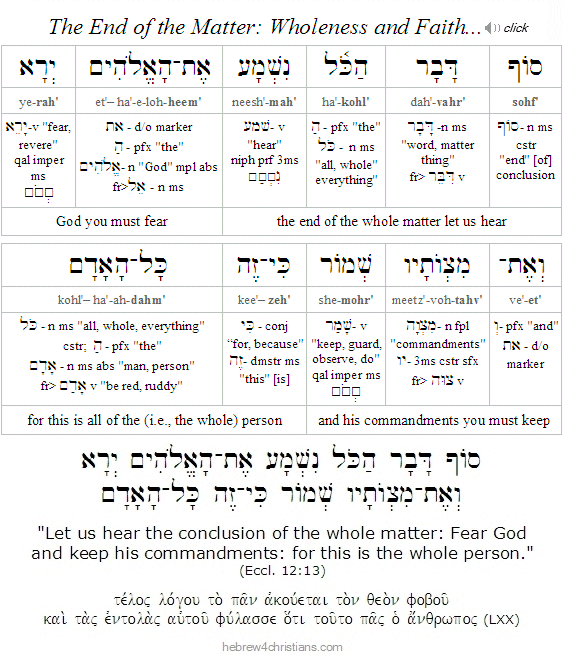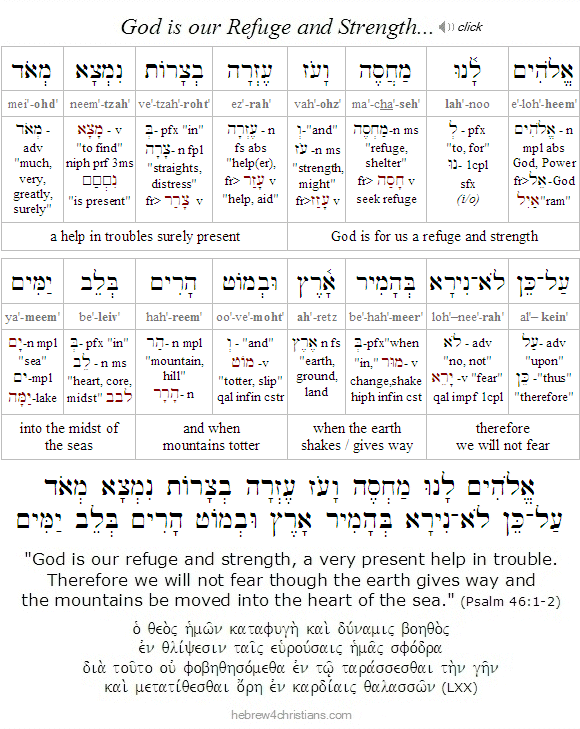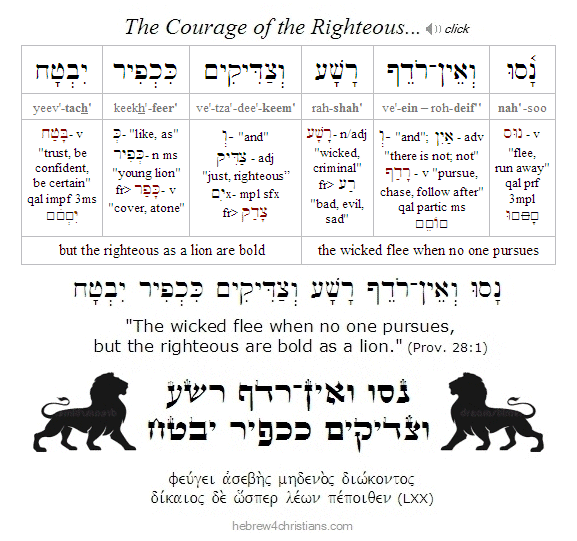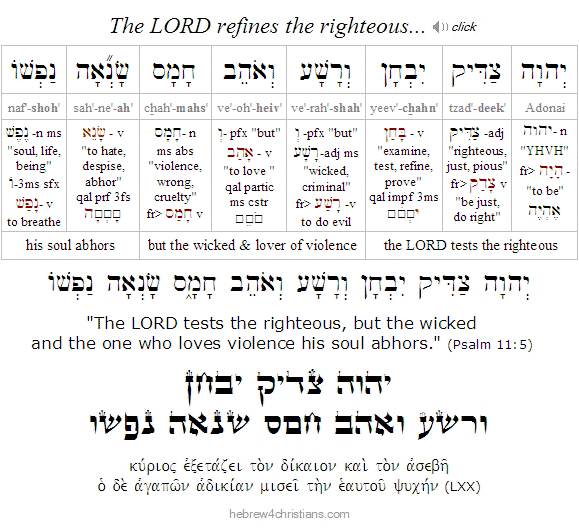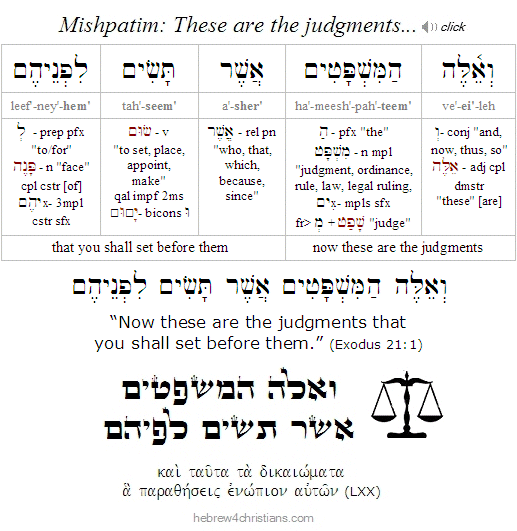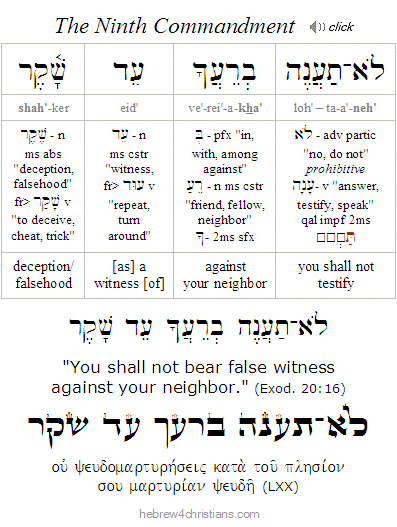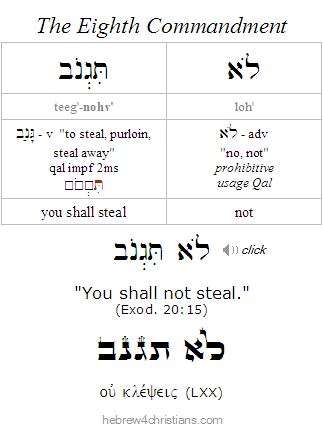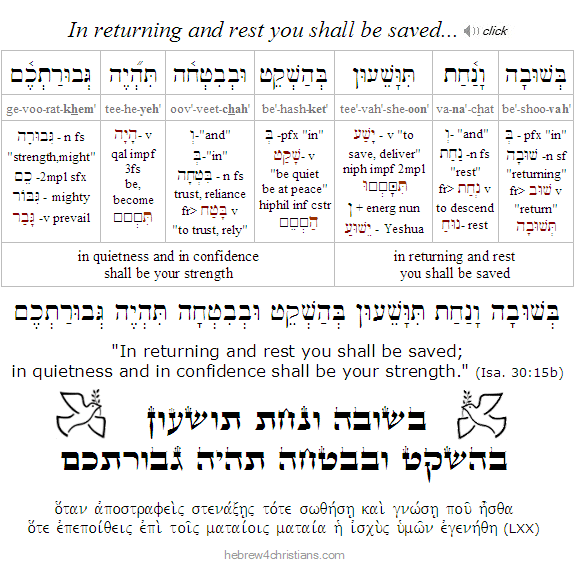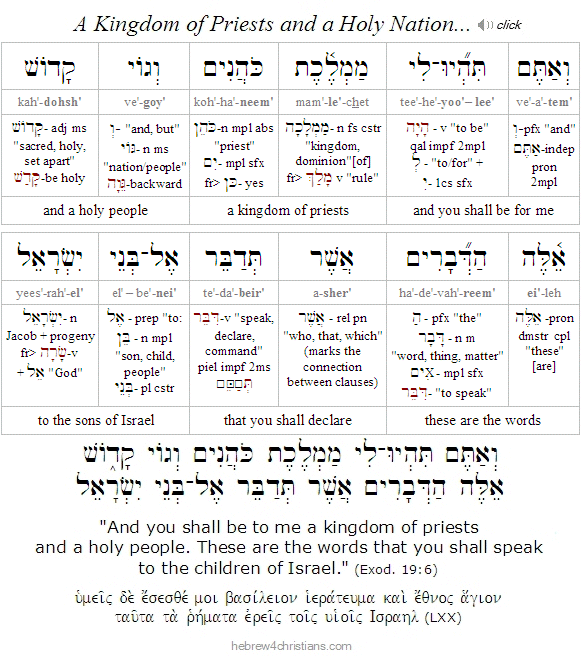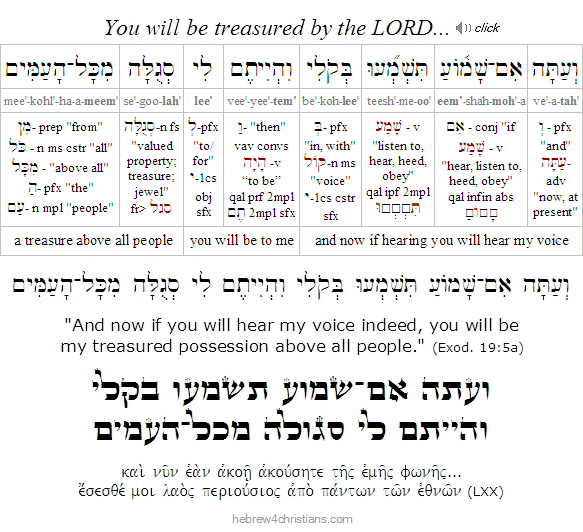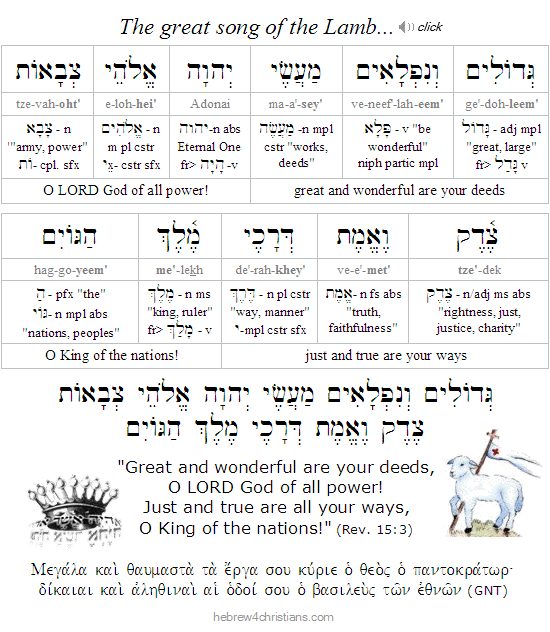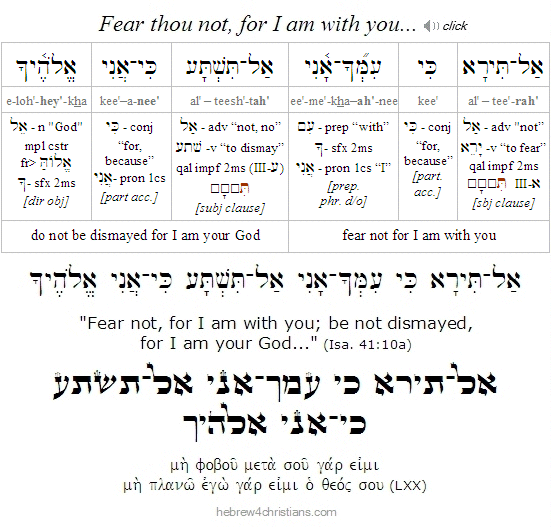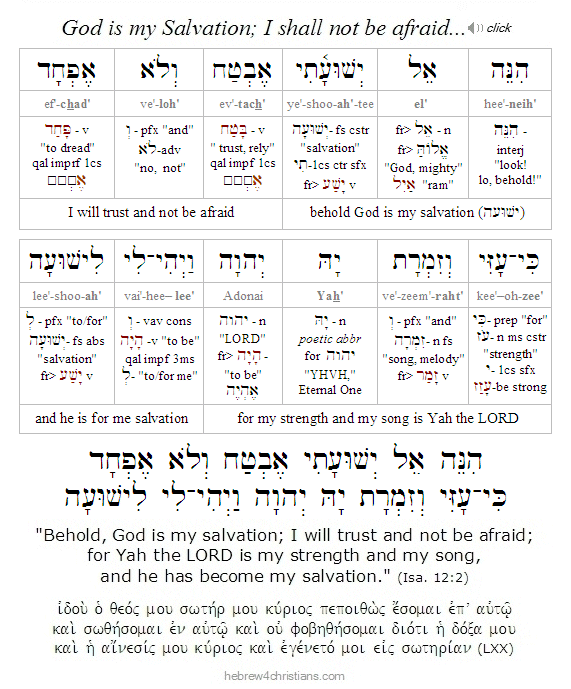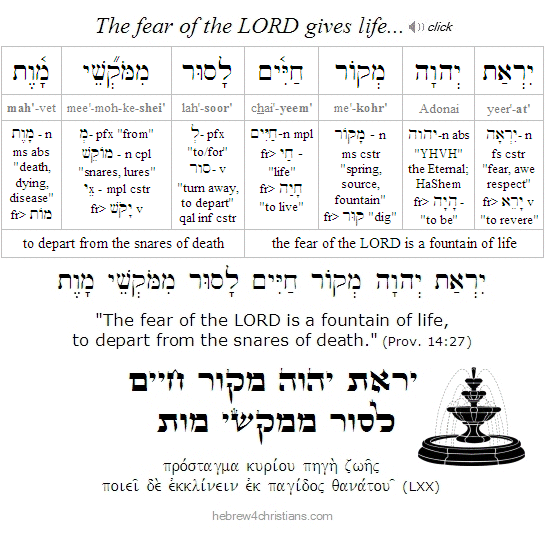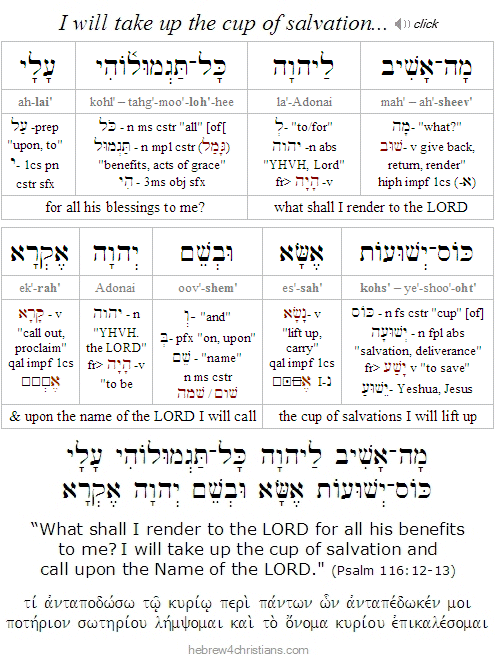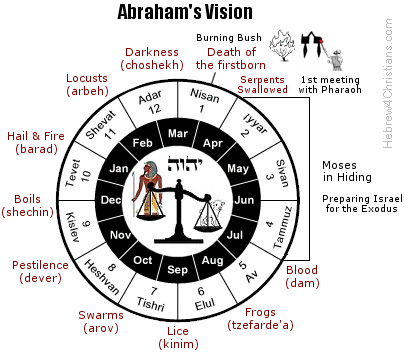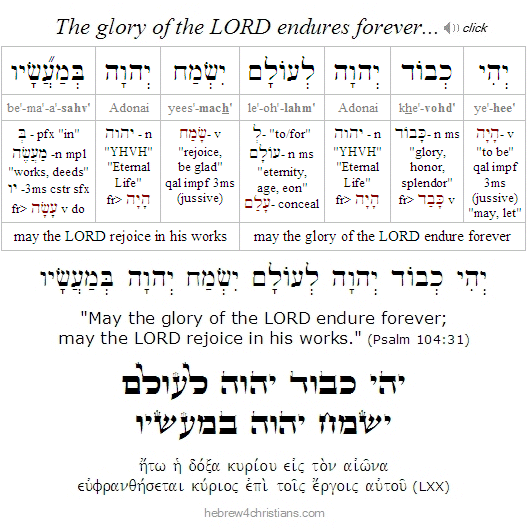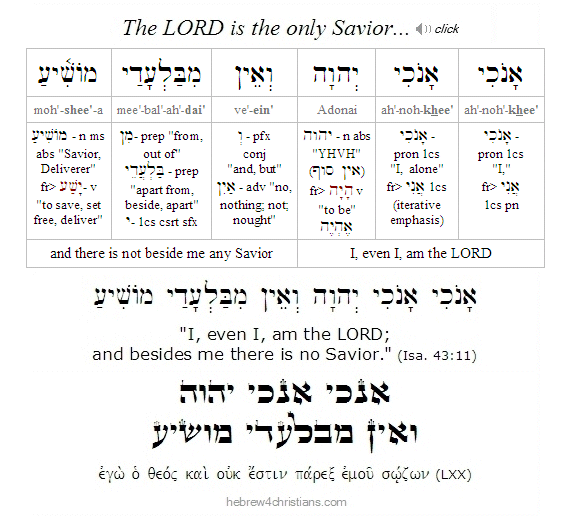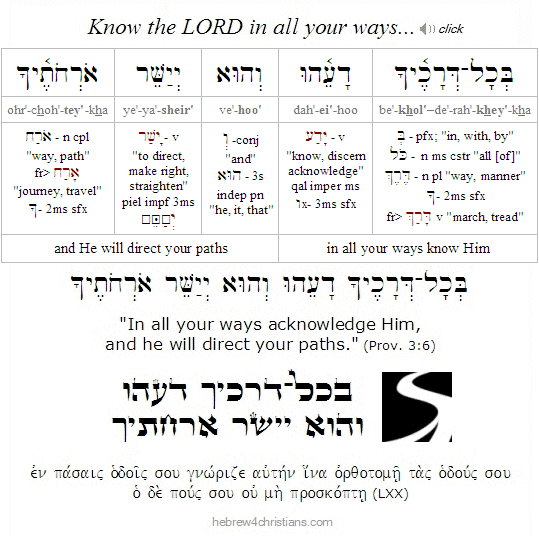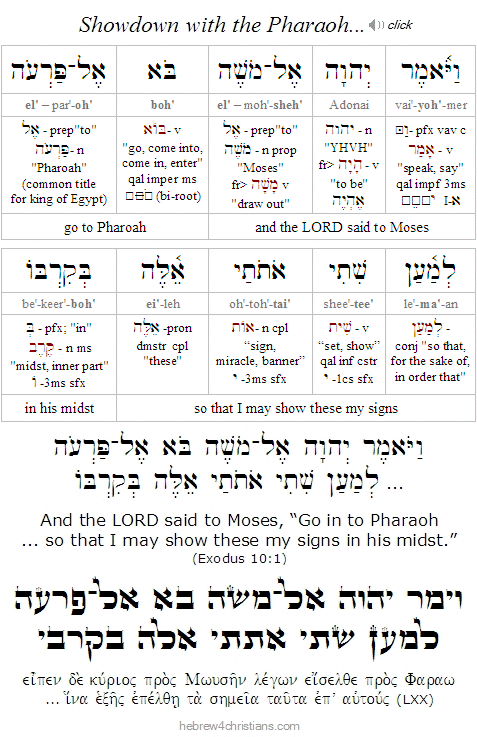|
Jewish Holiday Calendar
For January 2022 site updates, please scroll past this entry....
The winter holidays (חגי החורף) remember special times when God acted on behalf of His people so that they would triumph over their enemies, and therefore they prophetically picture the final victory in the world to come.
The Winter Holidays:
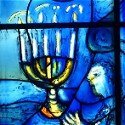
Note that in accordance with tradition, the following holiday dates begin at sundown:
- Month of Tevet (Fri., Dec. 3rd [eve] - Sun. Jan. 2nd [day])
- Month of Shevat (Sun. Jan. 2nd [eve] - Mon. Jan. 31st [day])
- Month of Adar I (Mon. Jan. 31st [eve]) - Wed. March 2nd [day])
- Month of Adar II (Wed. March 2nd [eve]) - Fri. April 1st [day])
 |
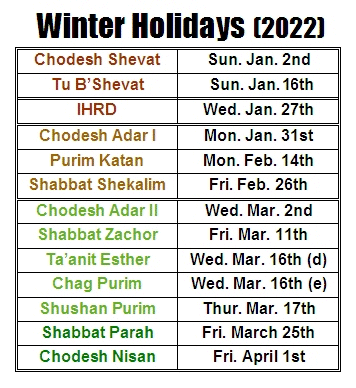 |
Note: Some calendars will list the first day of a holiday without indicating that the holiday actually begins sundown the night before. For more information see the Calendar pages...
January 2022 Updates
Note: If any page content appears to be missing, please refresh the page...
Shadows and Substance...

[ The following is related to this week's Torah reading, parashat Terumah... ]
01.31.22 (Shevat 29, 5782) The Scriptures reveal that the Mishkan (or "Tabernacle") was intended to provide an elaborate "parable" or "pattern" (i.e., tavnit: תַּבְנִית) that points to the salvation of our God (יְשׁוּעַת אֱלהֵינוּ). The Mishkan (as a whole) was intended to designate a central and sacred place (מִקְדָּשׁ) symbolizing the Divine Presence, with the tribes carefully arrayed on each side (east, west, north, and south, in cruciform), and the four families of the Levites arrayed on each side of the courtyard (Num. 2). The gate to the Mishkan opened from the east, where the tribe of Judah was positioned (Gen. 49:10) and where the Kohanim (priests) had their camp just outside the court (Heb. 7:14). See the diagram below:
The Camp Formation:
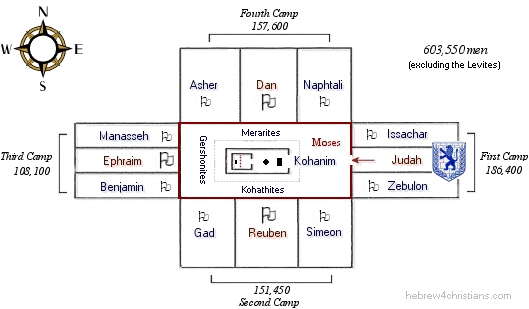 |
As you entered the Mishkan itself, you would immediately behold the mizbe'ach (i.e., copper altar), which revealed the "korban principle," namely, that the only way to draw near to God is by means of sacrificial blood offered for the sinner, as is stated in the Torah, "For the life of the flesh is in the blood, and I have given it for you on the altar to make atonement for your souls, for it is the blood that makes atonement by the life" (Lev. 17:11), and "without the shedding of blood there is no forgiveness of sins" (Heb. 9:22). In this connection note that it is God who gives us the blood for atonement, and indeed the central (and ongoing) sacrifice on the altar was the daily offering of a defect-free male lamb along with unleavened bread and wine called "korban tamid" (קָרְבַּן תָּמִיד).
The Pattern of the Mishkan:
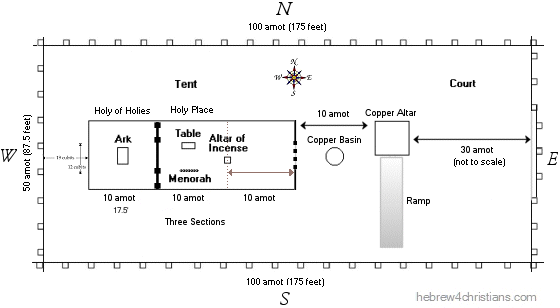 |
The korban tamid commemorates the Lamb of God and the deeper meaning of the Passover, which the LORD called "my Offering, my Bread" (see Num. 28:1-8). Note further that the sacrifice of the lamb upon the altar was openly displayed in the courtyard, just as the cross of Messiah was a public display (John 19:16; Col. 2:14-15), though the atonement for sin was made only after the High Priest sprinkled sacrificial blood upon the covering of the Ark of the Covenant that held the testimony of the law during the Yom Kippur service. Unlike the public sacrifice of the lamb upon the altar, the Yom Kippur ritual pictures the "hidden offering" of the blood before the Throne of God in the holy of holies "made without hands," that is, the greater priesthood of the Messiah who secures for us an eternal atonement (Heb. 10).
Therefore understand that the Mishkan (and later the Temple) was a provisional pattern designed by God to foretell the Substance and Reality to come, as it is written: "the Word became flesh and tabernacled with us" (John 1:14), and "when our Messiah appeared as the high priest of the good things that have come, He passed through the greater and more perfect Mishkan not made with hands (τῆς μείζονος καὶ τελειοτέρας σκηνῆς οὐ χειροποιήτου), that is, not of this creation, and entered once for all into the most holy place not by the blood of goats and calves but by his own blood, and so he himself secured eternal redemption for us" (Heb. 9:11-12).
Note that the High Priest was required to perform the Yom Kippur avodah (service) alone, while wearing humble attire, divested of his glory, and in complete solitude: "No one may be in the tent of meeting from the time he enters to make atonement in the Holy Place until he comes out" (Lev. 16:17). The Hebrew text literally says, "no adam (אָדָם) shall be in the tent," which suggests that something more than the natural man is needed for divine intercession. And just as Moses alone approached God in the thick clouds at Sinai to receive the revelation of the Altar as mediator of the older covenant (Exod. 24:15), so Yeshua, the Mediator of the New Covenant, went through his severest agony on the cross as the darkness covered the earth (Luke 23:44; Matt. 27:45).
Hebrew Lesson
Exodus 25:40 Hebrew reading:
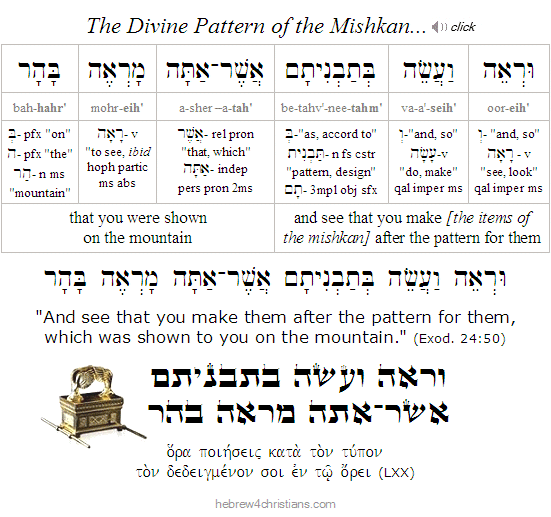 |
Shrine of the Heart...

[ The following is related to our Torah reading this week, parashat Terumah... ]
01.31.22 (Shevat 29, 5782) The sages have said that salvation may be likened to spiritual rebirth that delivers us from the "narrow places of Egypt" (i.e., from mitzrayim: -מ, "from," and צַר, "narrow") into newness of life... The first step of lasting deliverance (יְשׁוּעָה) is to receive the great revelation: "I AM the Lord your God," which begins our healing process (Exod. 20:2). We are set free from our bonds to surface appearances when we are made fully conscious of God's Presence, since we then understand everything in holy relationship with Ultimate Reality, the Ground and Source of all life (Acts 17:28). As it says in our Scriptures: "We look not to the things that are seen but to the things that are unseen: For the things that are seen are transient, but the things that are unseen are eternal" (2 Cor. 4:18). Therefore God says in our Torah, "Make for me a sacred place (מִקְדָּשׁ) so I can dwell within you" (Exod. 25:8). Each of us is created to be "mikdash me'at" that is, a sacred place for God (1 Cor. 3:16; 1 Cor. 6:19). Making a sanctuary of the heart means choosing to stay connected with reality, attuning the heart to hear the Voice of the Spirit, and consciously walking before the Divine Presence.
Hebrew Lesson
Psalm 16:8 Hebrew reading lesson:
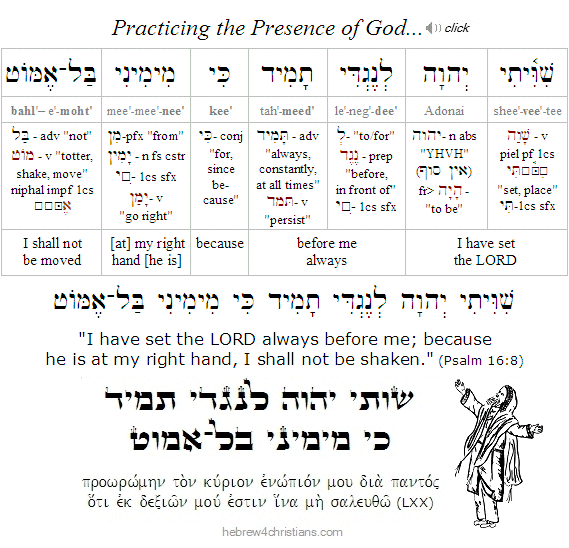 |
The Hebrew word terumah (תּרוּמָה), the name of our Torah portion, means "gift" or "contribution," which first of all refers to the decision to give of our hearts to enshrine God's Presence. We "set the LORD always before us"; we abide in the Vine and remain connected to Him (Psalm 16:8; John 15:5). It two-way partnership: we make a sacred place for God within our heart, we invite his Presence, so to speak, to dwell within us, and then we listen for God's invitation to abide within his house and live as his beloved child (Rev. 3:20).
King David wrote, עוֹלָם חֶסֶד יִבָּנֶה / olam chesed yibaneh: "The (eternal) world is built with love" (Psalm 89:2), and so indeed is God's place within our hearts... We make God lovely and beautiful and wonderful and precious to us; we enshrine him and lift up our souls unto him in adoration and thanks. When we are willing to take part in the building of the sanctuary, God reveals to us "the pattern," that is, the inspiration that evidences His presence in our lives. As Yeshua said, "Let your light so shine" (Matt. 5:16).
 |
Blessing for the Thirsting...

[ The following is related to our Torah reading this week, parashat Terumah... ]
01.31.22 (Shevat 29, 5782) Our Torah reading for this week is about "making space" for God in our lives... We read God's appeal: "Let them make for me a sanctuary (i.e., mikdash: מִקְדָּשׁ) that I may dwell in their midst" (Exod. 25:8). Each of us has an inner void, a place where only God belongs. Substituting the values of this world – money, power, fame, entertainment, pleasure (or even just a sense of personal security) – never satisfies our deepest hunger and thirst for life. Indeed the Lord laments: "My people have committed a double wrong: they have rejected me, the fountain of life-giving water (מְקוֹר מַיִם חַיִּים), and they have dug cisterns for themselves, broken cisterns that can hold no water" (Jer. 2:13). God is found by the thirsty soul; he is revealed wherever the heart permits him to speak. As Yeshua said: "If you had known the gift of God, and the one speaking to you, you would have asked him, and he would have given you living water" (John 4:10). Ask Him today.
Hebrew Lesson
Exodus 25:8 Hebrew reading:
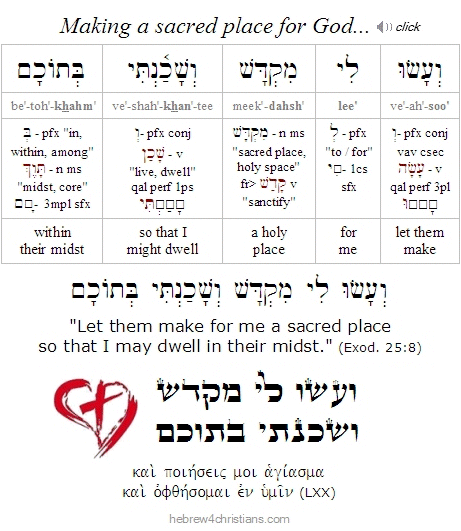 |
Parashat Terumah:
Enshrining God's Presence

[ The Kotzker Rebbe said that the verse, "this is my God, and I will praise him, my father's God, and I will exalt Him" (Exod. 15:2), may be understood as, "this is my God, and I will make a dwelling for Him within me..." ]
01.30.22 (Shevat 28, 5782) Last week's Torah reading (i.e., Mishpatim) explained how the Israelites entered into covenant with the LORD at Mount Sinai. The terms of the covenant were written down in Sefer HaBrit ("the Book of the Covenant"), which contained a variety of laws to specifically govern the Jewish people in the Promised Land. When the people agreed to obey the terms of the covenant, Moses took sacrificial blood and sprinkled it on them saying, "Behold the blood of the covenant that the LORD has made with you in accordance with all these words" (Heb. 9:18). Moses then re-ascended the mount to receive the tablets of stone inscribed with the Ten Commandments and to learn additional Torah from the LORD.
Now the goal of the Sinai revelation was not only the giving of the Ten Commandments to the Israelites but more importantly enshrining the Divine Presence within their hearts... Therefore in our Torah portion for this week (i.e., Parashat Terumah), we read how God asked the people to offer "gifts from the heart" to create a "place" for Him: "Let them make for me a holy place that I may dwell in their midst" (Exod. 25:8). The Hebrew word for "holy place"is mikdash (מִקְדָּשׁ), which comes from the root word kadash (קָדַשׁ), "to be set apart as sacred." A mikdash is therefore a "set apart space," or a "holy place" that represents something profoundly treasured - a place of beauty and worship, a refuge, a place of rest. Other words that share this root idea include kedushah (holiness), kiddushin (betrothal), kaddish (sanctification), kiddush (marking sacred time), and so on. When God said, "Let them make for me a mikdash," then, he was inviting the people to make a symbolic sacred place for His Presence to be manifest, the Holy of Holies representing God's Presence and Throne...
The LORD then showed Moses the three-in-one pattern (i.e., tavnit: תַּבְנִית) according to which the sacred place of the mikdash was to be surrounded by a mishkan (מִשְׁכָּן), or a tent-like dwelling place set apart for the Divine Presence. First an ark of acacia wood was to be overlaid with pure gold inside and out. The ark was to be fitted with gold rings and gold covered poles to make it portable. The two tablets of the law were to be stored inside the ark. Two cherubim (angel-like figures) were to placed facing each other over a cover of the ark called the kapporet (i.e., "Mercy Seat"). The ark was to be housed within an inner chamber of the tent called the Holy of Holies. Adjacent to the Holy of Holies was a second chamber called the Holy Place. This chamber would contain a table overlaid with pure gold that held twelve loaves of bread along with a golden, seven-branched menorah. The Holy of Holies was separated from the Holy Place by an ornamental veil called the "parochet."
The various "materials" required to make the mishkan (and mikdash), namely, the gold, silver, brass, red and purple yarns, fine linens, oils, spices, precious stones, and so on, were to be supplied from the people by means of free-will offerings given to honor the LORD. Collectively these offerings were referred to as terumot (תְּרוּמוֹת), meaning consecrated "donations" or "contributions" (from the verb רוּם meaning to raise or lift up) though later the word generally referred to various tithes given to the priests.
Hebrew Lesson
Exodus 25:2a Hebrew reading:
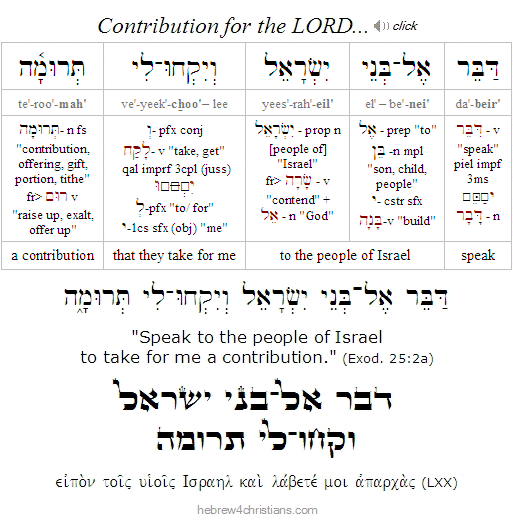 |
The design (or pattern) of the the Mishkan along with its exact dimensions was then given. The tent was intended to be portable, with a wooden frame covered by richly colored fabric and the hide of rams and goats. The outer courtyard was to include a sacrificial altar with horns of copper set at each corner. The portion ends with a description of the outer court, which was to be entirely enclosed by an ornamental fence made with fine linen on silver poles with hooks of silver and sockets of brass.
Structure of the Mishkan
Living in Yeshua's Heart...
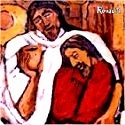
01.28.22 (Shevat 26, 5782) Yeshua likened His relationship with his followers in terms using the metaphor of a vine and its branches: "I am the true Vine (הַגֶּפֶן הָאֲמִתִּית), and you are the branches" (see John 15:1-5). We derive our identity, life and strength from being made part of His life... The purpose of the branch is to be a conduit of the life of the vine. Vine branches by themselves are of little value, apart from the manifestation of fruit; they cannot be used for building things and otherwise are regarded as bramble (Ezek. 15:2-4). Notice further that the vine branch cannot bear good fruit while it remains on the ground: it must "climb" upward and be elevated. And if you look closely at a vine, it is often difficult to see where the vine ends and the branches begin. The life of the branch becomes "entangled" in God's love as it bears spiritual fruit from the sustenance of the True Vine (הַגֶּפֶן הָאֲמִתִּית). When we abide in, or are truly connected with, Yeshua as the Source of life, we bear the fragrance and sweet-smelling savor of heaven itself...
"I am the vine; you are the branches. Whoever abides in me and I in him, he it is that bears much fruit, for apart from me you can do nothing" (John 15:5). Note that the expression "apart from me" (χωρὶς ἐμοῦ) means being in a state of separation from Yeshua, which is likened to spiritual death... It is the death of possibility, the absence of power to yield true good to the world, and so on. This is what is meant by "you can do nothing" (οὐ δύνασθε ποιεῖν οὐδέν), that is, you can do nothing of any lasting significance or worth... There is simply no true life apart from the Savior who is the Source of divine life. May you find your life and peace in Yeshua's heart, friends. Shabbat shalom!
Hebrew Lesson
Matthew 11:28 Hebrew reading:
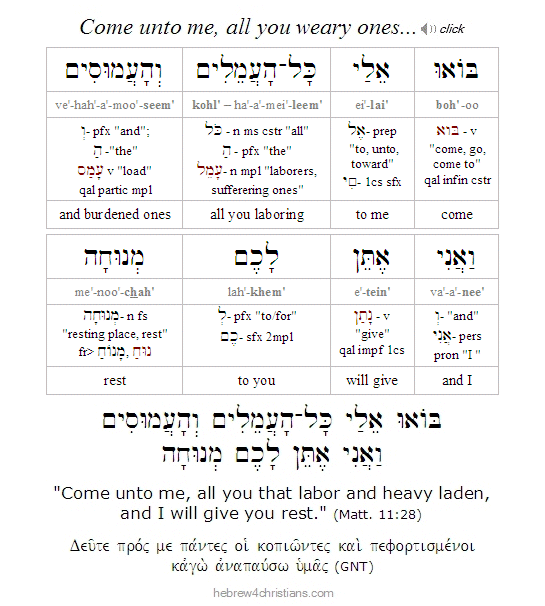 |
"Come unto me. Come unto me, you say. All right then, dear my Lord. I will try in my own absurd way. In my own absurd way I will try to come unto you, a project which is in itself by no means unabsurd. Because I do not know the time or place where you are. And if by some glad accident my feet should stumble on it, I do not know that I would know that I had stumbled on it. And even if I did know, I do not know for sure that I would find you there. And if you are there, I do not know that I would recognize you. And if I recognized you, I do not know what that would mean or even what I would like it to mean. I do not even well know who it is you summon, myself." - Frederick Buechner (Alphabet of Grace)
The Courage of Faith...

[ I had lived a life of quiet desperation and silent scream before God for many years... I was among the walking dead when he touched my lacerated heart and gave me courage to believe. ]
01.28.22 (Shevat 26, 5782) "And now abides faith, hope, love; these three" (1 Cor. 13:13). The opposite of faith is fear; of hope, despair; and of love, indifference. Fear is the "default mode" of the soul that dwells in darkness. This is because the "fallen" soul regards the empirical world and its flux as ultimately real -- and therefore "sees in order to believe." The life of faith, on the other hand, looks beyond the realm of appearances to behold an abiding glory -- and therefore "believes in order to see." How we choose to see is ultimately a spiritual decision for which we are each responsible....
In the geo-political world there are more seemingly good reasons to be afraid today than in any time since the rise of Nazi Germany in the 1930s. Every day the media indoctrinates people about threats of various kinds: plagues (e.g., the bird flu, swine flu, coronavirus and its unending variants, etc.), natural disasters, economic uncertainties, terrorist plots, and so on. In short, by choosing to engage the "culture of fear" (with its ongoing propaganda campaigns from both the right and left wing perspectives) induces a sense of dread and anxiety (as someone once said, "FEAR" is "False Education Appearing Real"). Just as a lie-detector can physiologically sense when people are telling lies, so our souls can sense when we are believing them... There is no neutral ground here, no "transcendent" place of the soul where we can rise above the realm of contrary truth claims: We will either be set free by the truth or else we will live in fear. As Yeshua said, the "Truth shall set you free."
Of course this isn't easy, and the temptation to yield to fear is ongoing. The test of our faith is of more value to the Lord than our material or emotional comfort, however, and therefore we will all experience tribulation of various kinds. This is the way we obtain heart (i.e., courage). Several years ago I wrote a Hebrew meditation ("Fear Thou Not") that reminded us that the most frequently occurring commandment in Scripture is simply al tirah (אַל־תִּירָא), "don't be afraid." If living without fear were easy, it would be of little spiritual worth, but since it requires all of our heart, soul, mind, and strength, it is therefore considered precious. Faith requires, in short, an infinite (and divinely given) passion. And it part of God's plan for us to be "in but not of" the world system, to be alienated, to be misunderstood, to be persecuted... We are called to "take up the cross" and die daily. Following Yeshua means sacrificing ourselves along the way.
Ultimately worldly fear distills to the fear of death, or rather, fear of "the one who has the power of death, namely the devil" (Heb. 2:14-15). If we come to peace with our own finitude, our own mortality, and our eventual end in the Messiah, however, then death has no more power over us. Perhaps this is part of the reason why those who sincerely live the Christian faith are so hated in communist countries or in other places of absolutist secular ideologies. If you are delivered from the greatest threat that man can menace over you, you are free to be a voice crying in the wilderness. The life of truth is something the humanist and atheist can never comprehend.
Fear is the antithesis of faith, though living without fear is certainly not easy. After all, how do we naturally choose to be unafraid of what we in fact fear? Is this power within our conscious control? Only by a miracle are we set free from fear... Indeed, true faith working within the heart is one of the greatest miracles of God. May it please God to impart to each us real courage that comes from Heaven itself... Amen.
Hebrew Lesson
Isaiah 41:10 Hebrew reading lesson:
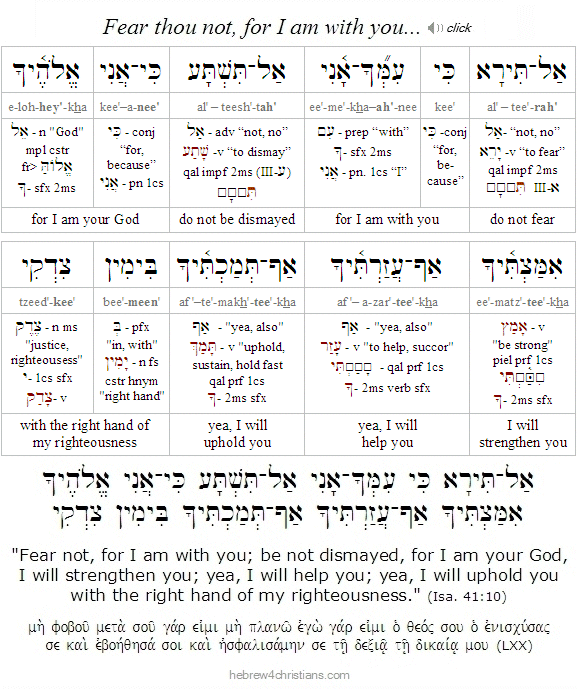 |
Revelation and Fear...
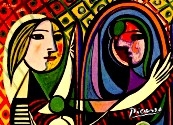
01.28.22 (Shevat 26, 5782) While the Ten Commandments were dramatically uttered amidst thunder, lightning, smoke, and the roar of the heavenly shofar, they essentially restate spiritual and moral truth intuitively known by all people (see Rom. 1:19-32). In light of this, we may wonder why God made such a terrifying presentation of principles already implanted within the souls of those he created in his image, and especially to the direct descendants of Abraham, Isaac, Jacob, Joseph, and Moses... After all, God's truth may be spoken using a "still small voice" rather than in fiery displays (1 Kings 19:12).
In reply, it may be said that while most people intuitively understand the whisper of "right and wrong," they often suppress the voice of conscience because they do not genuinely fear God, and therefore they fail to connect the significance of their choices with the Divine Lawgiver who is the Source of moral reality. They separate, in other words, the idea of transcendental "Supreme Being" (i.e., the cosmic Creator) from the Source of immanent value and meaning (i.e, the Judge of all). The First Commandment, however, reminds us: "I AM (anokhi) the LORD (YHVH) your God (Elohim)," which identifies divine power with righteousness and holiness. The drama of the revelation at Sinai was therefore intended to instill yirat haShem - the awe of God - within the heart, connecting the Supreme Power with moral truth and its implications (i.e., conscience). The Israelites drew back in fear because they realized that the Holy One was present in their private thoughts, attitudes, and motives of the heart, and this produced a sense of dread within them (Exod. 20:19). Moses reassured them, however, by saying that the surrounding terrors - which undoubtedly resembled the wonders they had witnessed in Egypt - would do them no harm if they would heed the Voice of the LORD. In other words, the terrifying glory of Sinai was meant to impart a sense of reverence and to help the people know that the LORD God is the Source of all power and glory...
Hebrew Lesson
Psalm 97:6 Hebrew reading:
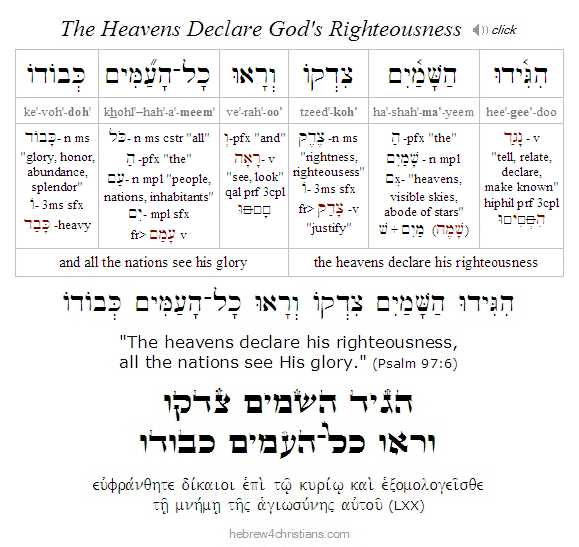 |
Smitten of Grace...
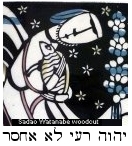
[ The most important questions probe the depths... "out of the depths I cry out..." In your struggle to understand, allow faith its space. If your conclusion leads you to obvious error (e.g., God failed me), then back up and get your thinking right about your assumptions... ]
01.28.22 (Shevat 26, 5782) The Lord is likened to a potter and we are as clay in his hand (Isa. 64:8). Life on the "potter's wheel" can be messy, unsettling, and sometimes excruciatingly hard, but it is God's sovereign work to form your life according to his design and purposes... (I am still on that wheel; it feels like a whirlwind within my anxious heart as I close my eyes, trusting His hands are somehow shaping me into his design and pleasure.)
Contrary to the assumption that the life of faith should always be triumphant, we all inevitably will experience various setbacks, pratfalls, troubles and sorrows in our lives. This does not mean that God does not care for us however, because on the contrary, this is by his design; a plan supervised by God's love and blessing, and the afflictions we therefore encounter are part of his work for our good (Rom. 8:28; Heb. 12:6). A principle of spiritual life is that we descend in order to ascend, or the "the way up is the way down." It make seem counterintuitive, but the heart of faith gives thanks for all things - the good as well as the evil (see Job 2:10). We affirm: "This too is for the good," yea, even in the midst of our struggle, no, even more -- precisely in the midst of our struggle -- for this, too, is for our good. Faith is the resolution to trust in the reality of God's goodness even during hard times when we feel abandoned or lost (Isa. 50:10). God uses the "troubles of love" (יִסּוּרֵי אַהֲבָה) for our good - to wake us up and cling to him all the more, since this is what is most essential, after all...
The difficulty of personal suffering is intensely intimate: how do you keep hope in the midst of this tension? "Lord I believe; help my unbelief" (Mark 9:24). How do you affirm that your heavenly Father will heal you but at the present hour you must endure suffering? Do you devise a "soul-building theodicy" seeking to explain your struggle – providing an answer about the "why" of your suffering – or do you attempt to sanctify suffering as a means of healing others by the grace of the Messiah (Col. 1:24)? Or do you wither in your despair? As Soren Kierkegaard said, "It is one thing to conquer in the hardship, to overcome the hardship as one overcomes an enemy, while continuing in the idea that the hardship is one's enemy; but it is more than conquering to believe that the hardship is one's friend, that it is not the opposition but the road, is not what obstructs but what develops, is not what disheartens but ennobles" (Four Upbuilding Discourses, 1844).
When Yeshua victoriously proclaimed, "It is finished" just before he died on the cross, he foreknew that his followers would experience a "purging process," a "refining fire," and time on the "potter's wheel" to perfect their sanctification. At the cross of Yeshua death itself was overcome – and all that it implies – and yet it is nevertheless true that we will suffer and die and that death persists an enemy (1 Cor. 15:26). While we celebrate the reality of the final redemption, the "instrumentality of our sanctification" needs to be willingly accepted and endured. I say "endured" here because I don't think we will ever have a complete answer to the question of "why" we undergo the various tests we face in this life. Our disposition in the midst of this ambiguity, in the midst of seemingly unanswered prayers, is where our faith is disclosed: will we despair of all temporal hope or not? Will we console ourselves with the vision of a future without tears and loss – a heaven prepared for us? Will we trust God with our pain and submit to his will, or will we "curse God and die" inside – losing hope and despairing of all remedy?
God forbid we should give up now, friends! Faith "sees the unseen" and believes that the day of our ultimate healing draws near. You are in good hands as the Lord forms your soul for the glory of his purposes... Stay strong and keep your hope alive (Psalm 27:14).
Hebrew Lesson
Isaiah 64:8 Hebrew reading:
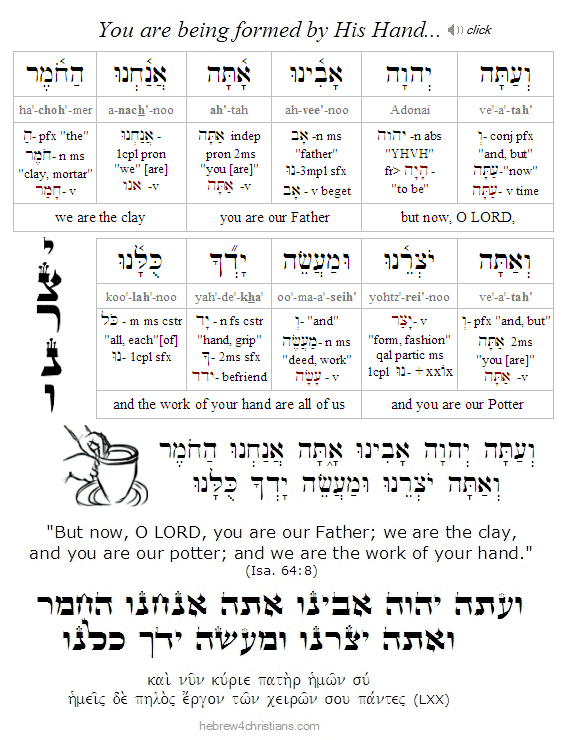 |
Believing to See...

01.28.22 (Shevat 26, 5782) Faith sees the invisible light, the truth of love that overcomes all the powers of darkness, hate, and fear. Our father Abraham closed his eyes to this world and was given the inner light of truth that would reveal his way to God. The Spirit testifies that there is "unfinished business," that there is more than meets the eye, that evil will not have the last word, and that tears will one day forever be wiped away. Despite the ambiguity of life in this world, faith "hopes against hope" that the LORD God will intervene and bring everlasting healing to us all. As it says, "Let him who walks in darkness and has no light trust in the Name of the LORD and rely on his God" (Isa. 50:10).
Hebrew Lesson:
Isa. 50:10 Hebrew reading:
Faith expresses a sort of "holy protest" over the state of the world: "How long, O LORD, forever?" (Psalm 13). Eventually God will wipe away every tear and make all things right... Bittachon (trust) is a word for this world, which says, "Though he slay me, I will trust in him..." Those who call upon the LORD can trust not only in concealed good behind ambiguous appearances ("all things work together for good") but also in a future, real, substantive good that will one day be clearly manifest for us all. Meanwhile, may God keep us from such depth of sorrow that leads to sickness, darkness and despair. Amen.
The Banality of Evil...
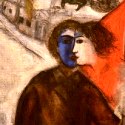
[ As it was in the days of Noah before the flood; as it was in the days of Sodom before the rain of fire fell... The Day approaches us (Matt. 23:37-39; Luke 17:28-29). ]
01.28.22 (Shevat 26, 5782) Why are people "shocked" at the unprecedented rise of crime today? What did they expect? They conspired to disavow their origins; they invented myths about a godless universe; they vehemently argued that the world is not subject to any moral and divine law. So why should the godless lament the lawlessness their souls so craved?
Our postmodern world is reaping the whirlwind of the collective apostasy against divine truth. The "Kings of the earth set themselves, and the rulers take counsel against the LORD, and against his Mashiach, saying 'Let us break their bands asunder, and cast away their cords from us.' He that sits in the heavens shall laugh: the Lord shall have them in derision. Then shall he speak to them in his wrath, and vex them in his sore displeasure" (Psalm 2:1-3). This is part of the coming judgment of God upon the world system that is now imminent...
Hebrew Lesson:
Psalm 2:1 Hebrew reading:
Prophetic Signs: Much is unprecedented in our world today... the proliferation of geopolitical conflict using weapons of mass destruction; worldwide plagues that are being leveraged to set up a global surveillance and control grid; the increase in knowledge (i.e. internet), and worldwide travel; the creation of a one-world cashless economy; the increase in famines, earthquakes, and natural disasters; the presence of the nation of Israel back in the promised land after a nearly 2,000 year exile; the existential threats against Israel from "Gog and Magog" (i.e., Iran/Syria and Russia); the ongoing apostasy of the worldwide church; the rise of false prophets and deceptive teachings; increased ethnic and racial divisions ("nation shall rise against nation"); the depraved character of men: devoid of conscience, full of violence, and contemptuous of moral and spiritual reality, etc.
Lament and Forgiveness...

[ "Faith sees best in the dark," which is to say that it closes its eyes to this world and its thinking to apprehend the truth of eternity. As it says: "We walk by faith, not by sight" (2 Cor. 5:7). ]
01.27.22 (Shevat 25, 5782) We suffer, and life hurts. Often we are afraid. And if suffering is part of God's overarching plan for creation, if it is part of the "divine idea," then how do we learn to emotionally accept it without becoming bitter? We earnestly desire the love and blessing of God, but we are shaken when terrible things happen. We are told not to be afraid, that we are not alone, but we often do feel afraid and alone in our suffering...
First we must find faith that God's decision to create us is for our blessedness rather than for evil, or minimally that it is better for us to have been created than never to have been born (Jer. 29:11). In that sense trusting God represents an affirmation of our life and its value. Whether this is the "best of all possible worlds" is an abstract question for speculative theology, but where we live, in the raw and messy struggles of life, in the midst of our joys and elations, but also in our darkness and pain, we need faith to believe that our existence has some meaning and purpose, that our lives carry some significance, and that not everything is hevel havalim, "vanity of vanities." Asking whether it would have been better had you never been born is not a trivial question, then, and indeed the ancient Hebrew prophets Job, Solomon, Jeremiah, and Jonah each wrestled with it in the course of their lives (Eccl. 4:1-3; Job 3:1-3; 10:19; Jer. 20:14; Jonah 4:3).
The sages asked whether we can ever be justifiably angry at God, and they answer that surely we can, because otherwise we could never love Him "bekhol levavkha," with all our heart (Deut. 6:5). Indeed, how can we claim to love God if we withhold the truth, lie to ourselves, and attempt to hide who we really are from Him? If you are angry at God, he already knows, so why the pretense? Being angry with God is part of being a real person in a real relationship with Him, and allowing yourself to express the truth of your heart to him is a sign of trust... Forgiving God means letting go of your grudges over matters infinitely beyond your control. We need God to even know that we need God...
Rightly (and sympathetically) understood, when we "forgive God" we are confessing our own ignorance about what is happening to us while allowing our hearts to give voice to its pain. At bottom, suffering is a type of grieving, a confession of the darkness of loss. On the other hand, we can find healing through the grieving process. Over time we learn that by "forgiving God" we are able to forgive ourselves, and we are then released from the pain that withholds us from love and blessing in our lives.
Frederick Buechner reminds the heart of faith: "The worst isn't the last thing about the world. It's the next to the last thing. The last thing is the best. It's the power from on high that comes down into the world, that wells up from the rock-bottom worst of the world like a hidden spring. Can you believe it? The last, best thing is the laughing deep in the hearts of the saints, sometimes our hearts even. Yes. You are terribly loved and forgiven. Yes. You are healed. All is well." For more on this topic see the article: "Angry at God..."
Hebrew Lesson:
Psalm 62:8 Hebrew reading:
You shall be holy to Me...
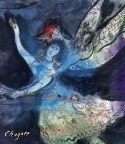
[ The following is related to this week's Torah reading (Mishpatim). ]
01.27.22 (Shevat 25, 5782) "You shall be holy to me" (Exod. 19:6; 22:31). That is, you shall be "set apart" to know and live in God's love; you shall dwell in the secret place of the Most High, a place prepared especially for you (Psalm 91:1; John 14:2). Properly understood, holiness (קְדֻשָּׁה) expresses the realm of being loved, cared for, and watched over. It is an intimacy that is exclusively hallowed and made sacred. God calls you to his closed off chamber, the "holy of holies" where He dwells; there he invites you in, he welcomes you, he desires to see you (Heb. 4:16). The deeper meaning of holiness is to be spiritually intimate with God. Hence the Spirit of Holiness uses romantic and even sexual imagery in the Song of Songs to express the deepest yearnings we have for connection with God...
Hebrew Lesson:
Lev. 11:45b Hebrew reading:
The Honor of Humility...

[ "You do not just live in a world but a world lives in you." - Frederick Buechner ]
01.27.22 (Shevat 25, 5782) God created Adam alone, as a solitary being, made in the divine image, to teach us that to destroy a single life is to destroy an entire world, and to sustain a single life is to sustain an entire world. Therefore everyone should say: 'For my sake the world was created.' Each of us is olam katan (עולם קטן), a small world that represents the large world. Indeed, one righteous person can sustain the entire world, as it is written (Prov. 10:25), "the righteous is the foundation of the world" (וְצַדִּיק יְסוֹד עוֹלָם).
On the other hand, balance is of course required here. Each of us is olam katan, a small world, though, as Rabbi Noah of Lekhivitz once wisely said, "if we are small in our own eyes, we are indeed 'a world,' but if we are a 'world' in our own eyes, we are thereby made small." This thought obviously echoes Yeshua's teaching: "Whoever exalts himself will be humbled, and whoever humbles himself will be exalted" (Matt. 23:12).
Hebrew Lesson:
Prov. 29:23 Hebrew reading:
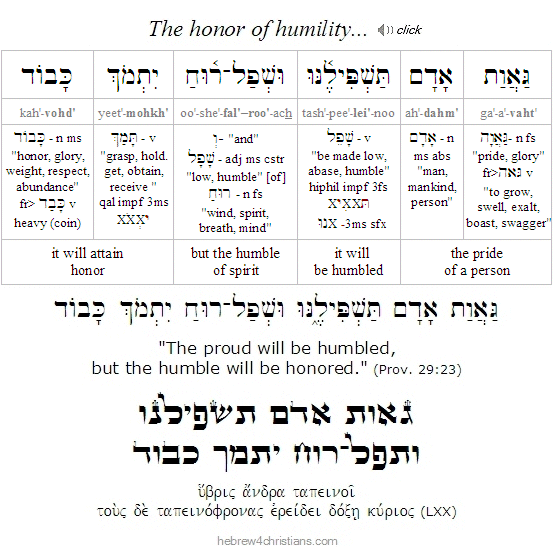 |
There are assumptions we bring to the reading of Scripture that affect how we will read and what we will hear... The sages generally agreed that the greatest principle of Torah is to love your neighbor as yourself (Lev. 19:18), though Ben Azzai further said that even greater is the principle that God created man in His likeness (i.e., bid'mut Elohim, בִּדְמוּת אֱלֹהִים, in "outline" or "silhouette," the word demut [דְּמוּת] a synonym of tzelem [צֶלֶם], a "shadow" or semblance), since then one cannot say, 'Since I despise myself I can despise another as well; since I curse myself, let the other be accursed as well.' Being made in God's likeness means how we regard ourselves and others will be the measure we regard God Himself (1 John 4:20). Therefore the first commandment is always, "I am the LORD thy God" (Exod. 20:2), since apart from faith, there is no Torah of any kind.
Eleazar HaKappar used to say: "The born will die, the dead will come to life, and the living will be judged so that men may know and make known and understand that He is God, He is the maker, He is the creator, He is the discerner, He is the judge, He is the witness, He is the complainant, and it is He who will in the future judge, blessed be He, in whose presence is neither guile nor forgetfulness nor respect of persons nor taking of bribes; for all is His. And know that everything is according to the reckoning. And let not your evil nature assure you that the grave will be your refuge: for against your will were you created, against your will were you born, against your will do you live, against your will will you die, and against your will will you stand in judgment before the King of kings, the Holy One, blessed be He." (Mishnah Pirkei Avot 4:29)
Hebrew Lesson:
Eccl. 12:13 Hebrew reading:
No Fear in Love...

01.27.22 (Shevat 25, 5782) This week's Torah reading (i.e., parashat Mishpatim) concerns various social and civil laws of ancient Israel. Regarding the opening statement of the portion: "And these are the judgments (הַמִּשְׁפָּטִים) which you shall set before them" (Exod. 21:1), the sages state that this means there must be the recognition of basic social obligation between man and his fellow man before the obligation between man and God can be affirmed (see Matt. 5:23-24). This foundational idea may be summed up as, "respect precedes Torah" (דרך ארץ קדמה לתורה), since without any form of brotherhood, unity, or basic civility, we are left with anarchy, anomie, and despair...
As we move closer to the prophesied "End of Days" (אַחֲרִית הַיָּמִים), the world is becoming more and more a place of anarchy, anomie, and despair. Civil law is flouted and every person does "what is right in his own eyes." The storm clouds are gathering, chaverim....
Nonetheless Scripture admonishes us: "There is no fear in love, but perfect love casts out fear" (1 John 4:18). Fear and faith are antithetical, but if you're anything like me, you struggle with fear. The Greek New Testament says that "perfected love" (ἡ τελεία ἀγάπη) "casts out fear" since it is rooted in the idea of punishment (κόλασις). The verse goes on to say that the one who keeps fearing has not been brought to maturity with regard to love.
My fears often center on the future, for example, regarding the matters of providing for my family, being a good parent, husband, etc. The prospect of the "End of Days" makes me more than a little concerned about the moral and spiritual condition of this country. I sometimes find myself anxiously thinking of my childrens' future. Regardless, there is one thing we can (and must) do to fortify ourselves in these perilous times, and that is to renew our faith and to reaffirm our convictions. "When in the dark night of suffering worldly wisdom cannot see a handbreadth ahead of it, then faith can see God, since faith sees best in the dark" (Soren Kierkegaard). "Faith sees best in the dark," which is to say that it closes its eyes to this world and its thinking to apprehend the truth of eternity. As it is written: "For we walk by faith, not by sight" (2 Cor. 5:7). If you feel tempted to surrender to the despair of worldly thinking, redouble your efforts to study the Scriptures and hold to the truth that sets you free. Make time to study the Torah and the words of Yeshua our Savior!
Hebrew Lesson:
Psalm 46:1-2 Hebrew reading:
The Fight of your Life...

[ "The question is not, 'To be or not to be,' it is what we should be until we are not..."
- Soren Aabye Kierkegaard ]
01.26.22 (Shevat 24, 5782) Shalom friends. Because we are in the midst of a raging spiritual war, it is imperative to gird your mind and heart with the truth (John 17:17). Keep yourself armed for the battle and be aware of the common strategies of the enemy of your soul (2 Cor. 2:11). Trust in God's power to deliver you from evil (1 Cor. 10:13). Be resolute in your convictions, refusing to yield to worldly pressures to compromise your faith in the name of supposed "tolerance." It is not loving to suppress the truth of Yeshua or to minimize the truth claims of our Messiah's vision of reality.
Fight the good fight of faith, and take hold of those spiritual weapons that are "mighty through God to the pulling down of strongholds" (2 Cor. 10:4). Always be ready to yield every thought to the obedience of your LORD (2 Cor. 10:4). Know that this is the fight for your life, friend. The Prince of Peace (שַׂר־שָׁלוֹם) came to make peace between God and sinners through his sacrificial blood, but he did so by means of a terrible conflict with the powers of darkness, and his message still offends those enslaved by pride and fear...
The devil provides weapons for those in his service, namely violence, the lies of darkness, the impudence of pride, and the vain seductions of this world, and therefore it behooves us to avail ourselves of the weapons of faith received by the agency of the Spirit of God (Eph. 6:11-18). Be sober and vigilant because your adversary (ἀντίδικος) prowls about like a roaring lion, seeking someone to devour. Resist him, firm in your faith, knowing that the same experiences of suffering are being accomplished by your brethren who are in the world" (1 Pet. 5:7-8). Yield yourself to God, resist the the wicked one will flee from you (James 4:7). The end of all things draws near: stay awake and call upon the Name of the LORD.
Hebrew Lesson:
Proverbs 28:1 Hebrew reading:
The Testings of Life...

[ "If our pain doesn't destroy us, it just might transform us into truly human beings at last."- Frederick Buechner ]
01.26.22 (Shevat 24, 5782) Why do we exist? What's the purpose of our lives? Most people of faith will answer, "the purpose of life is to know God and to love Him forever," and yet this is merely an academic answer until it is spoken from a heart that has been tested. In other words, we can only genuinely know and love God through the purifying struggle of testing...
The life of faith is education for eternity... "This world is like a corridor before the World to Come; prepare yourself in the corridor, that you may enter into the hall." God tests us along the way, disciplining and correcting us, so that we are no longer "two souled" but rather strong of faith, with singleness of vision and purpose.
A student once asked his rebbe: "Do we get punished for our sins in this world?" His concise response was, "Only if we are made fortunate..." The same can be said of testing: trials given to us by God are really opportunities. God "hides his face from us" so that we will seek him. "Draw near to God and He will draw near to you." The venture of seeking God creates inward strength that cannot be gained apart from the exercise of faith.
Not everyone is blessed with being tested by God. Some people are overlooked. The righteous person - the tzaddik - is always under God's scrutiny, both in order to refine his character and to bring about correction. This scrutiny is a sure sign of God's love, for God disciplines those whom he receives as his children (see Heb. 12:5-11). If we endure chastisement, we are being received as his sons.
So we are tested to confirm our identity as God's children. Purity of the heart is to will one thing, and divine testing functions as a "refining fire" that removes the dross of ambivalence from our hearts. For the righteous, the various trials of life ask a divine question addressed to the heart of faith: Do you love me? Will you trust me now - in this place? with this trouble? in this darkness? As we believe, we are given more revelation, and that, in turn, further vindicates God's faithfulness and love.
Remaining steadfast in faith is the way we express our love to God: "Happy is the one who endures testing, because when he has proven to be genuine, he will receive the crown of life (עֲטֶרֶת הַחַיִּים) that God promised to those who love him" (James 1:12). The "tested genuineness of your faith" is precious to God and will bring praise and glory and honor when the Messiah's righteousness is vindicated upon the earth (1 Pet. 1:7).
So remember that God sends us trials so we might turn to Him for help... As Yitzchok Hutner once wisely said, "The main purpose of tefilah (i.e., תְפִלָה, prayer) is not to get us out of problems. The purpose of problems is to get us into tefilah." Amen. May you turn to the LORD and be strengthened in all the tests that come your way, chaverim.
"The worst isn't the last thing about the world. It's the next to the last thing. The last thing is the best. It's the power from on high that comes down into the world, that wells up from the rock-bottom worst of the world like a hidden spring. Can you believe it? The last, best thing is the laughing deep in the hearts of the saints, sometimes our hearts even. Yes. You are terribly loved and forgiven. Yes. You are healed. All is well."
- Frederick Buechner
Hebrew Lesson
Psalm 11:5 Hebrew reading:
Keep the Faith (לִשְׁמוֹר אֱמוּנִים)

[ "Salvation is free, but discipleship will cost you your life." - Dietrich Bonhoeffer ]
01.25.22 (Shevat 23, 5782) When Israel believed the report of the faithless spies, Moses commented: "You were not willing to ascend (וְלא אֲבִיתֶם לַעֲלת), but became embittered (מָרָה) against the Word of the LORD your God" (Deut. 1:26). Moses' rebuke was not that the people were afraid to conquer the land as much as that they had lost heart and no longer desired to take hold of God's promise. The people gave up their dream; they forsook their hope; and they had lost the "devotion of their youth, their love as a bride, how they followed the LORD in the desert, into a land not sown" (Jer. 2:2). The people's failure was on two levels: First they lapsed in faith by abdicating trust in God's word, and second, they had lost the passion of their first love. In light of this, the sages say that the greater problem was that of losing heart, since the heart directs the will to believe in the miracle of God, or not...
Moses' rebuke of the people's heart condition recalls the sober warning Yeshua gave to the Ephesian believers: "I know your works, your toil and your patient endurance, and how you cannot bear with those who are evil, but have tested those who call themselves apostles and are not, and found them to be false. I know you are enduring patiently and bearing up for my name's sake, and you have not grown weary. But I have this against you, that you have abandoned the love you had at first. Remember therefore from where you have fallen; repent, and do the works you did at first. If not, I will come to you and remove your menorah from its place, unless you repent" (Rev. 2:2-5). Likewise the author of the Book of Hebrews commented: "And to whom did he swear that they would not enter his rest, but to those who were disobedient? And with whom was he provoked for forty years? Was it not with those who sinned, whose bodies fell in the desert? So we see that they were unable to enter because of unbelief" (Heb. 3:17-19). The question of our faith is essential: "It is a fearful thing to fall into the hands of the living God" (Heb. 10:31).
Hebrew Lesson
Psalm 119:10 Hebrew reading:
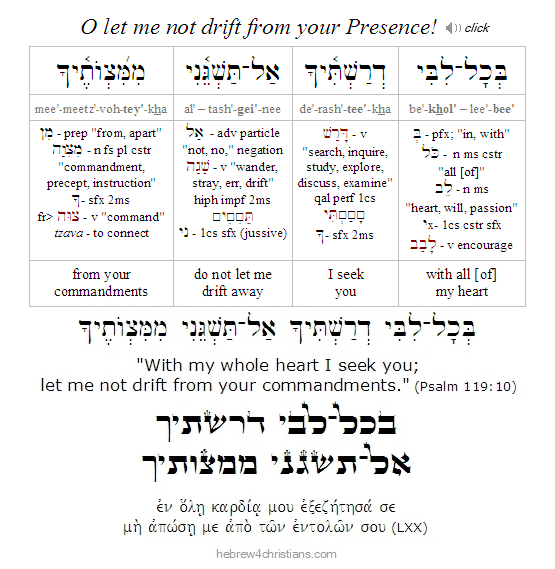 |
The Kingdom of God...

[ "God is with us!" you say, I reply, "Amen, but are you with him?" You find comfort that he knows where you hurt and he heals you of your sins, but do you know where he hurts and what wounds his heart? ]
01.25.22 (Shevat 23, 5782) Yeshua told his followers that the Kingdom of God (i.e., mamlekhet Adonai: ממלכת יהוה) is "within you" (Luke 17:21). This teaches us that the reign of the Spirit is not to be found "out there" nor is the kingdom to be regarded as a political structure of this world, but is realized in spiritual relationship - namely, the communion between the LORD God with your heart and your heart with the LORD God... When we learn to believe clearly, Yeshua says we can experience the divine Presence within our hearts and among ourselves. As we turn to God, may we recognize that who we are is more vital than our outer appearance and contingent circumstances. Life in the kingdom means having a new identity, being a new creation (בְּרִיָּה חֲדָשָׁה), and that changes everything (2 Cor. 5:16-17).
Hebrew Lesson
Psalm 45:6 Hebrew reading:
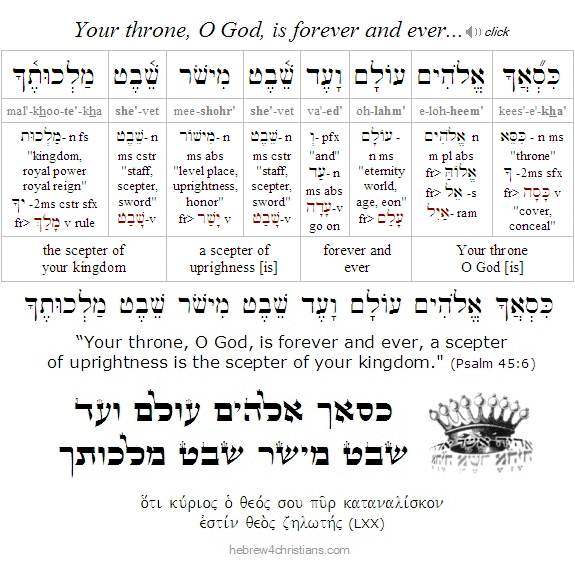 |
Jesus in Context...

01.25.22 (Shevat 23, 5782) An essential and basic principle of Bible interpretation is succinctly stated in the axiom: "a text without a context is a pretext," and therefore we must endeavor to understand the New Testament in light of the Torah, not the other way around... Without the context of Torah, the meaning and terms of the New Testament will be obscure and subject to misunderstanding. Indeed, we must remember that the Messiah was "embedded" in the Jewish culture of his day (see Gal. 4:4-5), and that he was fluent in Torah reading and study (see Luke 4:16-21; John 4:22). Moreover, Yeshua plainly said that the Jewish Scriptures testify of Him: "And beginning with Moses and all the Prophets, he interpreted (διερμηνεύω) to them in all the Scriptures the things concerning himself" (Luke 24:27; John 5:39). We study Hebrew to know Yeshua, the "Living Torah" better, as he said: "Therefore every scribe who has been trained for the kingdom of heaven is like a master of a house, who brings out of his treasure what is new and what is old" (Matt. 13:52).
בלבי צפנתי אמרתך
למען לא אחטא־לך
be·lee·bee · tza·fan'·tee · eem·rah·te'·kha
le·ma'·an · loh · e·che·tah - lakh

"In my heart I have treasured your word
so that I might not sin against you.
(Psalm 119:11)
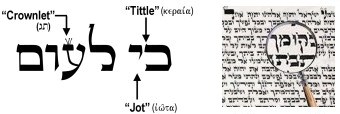
Click to listen and learn the Hebrew text:
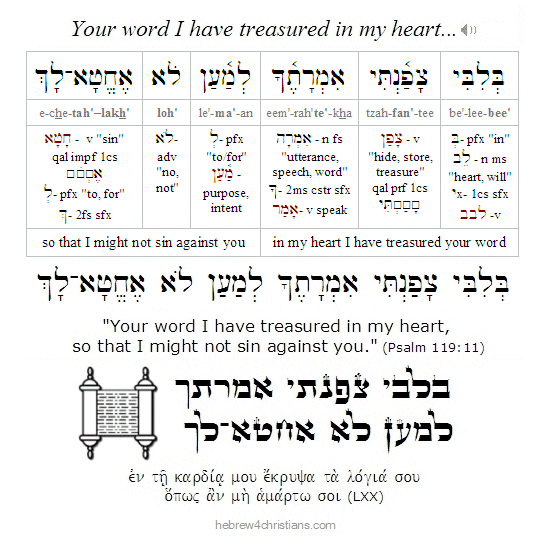
Some claim that Jesus primarily spoke Aramaic, not Hebrew. Well, consider this. If the king of the Jews was required to "make a copy of sefer Torah" (Deut. 17:18-19), then surely Yeshua, the great King of the Jews (מלך היהודים), the true Messiah of Israel, read Hebrew and understood kotzo shel yod (קוֹצוֹ שֶׁל יוֹד) - "every jot and tittle" of its meaning (see Matt. 5:17-19). Indeed, Yeshua knew the traditional Hebrew blessings, prayers, and hymns (Matt. 26:26-30); he chanted Hebrew in synagogue (Luke 4:16), and he reasoned with the Hebrew-speaking sages in Jerusalem as a young boy (Luke 2:42-27). Surely the "King of the Jews" spoke lashon hakodesh!
קַדֵּשׁ אוֹתָם בָּאֱמֶת׃ דְּבָרְךָ אֱמֶת -"Sanctify them in the truth; your word is truth." (John 17:17)
Walking Uprightly...
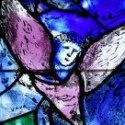
[ God often sends us trials (ניסוים) so that we might turn to Him for help... As Yitzchok Hutner once wisely said, "The main purpose of tefilah (i.e., תְפִלָה, prayer) is not to get us out of problems. The purpose of problems is to get us into tefilah." Indeed one of the worst things that can happen to a soul is to be forgotten by God, to be "let go" and no longer tested... ]
01.25.22 (Shevat 23, 5782) In our Torah portion this week (i.e., parashat Mishpatim) we read, "Keep yourselves away from a false matter" (Exod. 23:7). In this connection note that the Hebrew word for falsehood (or lie) is sheker (שֶׁקֶר), which can be rearranged to spell kesher (קֶשֶׁר), meaning a band, gang, or group of people... The power of the lie is often found in the "group" rather than in the individual, and if enough people in a group repeat something untrue, eventually the individual's conscience will be overruled and the truth will be lost... This is a common methodology regularly employed by mass media for purposes of political propaganda.
Regarding this commandment Abraham Twerski comments that it means we should act in a way that will not move us to "hide," and that includes hiding within the anonymity of the crowd. "Think about what you are about to do. Is there a possibility that you may at some time have to deny that you did it? If so, then do not do it" (Twerski on Chumash).
Each of us must individually strive to be yashar (יָשָׁר) - upright and honest, and free from the complications and devious speech that attends to lies. We are to be "simple" (תָּמִים) with the LORD our God (Deut. 18:13), which requires that we are first willing to be rigorously honest with ourselves. "No person is saved except by grace; but there is one sin that makes grace impossible, and that is dishonesty; and there is one thing God must forever and unconditionally require, and that is honesty" (Soren Kierkegaard).
An old midrash teaches that the Hebrew word for "truth" (i.e., emet: אֱמֶת) is composed of the first, middle, and last letters of the alphabet, whereas the three letters that spell "falsehood" (i.e., sheker: שֶׁקֶר) all stand next to one another. Truth creates a firm foundation, secure, strong, and trustworthy, while falsehood is unstable. As it is written, "truth stands forever, falsehood has no legs." In other words, the way of truth is "self-authenticating" and made secure, whereas the way of falsehood is "unlivewithable" and made unsteady...
Hebrew Lesson
Deut. 18:13 Hebrew reading:
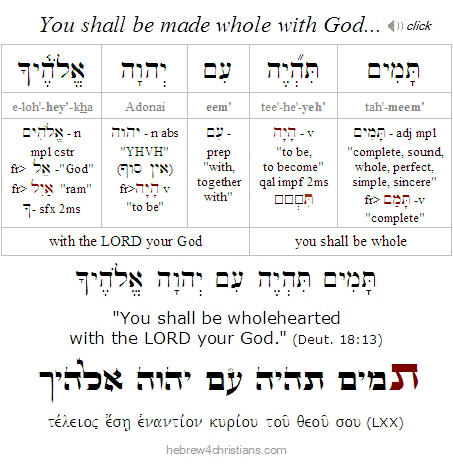 |
The Hour of Decision...

[ "He who doesn't see God everywhere isn't capable of seeing Him anywhere." - Kotzker ]
01.25.22 (Shevat 23, 5782) Shalom chaverim. The world today is a confounded mess; the real epidemic is one of godlessness combined with hubris -- a lethal combination indeed. No mask will help; no medicine from man will save. We read in our Scriptures: "You know the time, that the hour has come for you to wake from sleep. For salvation is nearer to us now than when we first believed. The night is far gone; the day is at hand. So then let us cast off the works of darkness and put on the armor of light" (Rom. 13:11-12). It's hard to offer words of encouragement other than: "Look up! For your redemption draweth nigh..."
It is written in the Mishnah (Avot:15b), "repent one day before you die," but who knows the day of one's death in advance? Therefore "seek the LORD while he may be found; call upon him when he is near" (Isa. 55:6). "In eternity you will not be asked how large a fortune you are leaving behind - the survivors ask about that. Nor will you be asked about how many battles you won, about how sagacious you were, how powerful your influence - that, after all, becomes your reputation for posterity. No, eternity will not ask about what worldly goods remain behind you, but about what riches you have gathered in heaven. It will ask you about how often you have conquered your own thought, about what control you have exercised over yourself or whether you have been a slave, about how often you have mastered yourself in self-denial or whether you have never done so" (Kierkegaard).
Just as God humbled Israel with manna in the desert, so He humbles us. "Give us this day our daily bread and deliver us..." The purpose of affliction is ultimately good and healing: God humbles us with manna, the "bread of affliction, so "that he might make you know that man does not live by bread alone, but man lives by every word that comes from the mouth of the LORD" (Deut. 8:3). In other words, God uses tzuris to lead us to do teshuvah and accept the truth. We often pray that our problems be taken away, but God sometimes ordains these very problems so that we will turn and draw near to Him... We are being weaned from this present age to be made ready for heavenly glory, for things unimaginably wonderful, soon to be revealed to you. Chazak – stay the course, friends; the hour is near.
Hebrew Lesson
Isaiah 55:6 Hebrew reading:
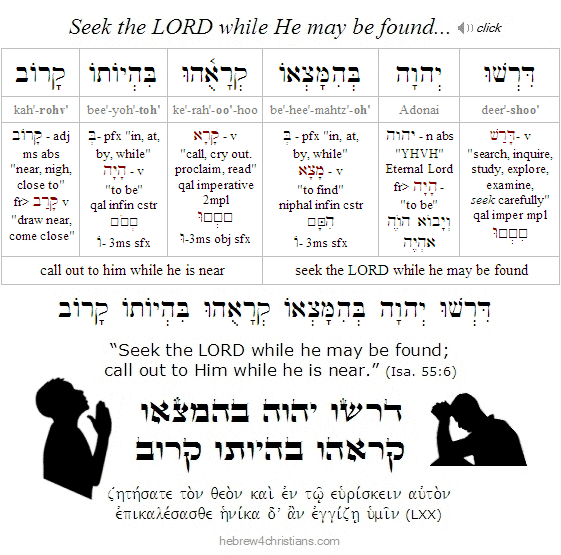 |
Do not Drift Away...

01.24.22 (Shevat 22, 5782) We are living in perilous times, and for all the more reason we must "pay more careful attention to what we have heard so that we do not drift away" (Heb. 2:1). We must be anchored to the truth lest we become shipwrecked in our faith. Drifting is often imperceptible, and occurs slowly, though the end result is as deadly as openly turning away from God in outright apostasy. As C.S. Lewis once wrote, "The safest road to hell is the gradual one - the gentle slope, soft underfoot, without sudden turnings, without milestones, without signposts." The grave danger today is to quietly and invisibly give up hope, to unconsciously "go with the flow," to become comfortably numb, to fall asleep, and therefore to die inside... It is far more dangerous to ignore God's mercy, or to make a pretense of knowing God's grace, than it is to blatantly break his law. Therefore the urgent need is to remember, to hear, and to awaken the soul to face the truth about reality. We must focus the heart, concentrate the will, and consciously "set" the Lord always before us (Psalm 16:8). Each day we must awaken from our emptiness to reaffirm the central truth: "Shema Yisrael, Adonai Eloheinu, Adonai echad; and you shall love the LORD your God with all your heart and with all your soul and with all your might" (Deut. 6:4-5). "Awake, you who sleep, Arise from the dead, And Christ will give you light" (Eph. 5:14).
We must press on to secure our high calling in Messiah: "Let us know; let us press on to know (i.e., נִרְדְּפָה, "pursue after") the LORD; His going out is sure as the dawn; He will come to us as the showers, as the spring rains that water the earth" (Hos. 6:3). May God help us pursue him be'khol levavkha - with all our heart - because He has promised, "You will seek me and find me, when you seek me with all your heart" (Jer. 29:13). And may the love of the LORD indeed be upon us, even as we put our hope in Him (Psalm 32:22).
Hebrew Lesson
Psalm 33:22 Hebrew reading:
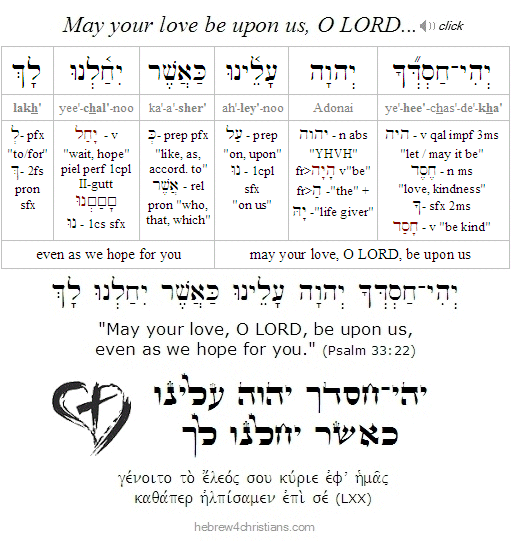 |
Being Present before God...

01.24.22 (Shevat 22, 5782) It is easy enough to hurry past words of Scripture without slowing down to reflect on what is being said. For instance, in our Torah portion for this week (i.e., Mishpatim) we read: "The LORD said to Moses, "Come up to me on the mountain and wait there, that I may give you the tablets of stone with the law and the commandment, which I have written for their instruction" (Exod. 24:12). The Hebrew words veheyei sham (וֶהְיֵה־שָׁם), usually translated as "and wait there," can also be translated as "and be there." But why -- if every jot and tittle of Torah is indeed significant (Matt. 5:18) -- does the text say "come up to the mountain" and then add the superfluous phrase "and be there"? The sages answer that God is asking Moses to be present, be awake, and to be utterly focused – "with all your heart, soul, and might." This teaches us that to receive God's revelation, we need to show up – "to be there" – earnestly seeking his heart...
Hebrew Lesson
Exodus 24:12a Hebrew reading:
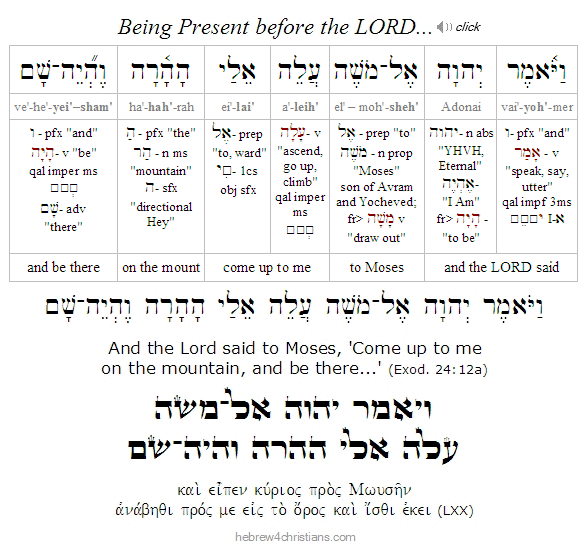 |
Glory as Consuming Fire...
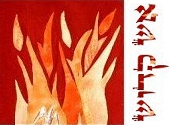
01.24.22 (Shevat 22, 5782) From our Torah portion this week (Mishpatim) we read: "Now the appearance of the glory of the LORD was like a consuming fire on the top of the mountain in the sight of the people of Israel" (Exod. 24:17). Now some people regard this fire as a threat, even a sign of God's judgment, though it is better to regard it as a sign of God's glorious passion. After all, the pillar of fire had led the people out of bondage, just as it later dwelt between the cherubim upon the Ark of the Covenant. Indeed the fire that fell upon followers of Yeshua at Pentecost was the same manifestation of the glory of God's passionate love that was revealed at Sinai. Our God is a "consuming fire" (אֵשׁ אכְלָה), which means that He is full of passion and zeal that your heart fully belongs to Him...
Hebrew Lesson
Deut. 4:24 Hebrew reading:
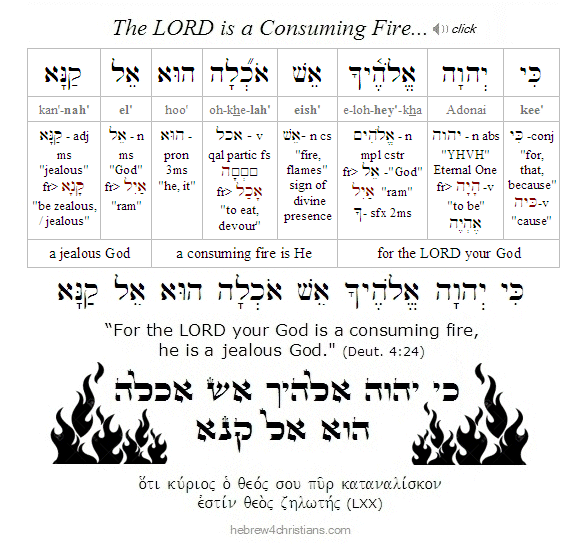 |
The metaphor that God is a Consuming Fire suggests that He is both indescribable and passionately concerned with our devotion to Him. "Therefore let us be grateful for receiving a kingdom that cannot be shaken, and thus let us offer to God acceptable worship, with reverence and awe, for our God is a consuming fire" (Heb. 12:28-29). We are promised a kingdom that cannot be shaken, wherein the Fire that consumes will consume all things that are not established by our Heavenly Father... "Know therefore today, and lay it to your heart, that the LORD is God in heaven above and on the earth beneath; there is no other. Therefore you shall keep his statutes and his commandments, which I command you today..." (Deut. 4:39-40). Our lives on the altar ascend to God in praise.
This Week's Torah:
Parashat Mishpatim...
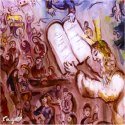
[ After God spoke the Ten Commandments to Israel, God called Moses up to Sinai again, this time for 40 days and 40 nights, to teach him the details of the commandments and how they were to be applied. The 6th section of the Book of Exodus provides a sampling of these various rules and laws (called "mishpatim" in Hebrew) that God instructed Moses during this time. ]
01.23.22 (Shevat 21, 5782) Shavuah tov, friends. Last week we read in the Torah that exactly seven weeks after the Exodus from Egypt (i.e., 49 days after the first Passover), Moses gathered the Israelites at the foot of Mount Sinai to enter into covenant with the LORD. In a dramatic display of thunder, lightning, billowing smoke and fire, the LORD descended upon the mountain and recited the Ten Commandments (or Ten Declarations) to the people. Upon hearing the awesome Voice of God, however, the people shrank back in fear and begged Moses to be their mediator before God. The people then stood far off, while Moses alone drew near to the thick darkness to receive further instructions from the LORD.
In this week's Torah reading (i.e., Mishpatim, Exod. 21:1-24:18) we learn about these additional instructions Moses received on the mountain. The Jewish sages traditionally count 53 distinct commandments in this portion of the Torah, easily making it one of the most "legalistic" (i.e., law-focused) sections of the entire Bible. Civil laws, liability laws, criminal laws, agricultural laws, financial laws, family purity laws, Sabbath laws, and holiday laws are all given in this portion. These various social and civil laws are called "mishpatim" (מִשְׁפָּטִים), the plural form of the masculine noun mishpat (מִשְׁפָּט), meaning a "judgment," "ordinance," "law" or legal ruling. The word derives from the verb shafat (שָׁפַט) meaning to judge or govern. A shofet (שׁוֹפֵט) is the Hebrew word for "judge," and the LORD is called Ha-Shofet kol ha'aretz (הֲשׁפֵט כָּל־הָאָרֶץ) -- the "Judge of all the earth" who loves justice (Gen. 18:25, 37:28, Psalm 50:6, 94:2). In this connection note that the mishpatim became the basis for the tradition application of Jewish case law as well as for halakhah. According to common Jewish tradition, mishpatim are ethical judgments (or laws) given for a clearly specified reason (i.e., logical laws), as opposed to chukkim (חֻקִּים) which are divine fiats or decrees. An example of a mishpat would be the commandment to give charity or the prohibitions against theft and murder. These mitzvot (commandments) are inherently rational since the denial of their validity would make civil life impossible.
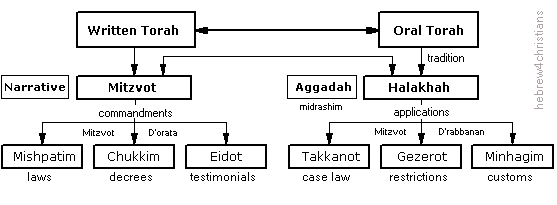 |
After receiving these additional rules, Moses descended Sinai and went before the people to reveal to them the words of the LORD. Upon hearing the details, the people responded in unison, "all the words which the LORD has said we will do" (i.e., na'aseh: נַעֲשֶׂה). Moses then wrote down the words of the covenant into a separate scroll (sefer habrit), built an altar at the foot of Sinai, and ordered sacrifices to the LORD to be made. He then took the sacrificial blood from the offerings, threw half upon the altar, and read the scroll of the covenant to the people. The people ratified the covenant by saying, "all that the LORD says we will do and obey" (i.e., na'aseh ve'nishmah: נַעֲשֶׂה וְנִשְׁמָע). Upon hearing this, Moses took the other half of the sacrificial blood and threw it on the people saying, "Behold the blood of the covenant that the LORD has made with you in accordance with all these words" (Heb. 9:18). After this ceremony, Moses, Aaron, and seventy of the elders of Israel ascended Mount Sinai to eat a "covenant affirmation meal" between Israel and the LORD.
Upon returning from the mountain with the elders, the LORD commanded Moses to go back up to receive the tablets of stone inscribed with the Ten Commandments. On the seventh day there, he heard the Voice of the LORD calling to him from the midst of the cloud of glory, and then entered into the Presence of the LORD. He remained on the mountain for a total of forty days and forty nights receiving further revelation about the Mishkan (i.e., Tabernacle) while the Israelites waited for him at the camp down below.
Hebrew Lesson
Exodus 21:1 Hebrew reading:
Hearing Abba's Voice...
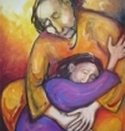
01.21.22 (Shevat 19, 5782) This week's Torah portion (i.e., Yitro) describes the revelation of the Torah at Sinai. During Shavuot (i.e., "Pentecost") we recall both this awesome event as well as the inner fire imparted by the Ruach HaKodesh that writes the Torah in our hearts (see Acts 1:7-8; 2:1-4). In light of this it is good to hear again the heart of our Heavenly Father regarding the significance of divine truth:
"Dear child of mine, do not forget my Torah (תּוֹרָתִי), but let your heart keep my commandments (מִצְוֹתַי). Doing so will add to you length of days, (ארֶךְ יָמִים), long life, and peace (שָׁלוֹם). Do not abandon the heart of Your Father by losing sight of mercy and truth (חֶסֶד וֶאֱמֶת); no! Tie them around your neck; inscribe them upon the table of your heart (לוּחַ לִבֶּךָ), that is, make them part of your inner being and will. Doing so will reveal my grace (חֵן) and good understanding (שֵׂכֶל־טוֹב) before the eyes of God and others. Trust in your heavenly Father with all your heart (בְּטַח אֶל־יְהוָה בְּכָל־לִבֶּךָ) and don't seek to be in control, trying to figure everything out on your own (וְאֶל־בִּינָתְךָ אַל־תִּשָּׁעֵן). Listen for your Father's voice in everything you do; in all your ways know His heart (בְּכָל־דְּרָכֶיךָ דָעֵהוּ), and then your ways will be directed in the truth. Don't assume that you know it all; abandon your self-conceit: Revere your heavenly Father (יְרָא יְהוָה) and flee from what you know is self-destructive and evil! Doing so will impart healing (רִפְאוּת) to you: your body will glow with health, your very bones will vibrate with life! Honor your Heavenly Father with everything you own; give him your first and the best of what you have (מֵרֵאשִׁית כָּל־תְּבוּאָתֶךָ); then your barns will burst with plenty, and your wine vats will be overflowing" (Prov. 3:1-10).
Hebrew Lesson
Proverbs 3:5-6 Hebrew reading:
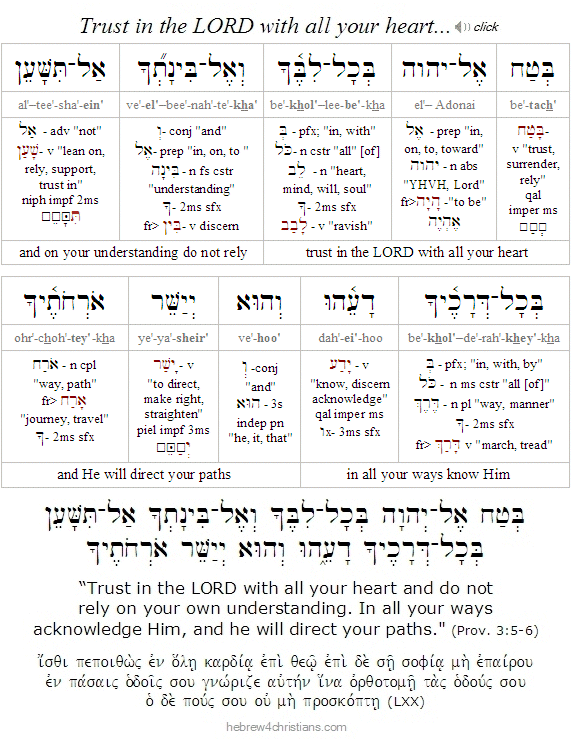 |
Note that where is says katveim al-lu'ach leebe'kha (כָּתְבֵם עַל־לוּחַ לִבֶּךָ), "write them (i.e., the Torah and commandments) on the tablets of your heart" (Prov. 3:3, 7:2-3), allusion is made to the new covenant (בְּרִית חֲדָשָׁה) where the Holy Spirit would put the Torah within our inward parts and engrave its truth upon our hearts (see Jer. 31:33).
Torah of the Neighbor...

01.21.22 (Shevat 19, 5782) The Ten Commandments are often divided into two basic groups or categories. The first five commandments are said to be "between man and God" (i.e., ben adam le'chavero: בֵּין אָדָם לְחֲבֵרוֹ), and contain 146 words; whereas the second five are said to be "between man and other people" (i.e., ben adam la'Makom: בֵּין אָדָם לְמָקוֹם), and contain 26 words, the same value as the Name of God, YHVH (יהוה). In this connection we note that the Ten Commandments begin with "I AM" (אָנכִי) and end with "[for] your neighbor" (לְרֵעֶךָ), which when joined together says, "I AM your neighbor." In other words, the LORD Himself is also found in your neighbor... When we love our neighbor as ourselves (אָהַבְתָּ לְרֵעֲךָ כָּמוֹךָ), we are demonstrate our love for God. But who, then, is your neighbor? You are -- to every other soul you may encounter this day (Luke 10:36).
 |
Note: I should add that loving others is impossible without first receiving (inwardly accepting and making your reality) who you are as the "beloved of the Lord..." You have to start there, since you can't give away what you don't have. If you struggle with loving others, or are a cynic, a misanthrope, a jaded soul, or are wounded or bitter of heart, then first find your heart's healing and then simply live honestly before others... May God help each of us!
Gift of a New Heart:
The Tenth Commandment...
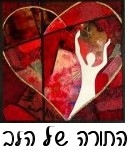
[ The following is related to the giving of the Ten Commandments at Sinai...]
01.21.22 (Shevat 19, 5782) The last of the Ten Commandments is the Tenth Commandment not to covet or to want things that are not yours. The Hebrew word translated "covet" in many translations (i.e., chamad: חמד) usually refers to selfish desire or lust (e.g., "Lust not after her beauty in thine heart..." Prov. 6:25), and thus speaks directly to the heart's innermost intention, which, even if unacknowledged by ourselves, is always revealed before God: "Your Father who sees in secret" (Matt. 6:6). On the other hand, selfish desire can - if we are willing to be honest with ourselves - reveal to ourselves the condition of our hearts and thus mark our need for deliverance from the power of sin. As the Apostle Paul wrote to the believers in Rome: "I had not known sin ...except the law had said, 'Thou shalt not covet'" (Rom. 7:7). Inner peace or contentment is the blessing that comes from surrendering your desires to God, letting go of your envy, and receiving your daily bread with humility and gratitude... It is the way to simchah (שִׂמְחָה), or "happiness."
Hebrew Podcast
Exodus 20:17 Hebrew reading:
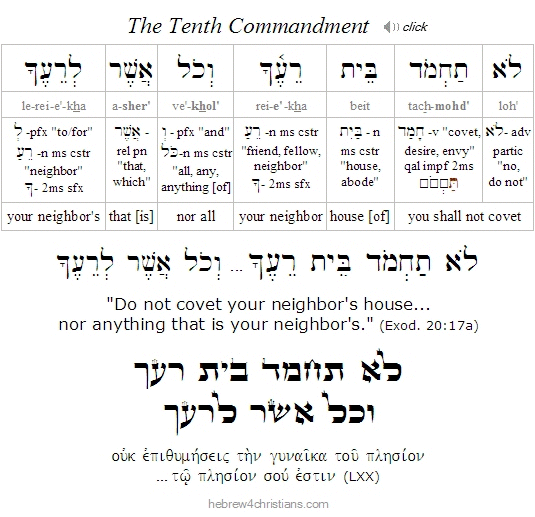 |
Live the Truth:
The Ninth Commandment...

[ The following is related to the giving of the Ten Commandments at Sinai...]
01.21.22 (Shevat 19, 5782) The Ninth Commandment prohibits swearing falsely against your neighbor in matters of law and civil proceedings, but, on a deeper level, it implicitly indicates the responsibility to be a witness of the truth at all times. Note that the Hebrew word for "truth" (emet) is composed from the first, the middle, and the last letters of the Hebrew Alphabet, thus indicating that it encompasses the first things, the last things, and everything in between. Thus, in relation to our neighbor (who is really everyone), we are to be truthful and bear witness to the truth in all our moments of life.
Hebrew Podcast
Exodus 20:16 Hebrew reading:
Love gives to others:
The Eighth Commandment...
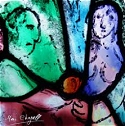
01.21.22 (Shevat 19, 5782) The Eighth Commandment against stealing (לא תגנב, Exod. 20:15) corresponds to the third commandment not to profane God's name. Stealing, in the sense of the Hebrew word ganav (גנב), refers to both the act of carrying off by stealth that which is not one's own (i.e., theft), but also to the deceptive inner disposition that accompanies the action. And ultimately that deceptive inner disposition is a form of self-deception. After all, none of us categorically "owns" anything, since God alone is the Creator and Giver of all of life. Stealing arrogantly (and vainly) attempts to seize some "thing" and to claim it for oneself - blindly disregarding the fact that "in Him we live and move and have our being" (Acts 17:28).
Hebrew Podcast
Exodus 20:15 Hebrew reading / commentary:
Choose true love:
The Seventh Commandment...

[ This week we are reviewing the Ten Commandments at Sinai...]
01.21.22 (Shevat 19, 5782) The sages say that the Seventh Commandment prohibition against adultery (לא תנאף, Exod. 20:14) corresponds to the Second Commandment prohibition against idolatry. Adultery refers to sexual union between a married person and someone other than his or her spouse (fornication, on the other hand, is also prohibited in the Scriptures though it is a broader term that refers to any sort of sexual contact outside the covenant of marriage). The penalty for adultery is severe (see Deut. 22:22, Lev. 20:10).
From the verse, "The adulterer waits for twilight saying, No eye shall see me" (Job 24:15), the Talmud infers the adulterer to be a practical atheist, since he does not say, "No man shall see me, but no eye - neither the eye of one below nor the eye of Him above."
Adultery is a grave sacrilege, since it not only violates the sworn promise of parties to a sacred covenant, but perverts the picture of our union with God Himself. As Paul wrote to the believers at Ephesus, "We are members of his body, of his flesh, and of his bones. For this cause shall a man leave his father and mother, and shall be joined unto his wife, and they two shall be one flesh. This is a great mystery: but I speak concerning Messiah and the church" (Eph. 5:30-32). This is why apostasy is likewise likened to spiritual adultery...
Hebrew Podcast
Exodus 20:14 on adultery and sexual sin:
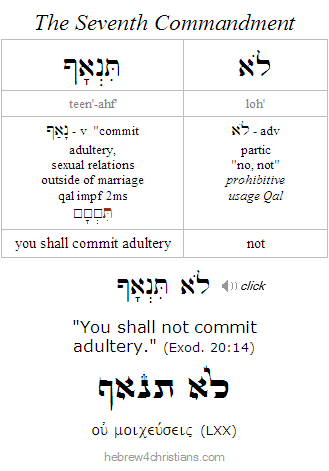 |
Do no harm:
The Sixth Commandment...

[ The following is related to Parashat Yitro and the giving of the Ten Commandments at Sinai...]
01.21.22 (Shevat 19, 5782) The Mechilta (a halakhic midrash on Exodus) teaches that the Ten Commandments were divided into two groups with the first five on one tablet and the second five on the other, and that these correspond to one another so that, for instance, the Sixth Commandment (לא תרצח, "you shall not murder"; Exod. 20:13) is linked to the first commandment to believe in God (Exod. 20:2). Since man is made in the image of God, his life is infinitely precious, and only God Himself has the right to give and take life. In the Mishnah it is written, "Why was only one man (i.e., Adam) created by God? - to teach that whoever takes a single life destroys thereby a whole world; and whoever saves one life, the Scripture accounts it as though a whole world had been saved (Sanhedrin 4:5). But murder can be figurative as well as literal. The Talmud notes that shaming another publicly is like murder, since the shame causes the blood to leave the face. Moreover, gossip or slander are considered murderous to the dignity of man. The Ethics of the Fathers states, "The evil tongue slays three persons: the utterer of the evil, the listener, and the one spoken about..." Yeshua also linked the evil intent of our words with murder (see Matt. 5:21-22; 15:19).
Hebrew Lesson / Podcast
Exodus 20:13 Hebrew reading with commentary:
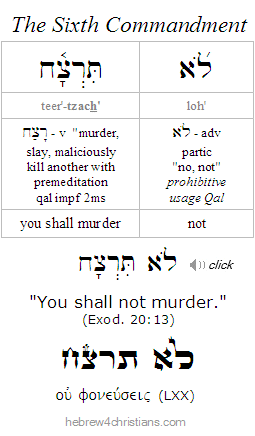 |
Respecting your history:
The Fifth Commandment...
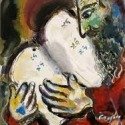
[ This week we are reviewing the Ten Commandments at Sinai...]
01.21.22 (Shevat 19, 5782) The first four of the Ten Commandments focus on our relationship with God, and it is only through obedience to these commandments that we are able to really understand our own identity - as well as the identity of others in our family, our community, and our world. The Fifth Commandment, to honor your parents, bridges the commandments directed heavenward (bein adam la'makom) with those directed toward one's fellow man (bein adam le'chavero). Honoring our parents teaches us the first principles of honoring God and others; it is the fulcrum by which we learn empathy and "derekh eretz" (דרך ארץ), the basic respect that underlies courtesy and good manners. The importance of this commandment cannot be overstated, since the word translated "honor" (i.e., kabed: כבד) derives from a root word meaning "weighty" (in terms of impressiveness or importance) and is often used to refer to the glory of God. The meaning of kabed in this context derives from the preceding verses (i.e., the first four commandments) which center on honoring God Himself. When we likewise honor our father and mother, the LORD says, "I reckon it as though I dwelled with them and they honored Me" (Kiddushin 31a).
Hebrew Lesson / Podcast
Exodus 20:12a on honoring others:
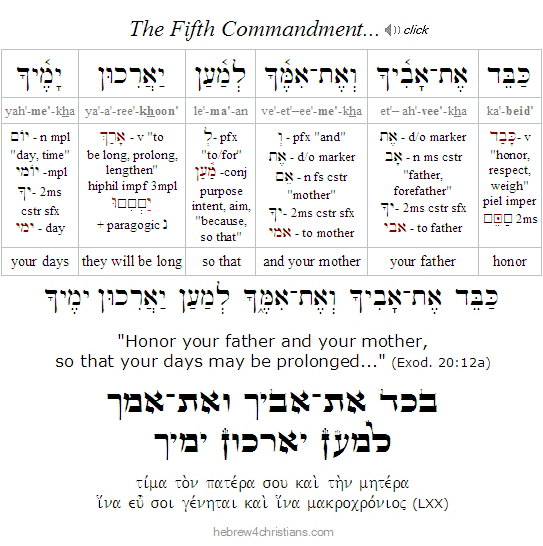 |
Identifying the Sacred:
The Fourth Commandment...

01.21.22 (Shevat 19, 5782) The Fourth Commandment is to "remember" (i.e., zakhor: זכוֹר) the Sabbath day for holiness (Exod. 20:8). We are to set aside, that is, regard as sacred, the seventh day as an acknowledgment that God is both our Creator (Exod. 20:11) and our Savior (Deut. 5:15). By "remembering" the Sabbath we understand other days of the week in relation to it, the "first day" until the Sabbath, the "second day" until the Sabbath, and so on until we reach the Sabbath itself which marks an appointed time of sanctity and rest (i.e., menuchah: מנוחה). Some of the Jewish mystics came to regard the Sabbath not so much as a "day" in the usual sense but rather a spiritual "atmosphere" to be welcomed and greeted as beloved (לכה דודי). The fourth commandment also includes the restriction from doing profane activities (i.e., melachah: מלאכה): "you shall not do any labor" because Shabbat is time set apart for holy pursuits, for family connections, and for healing rest. God blessed the seventh day and sanctified it so that there would special provision from heaven to honor this time (Exod. 16:22). So important is the Sabbath day that God emphatically repeated the commandment just before he gave the tablets to Moses (Exod. 31:13-18).
The Sabbath is a delight – not a burden; a time for celebrating your personal rest in our Messiah Yeshua (Isa. 58:13; Heb. 4:9). Indeed, all those who honor the Sabbath - including the "foreigners" of Israel - will be given a name that is "better than sons and daughters" that will never be cut off (Isa. 56:3-8). Moreover, Sabbath will be honored in the Millennial Kingdom to come: "From new moon to new moon, and from Sabbath to Sabbath, all flesh shall come to worship before me, declares the LORD" (Isa. 66:23). Indeed the blessing of the Sabbath will be honored in the heavenly Jerusalem itself (Rev. 22:2).
Hebrew Lesson / Podcast:
Exodus 20:8 on the Sabbath day:
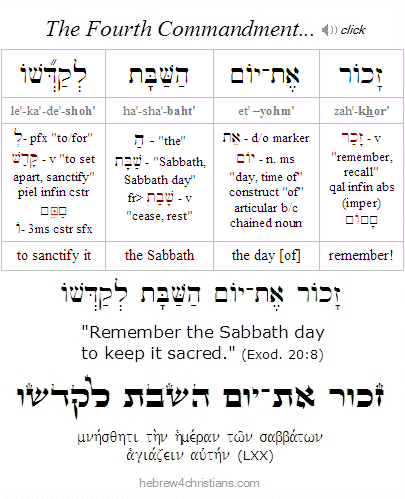 |
The Fear of the LORD:
The Third Commandment...
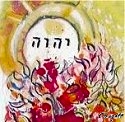
[ The following is related to Parashat Yitro and the giving of the Ten Commandments at Sinai...]
01.21.22 (Shevat 19, 5782) The Third Commandment is "You shall not take the name of the LORD your God in vain" (Exod. 20:7). This commandment implies that it is forbidden to invoke God's name for unholy or profane purposes, for example in jest or as a curse, though it further forbids using the truth of God as a means of harming or degrading other people. "Lifting up" God's name for selfish purposes is a violation of this commandment, and the commandment continues by gravely warning that "the LORD will not hold him guiltless who takes his name in vain." The sages have said that all the words of Torah together form the name of God, and if a single word or letter is missing from a Torah scroll it becomes unfit for use. This teaches that honoring God's word is therefore connected with honoring his Name, and conversely, dishonoring God's name expresses contempt for his word.
Hebrew Lesson:
Exodus 20:7a Hebrew reading:
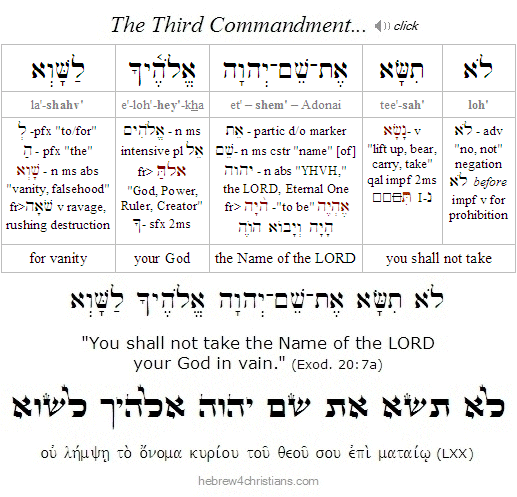 |
Focus on the Sacred:
The Second Commandment...
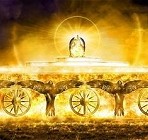
[ The following is related to the giving of the Ten Commandments at Sinai...]
01.21.22 (Shevat 19, 5782) The Second Commandment, "You shall have no other gods before Me" (Exod. 20:3), implies individual accountability for your soul before the Creator of all reality. Pagan religions often believe in a supreme being but regard such as unknowable and distant and therefore they commonly appeal to divine "subordinates" (e.g., angels, other beings with godlike powers, etc.) to intervene on their behalf. The second commandment teaches that there are no intermediate or subordinate beings to which we may appeal, since there is only one God who holds all power and authority in heaven and earth and we are each accountable directly to him. When we pray, then, we are not to venerate angels or saints or to appeal to God on behalf of intermediaries. We come boldly before the Throne of Grace to make our appeals personally before the Living God (Heb. 4:16). The second commandment implies monotheism with the implication that appealing to other gods (or god-like powers) is actually worship of demonic entities (see Deut. 32:17; 1 Cor. 10:20). We are to know that the LORD is one LORD, as the opening of the Shema proclaims (Deut. 6:4).
Hebrew Lesson:
Exodus 20:3 Hebrew reading:
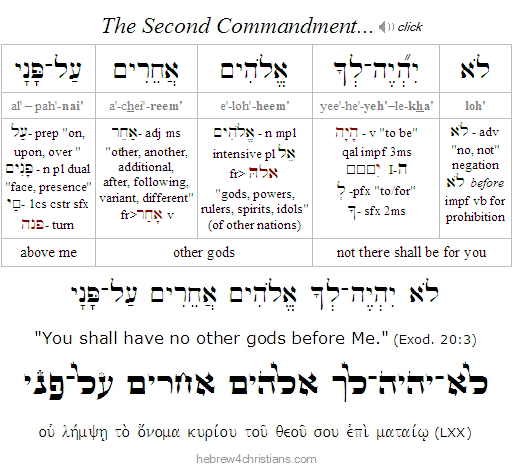 |
Believing in God (emnuah):
The First Commandment...

[ The following is related to Parashat Yitro and the giving of the Ten Commandments at Sinai...]
01.21.22 (Shevat 19, 5782) Historically, Christian tradition has regarded the First Commandment to be: "You shall have no other gods before me" (Exod. 20:3), though Jewish tradition regards the opening words, "I am the LORD your God (אנכי יהוה אלהיך) who brought you out of the land of Egypt, out of the house of slavery" (Exod. 20:2) to be the first commandment and the foundation upon which all the other commandments are based. Though the statement "I am the LORD your God..." is not an imperative, it nevertheless assumes that you will accept the truth of God's revelation, and therefore it might also be understood as the duty or commandment to accept the truth. "I am the LORD your God who brought you out..." refers to the saving acts of God performed on your behalf, and therefore the proper response is one of heartfelt gratitude. After all, without faith in the truth that the LORD is your Redeemer who loves and chooses you, the subsequent commandments would be devoid of context and significance. Indeed all the subsequent commandments are grounded in the truth of God that is received by faith (Hab. 2:4), and therefore the first commandment is to have emunah, or faith in God. Moses ben Nachman interprets the First Commandment to know that God exists and to believe in him, which implies studying and exploring the greatness of the Creator and Savior.
Hebrew Lesson
Exod. 20:2 Hebrew reading (with commentary):
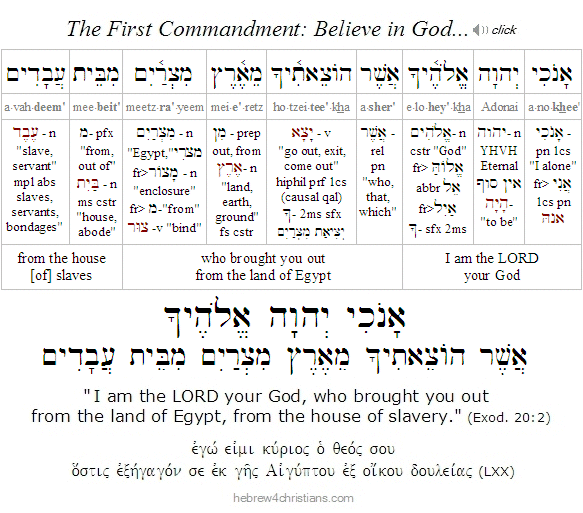 |
Borne by the Spirit...
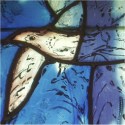
01.20.22 (Shevat 18, 5782) Sin is defined as the transgression of Torah (i.e., ἀνομία) in the Scriptures (1 John 3:4), and at root such rebellion comes from an unwillingness to trust that what God wants is your deepest happiness. Because of this, sin goes "out of bounds" and expresses itself as the desire to control one's life, to define "the good" (or the bad) on its own terms: to "eat of the tree of the knowledge of good and evil" (Gen. 2:17).
Surrender, on the other hand, gives up control and relies upon God's care. It relaxes because it accepts God's love as a gift and not as something to be earned. Meister Eckhart said it this way, "God is not attained by a process of addition to anything in the soul, but by a process of subtraction." In other words, we don't need to do anything to be free, though we must "get out of the way" for the Holy Spirit to do the work in us. "If the Son shall set you free, you shall be free indeed" (John 8:36). Set us free, O precious Lord!
Hebrew Lesson
Proverbs 3:5 Hebrew reading (click):
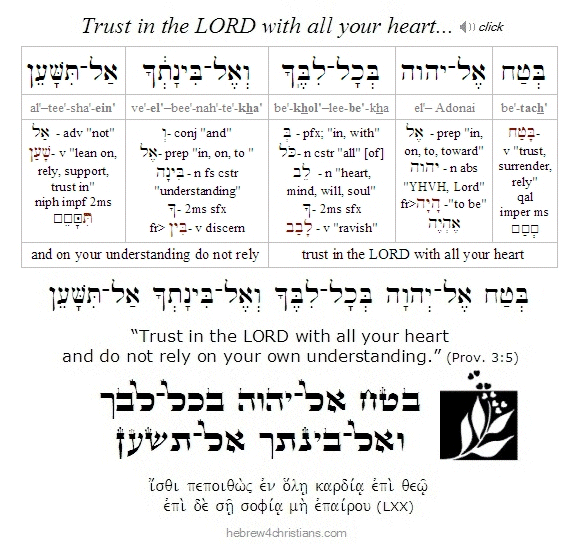 |
Torah of Faith (תּוֹרַת הַאֱמוּנָה)...
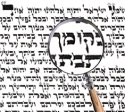
[ The following is related to our Torah for this week, Parashat Yitro, and the giving of the Ten Commandments at Sinai in particular... ]
01.20.22 (Shevat 18, 5782) When asked how many commandments are in the Torah, most Jews will answer 613, based on Jewish tradition (the number 613 is sometimes called "taryag" (תריג), an abbreviation for the letters Tav (400) + Resh (200) + Yod (10) + Gimmel (3) = 613). Despite several attempts made over the centuries, however, there has never been a definitive list of these commandments, and of those who tried to compile such, no two agree... Some say the number 613 comes from a fanciful midrash that teaches that since there are 365 days in a year (corresponding to the 365 negative commandments) and 248 "parts" of the body (corresponding to the positive commandments), each day we should use our body to serve God.
Regardless of the exact count, however, the Talmud followed the Apostle Paul by understanding all the Torah's commandments to be derived from the Ten Commandments given at Sinai, the most basic of which is the very First Commandment, namely, "I AM the LORD your God (אָנכִי יְהוָה אֱלהֶיךָ) who brought you out of Egypt, out of the house of slavery" (Exod. 20:2). This foundational commandment was later restated by the prophet Habbakuk as: וְצַדִּיק בֶּאֱמוּנָתוֹ יִחְיֶה / "The righteous person will live by faith in God" (Hab. 2:4; Rom. 1:17; Gal. 3:11; Heb. 10:38). In other words, all of the commandments of God come down to your sacred duty to receive the truth of God's love: "I am the LORD your God" (אָנכִי יְהוָה אֱלהֶיךָ).
So if you hear people discussing the 613 commandments of Torah, be sure to ask them which list of "613" they mean, and then be sure to remind them that whatever list they might recommend, the central commandment that embodies all the rest is to have faith, to believe, to show up, to look to the LORD -- at this moment, in this hour. Amen.
Hebrew Lesson
Habakkuk 2:4 Hebrew reading:
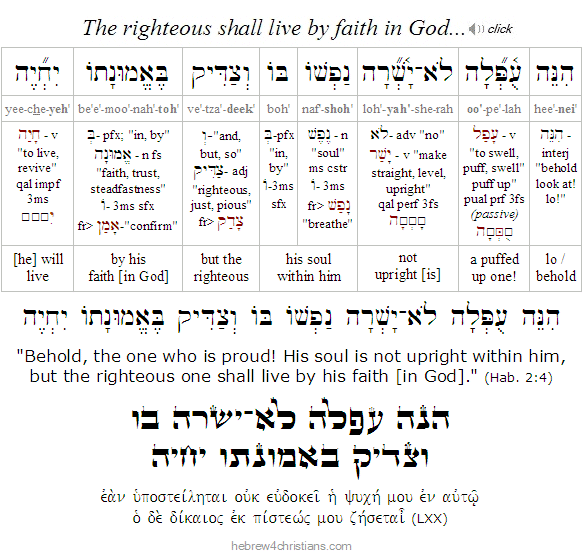 |
A "New Covenant" at Sinai

01.20.22 (Shevat 18, 5782) In our Torah portion this week (Yitro), God revealed the Ten Commandments (i.e., עֲשֶׂרֶת הַדִבְּרוֹת, literally, "the ten declarations") to the Israelites at Sinai, a dramatic event that represented the giving of the law, or the "Old Covenant," to Israel. Now while a case can surely be made that the revelation at Sinai represented an "older covenant" (see 2 Cor. 3:14; Heb. 7:18, 8:6,13, and here), when looked at from another perspective, Sinai actually represented a sort of new covenant, since it was given later and served as a proviso to the covenant given earlier to Abraham (Gal. 3:18).
As we will see next week, the culmination of the covenant at Sinai was the revelation of the Altar (i.e., the Tabernacle), which pictured the sacrificial blood "covering" the tablets of God's judgment. This, in turn, recalled Abraham's great sacrifice of his son Isaac (the Akedah), which further recalled the very first sacrifice of the Bible, namely the lamb slain in the orchard of Eden to cover the shame of Adam and Eve's sin (Gen. 3:21; Rev. 13:8). Therefore it was the promise God made to Eve regarding the "Seed to Come" that was the original covenant (Gen. 3:15), and it was this covenant that was later fulfilled by Yeshua, the "Serpent Slayer" of God (Num. 21:9; John 3:14). This is the "Gospel in the Garden" message, the original promise of the lamb of God that was slain from the foundation of the world... In other words, the "new covenant" (בְּרִית חֲדָשָׁה) may better be understood as the fulfillment of the original covenant, the promise to redeem all of humanity from the curse of sin and death. The redemptive plan of God therefore moves in an ascending circle. The "Tree of Life" (עץ החיים) reaches back to the primordial orchard of Eden and extends into the World to Come...
Because there is so much confusion regarding the topic of the role of the law, particularly among certain "Messianic believers," I would like to reiterate a few things mentioned elsewhere on this site. Let me first remind you that the legal aspect of the "Torah" refers to the subset of the written Torah called Sefer Ha-Brit (סֵפֶר הַבְּרִית), a portion that defined various ethical, social, and ritual obligations given at Sinai (Exod. 24:7-8). It is a "category mistake" to simply regard the first five books of the "Torah" as the "law," since the law was given later in sacred history, after the Exodus. Moreover, the Book of Genesis reveals that the very first "priest" (i.e., kohen: כּהֵן) was neither a Jew nor a Levite nor a descendant of Aaron, but rather Someone who is said to have "neither beginning of days nor end of life" but is made like (ἀφωμοιωμένος) the Son of God, a priest continually (Heb. 7:3). This priest, of course, was Malki-Tzedek (מַלְכִּי־צֶדֶק), the King of Salem (מֶלֶךְ שָׁלֵם) to whom Abraham offered tithes after his victory over the kings (Gen. 14:18). The author of the Book of Hebrews makes the point that the priesthood of Malki-Tzedek is greater than the Levitical priesthood and is therefore superior to the rites and services of the Tabernacle (Heb. 7:9-11). It was to Malki-Tzedek that Abram (and by extension, the Levitical system instituted by his descendant Moses) gave tithes and homage -- and rightly so, since Yeshua is the great High Priest of the better covenant based on better promises (Heb. 8:6). As the Scriptures teach, in everything Messiah has preeminence (John 5:39; Luke 24:27; Col. 1:18).
Hebrew Lesson
Genesis 14:19b Hebrew reading:
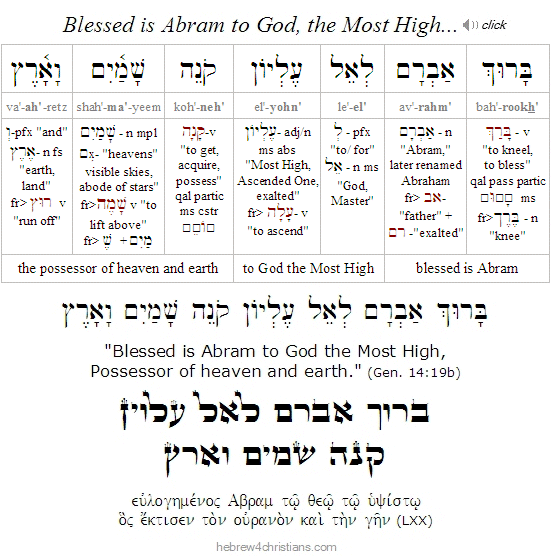 |
The Good Fight of Faith...
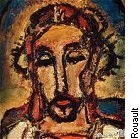
01.19.22 (Shevat 17, 5782) An old story tells that a person died and stood before God. God asked, "Where are your wounds?" The person answered, "What wounds? I have none." God said, "Was there nothing worth fighting for?"
The struggle of faith is infinitely and everlastingly worth it, friends! "Fight the good fight of the faith. Take hold of the eternal life to which you were called" (1 Tim. 6:12). "Our momentary, light suffering is producing for us an eternal weight of glory far beyond all comparison" (2 Cor. 4:17); "for I consider that our present sufferings cannot even be compared to the glory that will be revealed to us" (Rom. 8:18). "We have an inheritance imperishable, undefiled, and unfading, reserved in heaven for you... although you may have to suffer for a short time in various trials" (1 Pet. 1:4-6). So be strong in the Lord and in the power of his might; hold fast to your confession and persevere in your journey, despite the challenges and trials along the way. God is faithful; he will bring you safely back home....
Hebrew Lesson
Lamentations 3:22-23 Hebrew reading:
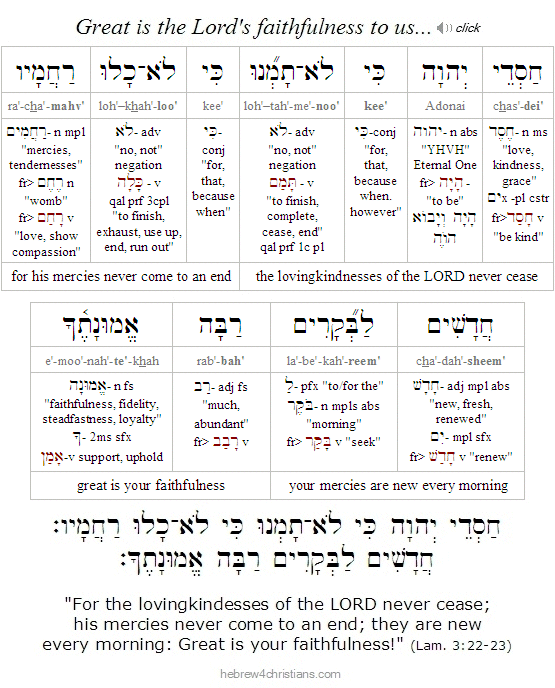 |
The Mitzvah Connection...

[ The following is related to this week's Torah reading and the giving of the law at Sinai... ]
01.19.22 (Shevat 17, 5782) The Hebrew word "mitzvah" (מִצְוָה) is often translated as "commandment," though its basic idea is about connection to God (i.e., the root צוה means to bind or unite). Being connected with the Almighty means talking with him, relating to him as your heavenly Father, and trusting that he esteems you as his beloved child. Whatever else you may think about the commandments of God, this idea of a love connection is foundational and essential. The very first of the Ten Commandments is anochi Adonai Elohekha, "I am the Lord your God," which invites you to open your heart to receive the touch of the Spirit of God. There is no love like that of the Lord, but you can't feel that love if you don't speak to Him, pouring out your heart and clinging to the truth of his love for you....
Hebrew Lesson
Psalm 62:8 Hebrew reading:
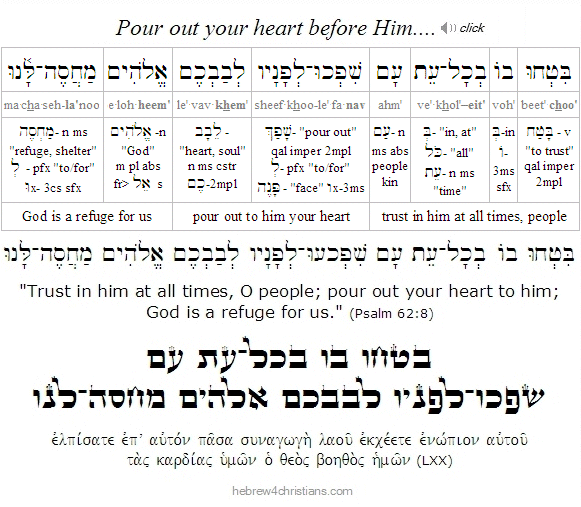 |
Pouring out your heart to God in an honest, transparent, and earnest way is sometimes called hitbodedut (הִתְבּוֹדְדוּת). After we "talk our hearts out" before the Lord, in our emptiness we can begin to truly listen, as it says, "In returning and rest you shall be saved; in quietness and in trust shall be your strength" (Isa. 30:15). Only after we sigh deeply and surrender are we receptive to the voice of the Spirit's whisper. "Blessed are all those who wait for Him" (Isa. 30:18). We wait, we abide, even when God takes his time or does not immediately intervene. We do not lose heart, for we find strength when we trust in God's love... The Light of the world still shines: Yeshua, be my inner word, my heart, and my groaning for life today, and forevermore, amen.
Since the essence of Torah is connection to God, the greatest blessing is to be filled with a steadfast desire to draw close to him, to experience hunger and thirst (visceral yearning) for God's presence and touch. Holy desire – expressed in the yearning of heartfelt prayer – is therefore a state of true blessedness, and the more desperate our need for God the more blessed we are. It is our desire, our holy need, that creates a bond between our soul and its Creator, and that is the deeper meaning of mitzvah... "Blessed are those who hunger and thirst for righteousness, for they shall be satisfied" (Matt. 5:6).
Ten Matters of Heart...
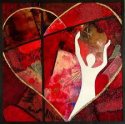
01.19.22 (Shevat 17, 5782) As I discuss in the Shavuah Tov audio for parshat Yitro, the Ten Commandments of Torah (עֲשֶׂרֶת הַדִבְּרוֹת) may be summarized this way: 1) "I AM your only deliverer, the One who loves and chooses you; 2) love me exclusively; 3) regard my love as sacred; 4) rest in me; 5) honor your life and its history. Do no harm to others: 6) forsake anger, 7) abandon lust, 8) renounce greed, and 9) abhor lying, and 10) refuse envy. Know that you belong to me and that you are accepted. Love others as you are also loved..."
The "heart of the law" is the Torah of love, just as the "law of love" is the Torah of the Gospel (John 15:12). "Teach me the whole Torah, a heathen said, while I stand on one foot. Shammai cursed and drove the man away. He went to Hillel. Hillel said, What is hateful to you, do not do to anyone else: that is the whole Torah. The rest will follow – go now and learn it." As the Apostle Paul taught: "For the whole law is fulfilled in one word: Ve'ahavta: "You shall love your neighbor as yourself" (Gal. 5:14). Love does no wrong to a neighbor; therefore love is the fulfilling of the law" (Rom. 13:10).
Note: "Now the goal of the commandment is love (τὸ δὲ τέλος τῆς παραγγελίας ἐστὶν ἀγάπη) from a pure heart and a good conscience and a sincere faith, though some people, having strayed away, have turned instead to vain talk, desiring to be teachers of the Torah but without understanding either what they are saying or the things about which they make confident assertions" (1 Tim. 1:5-7). If your understanding of Torah and the meaning of the Ten Commandments (עֲשֶׂרֶת הַדִבְּרוֹת) doesn't lead you directly to God's love, you have made a seriously wrong turn... For more on this subject, click here.
The First Commandment...

[ The following is related to this week's Torah reading, parashat Yitro... ]
01.19.22 (Shevat 17, 5782) This week we are reading about the giving of the Torah at Mount Sinai and in particular the declaration of the Ten Commandments. In this connection Rabbi Levi said, "When the Holy One spoke to the people of Israel, each one felt personally spoken to by God, and thus it says in the singular, 'I am the Eternal One, your God.'" Indeed the first commandment at Sinai was to accept the reality of our personal deliverance by the LORD: "I am the LORD your God (אָנכִי יְהוָה אֱלהֶיךָ), who brought you (singular) out of the land of Egypt, out of the house of slavery" (Exod. 20:2). In fact, the Hebrew text of the Torah reveals that God used the second person singular (not plural) for all the verbs throughout the Ten Commandments: "you (singular) shall have no other gods beside me"; "you (singular) shall not take the Name of the LORD your God in vain," and so on. The very First Commandment, however, is the starting point for all that follows. Until you are personally willing to accept the LORD as your God and to trust Him as your own Deliverer and King, the rest of the commandments are not likely to be heeded.
Hebrew Lesson
Exod. 20:2 Hebrew reading:
 |
It is noteworthy that God began with the phrase asher hotzetikha me'eretz mitzrayim ("who delivered you from the land of Egypt") instead of identifying Himself as the Creator of heaven and earth (Gen. 1:1). This is because the purpose of creation is to demonstrate God's redemptive love and to be known as our Savior and Redeemer, just as Yeshua is the "Lamb slain from the foundation of the world" (Rev. 13:8; 1 Pet. 1:18-20; Eph. 1:4; 2 Tim. 1:9). "All things were created by Him (i.e., Yeshua), and for Him" and in Him all things consist (συνεστηκεν, lit. "stick together") (Col. 1:16-17). Creation therefore begins and ends with the redemptive love of God as manifested in the Person of Yeshua our Mashiach, the great Lamb of God... He is the Center of Creation - the Aleph and Tav - the Beginning and the End (Isa. 44:6; Rev. 1:17). All the world was created for the Messiah: "For from him and through him and to him are all things. To him be glory forever. Amen" (Rom. 11:36).
The Law and the Spirit...
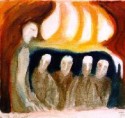
[ The following is related to this week's Torah reading (Yitro). Please read the Torah portion to "find your place" here. ]
01.18.22 (Shevat 16, 5782) "On the first day of the third month after leaving Egypt, the people of Israel came to the desert of Sinai" (Exod. 19:1). The revelation at Sinai is celebrated each year during the festival of Shavuot ("Weeks"), which occurs exactly seven weeks (49 days) after the Passover (because of this, Shavuot is sometimes called "Pentecost," meaning "the 50th day"). The 49 day countdown from the day after Passover was later commemorated as the period of "counting the omer." In Jewish tradition, Shavuot is called the "time of the giving of our Torah," the culmination of the Passover deliverance, though it is also the time when the Holy Spirit) was poured out to the followers of Yeshua in fulfillment of the promised New Covenant (Acts 2, Jer. 31:31-33). Note carefully that the advent of the Spirit occurred after the resurrection of Yeshua from the dead, which implies that the festivals of the LORD were not restricted to the "old testament" economy, but on the contrary, the New Covenant was intended to impart the revelation of Torah within the heart, as it says: "I will put my Torah within them (נָתַתִּי אֶת־תּוֹרָתִי בְּקִרְבָּם) and engrave it upon their hearts" (Jer. 31:33; also Heb. 8:10; 10:16).
Hebrew Lesson
Jer. 31:33b Hebrew reading:
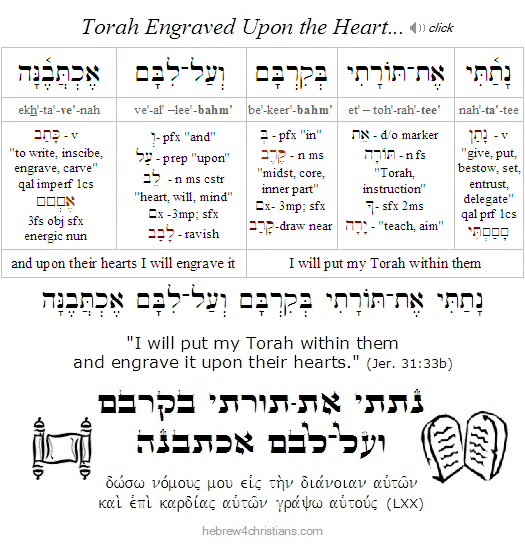 |
Good Shepherd's Care...

01.18.22 (Shevat 16, 5782) Where it is written, "the LORD is my Shepherd; I shall not want" (Psalm 23:1), we note that "I shall not want" (לא אחסר) does not mean "I shall not desire," but rather "I shall not lack." When the Lord is your Shepherd, you can trust that you have all that you need. Note that David uses the future tense here (אחסר) because God is ahead of your next moment, so to speak: "Your Father knows what you need before you ask Him" (Matt. 6:8). God's Name means Presence, Life, Love, and "I-AM-with-you-always." Yeshua is our Good Shepherd (הרעה הטוב) who makes us lie down in green pastures, a place of abundant life, and then leads us to still waters, literally "waters of rest" (מי מנוחות), that will restore your soul (the verb translated "restore" is an intensive passive of the verb shuv, "to turn" (שׁוּב), indicating that the Shepherd causes your soul to return to the Divine Presence). As our Good Shepherd has said, "My sheep hear my voice, and I know them, and they follow me. I give them eternal life, and they will never perish, and no one will snatch them out of my hand" (John 10:27-28). Yeshua is the one who makes for us the paths of righteousness; He leads us on the way to the Father (John 14:6).
Hebrew Lesson
Psalm 23:3 Hebrew reading:
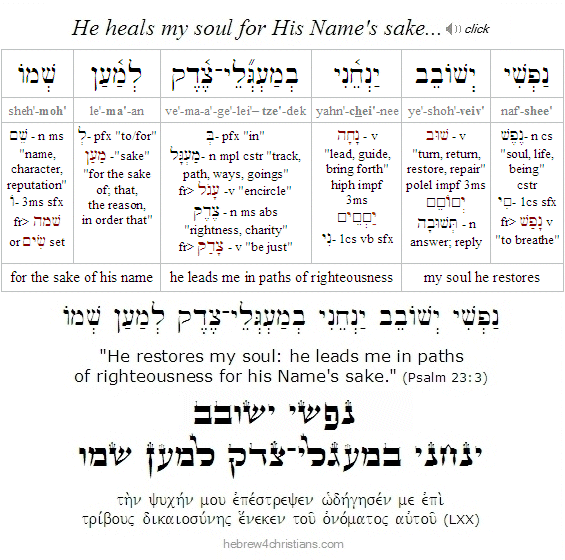 |
Do not lose heart...

01.17.22 (Shevat 15, 5782) I realize that many of you are troubled and in pain, struggling to hang on to hope, waiting for the fulfillment of the promise of your salvation in Yeshua. Keep the fire of your heart burning, friend... Rabbi Nachman once told a person who was struggling with his faith: "It is written that all creation was brought into being because of people like you. God saw there would be people who would cling to our holy faith, suffering greatly because confusion and doubt would plague them. God perceived that such would overcome these doubts and troubles of heart and remain strong in their belief. It was because of this that God brought forth all creation."
Amen. Never yield to despair, since that leads to further darkness and fear. Press on and keep fighting the "good fight" of faith (1 Tim. 6:12). Remember that you infinitely matter to heaven; your life has great value; you are significant and you are truly loved by our Heavenly Father. There is a "future and a hope" reserved for you; there is "a white stone, and on that stone will be written a new name that no one can understand except the one who receives it" (Rev. 2:17). May "the trial of your faith, being much more precious than of gold that perishes, though it be tested with fire, be found to result in praise and glory and honor at the revelation of Yeshua the Messiah" (1 Pet. 1:7).
Hebrew Lesson
Jer. 29:11b Hebrew reading:
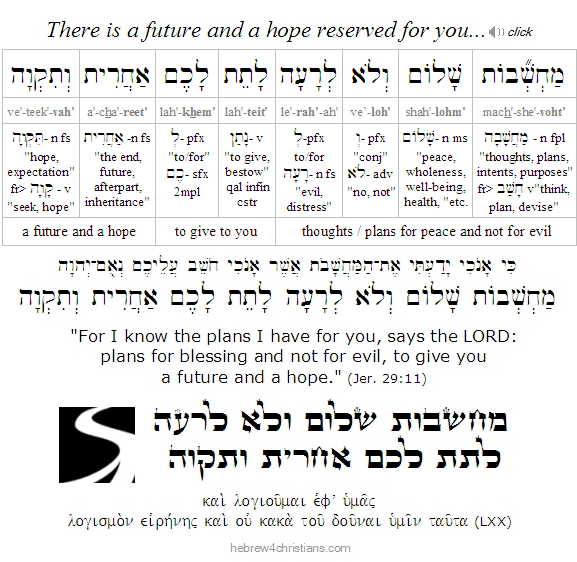 |
"I am sure of this, that he who began a good work in you will bring it to completion (ἐπιτελέω) at the Day of Yeshua the Messiah" (Phil 1:6). The LORD is able to guard you (φυλάξαι) from stumbling and to present you blameless before the presence of His glory with great joy (Jude 1:24). "The LORD upholds all who are falling and raises up all who are bowed down" (Psalm 145:14). "He will sustain you to the end, guiltless in the Day of our Yeshua the Messiah" (1 Cor. 1:8). He who calls you is forever faithful; He will surely do it (1 Thess. 5:24). Yea, "the Lord is faithful (נֶאֱמָן הוּא): He will establish you and guard you against the evil one" (2 Thess. 3:3). The Spirit says, "Fear not, for I AM with you always."
Hebrew Lesson
Isa. 30:15b Hebrew reading:
These are the words...

01.17.22 (Shevat 15, 5782) From our Torah portion this week (i.e., Yitro) we read words of great promise and comfort: "You shall be for me a treasured people; you shall be children of the King; you shall be priests who help others draw near to God... these are the words (אֵלֶּה הַדְּבָרִים) that you shall speak" (Exod. 19:5-6). These are the words of love: "And you shall love the LORD your God with all your heart, with all your soul, with all your substance. Set these words (הַדְּבָרִים הָאֵלֶּה), which I command you this day, upon your heart" (Deut. 6:5-6). We store up these words so that, in a holy moment, they are quickened within us and we are able to hear the Voice of the LORD speaking from the midst of the fire that burns within our hearts. As Simone Weil said, "love is revelation, and revelation comes only with love."
Hebrew Lesson
Exodus 19:6 Hebrew reading:
The Test of Manna...

01.17.22 (Shevat 15, 5782) "I am about to rain bread from heaven (לֶחֶם מִן־הַשָּׁמָיִם) for you, and the people shall go out and gather a day's portion every day, that I may test them, whether they will walk in my Torah or not" (Exod. 16:4). Note that while God graciously provided the miracle of manna, the people were required to receive it for themselves. Note further that a portion was given for just that day, and storing it up for later use (except for the Sabbath) resulted in rottenness and decay (Exod. 16:20). By being required to collect their daily bread the people learned that God's blessing and their efforts worked together. Our sustenance is a gift from heaven, though we must reach out to take hold of it...
"Tomorrow is a day of solemn rest, a holy Sabbath to the LORD" (Exod. 16:23). Here is the first mention of the obligation to observe the Sabbath (mentioned even before Sinai), which is introduced in connection with the requirement for the people to collect a double portion of manna on Friday for the following day. The sages here note that the Sabbath and the manna both underscore our complete dependency on God as the source of our sustenance.
"I will test them to see whether they will walk in my Torah or not" (Exod. 16:4). This is the test to see whether we will trust God to meet our needs... After all, it is one thing to believe God can help you and yet another to trust that it is so. Peace comes when belief and trust are unified within the heart - when the one who firmly believes completely trusts as well. God gave bread from heaven to test us: "And he humbled you and let you hunger and fed you with manna, which you did not know, nor did your fathers know, that he might make you know that man does not live by bread alone, but man lives by every word that comes from the mouth of the LORD" (Deut. 8:3). God humbles us, which is really the greatest of blessings, since we then learn to rely on God's strength and love to meet all our needs.
Hebrew Lesson
Deut. 8:3b Hebrew reading:
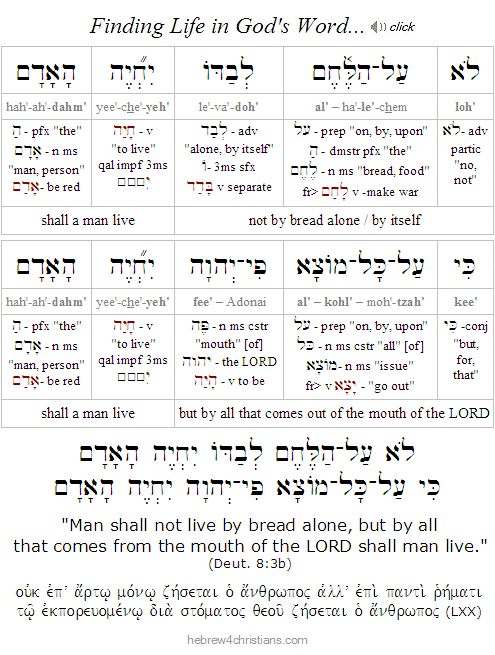 |
Parashat Yitro - יתרו

[ This week's Torah reading (Yitro) includes the account of the giving of the Torah at Sinai... ]
01.16.22 (Shevat 14, 5782) Last week's Torah portion (i.e., Beshalach) recounted how the LORD delivered the children of Israel from Pharaoh's advancing armies by dramatically drowning them in the Sea of Reeds. The Israelites were overjoyed over their new freedom and celebrated by singing the "Song of the Sea." Despite their newfound freedom, however, the people soon began complaining about the hardship of life in the desert. Nonetheless God was gracious and provided fresh water and manna from heaven as he led them by the Pillar of Cloud by day and the Pillar of Fire by night to Mount Sinai (Exod. 13:21-22).
In our Torah portion for this week, parashat Yitro, Moses' remarkable father-in-law Jethro (i.e., "Yitro") heard how God delivered Israel from Egypt and set out from the land of Midian to the desert area of "Rephidim" to meet with Moses. There Moses recounted the great story of the Exodus, telling him all that the LORD had done to Pharaoh and to the Egyptians for Israel's sake. Jethro rejoiced, blessed the LORD, and offered sacrifices which were communally eaten with Moses' brother Aaron and the 70 elders of Israel (Exod. 18:1-12).
After this celebration, Jethro observed how Moses sat every day to judge the people "from morning to evening" and expressed concern that his son-in-law was taking on too much responsibility. Jethro then wisely advised his son-in-law to appoint a hierarchy of magistrates and judges to help him govern the people, thereby freeing Moses to be a more effective prophet and intercessor before the LORD. Jethro's wise counsel helped implement the system of justice that later became the basis of Jewish social law (i.e., the Sanhedrin, etc.).
After the third new moon after leaving Egypt (i.e., the 1st day of the month of Sivan), the Israelites encamped opposite Mount Sinai, the place where Moses was initially commissioned at the "burning thornbush." Moses then ascended the mountain, and there God commanded him to tell the leaders that if they would obey the LORD and keep His covenant, then they would be mamlekhet kohanim ve'goy kadosh -- a "kingdom of priests and a holy nation." After returning down to deliver this message to the elders, the people responded by proclaiming, kol asher diber Adonai na'aseh ("all that the LORD has spoken, we shall do"). Moses then returned to the mountain and was told to command the people to prepare themselves to experience the presence of God upon the mountain in three days.
According to Jewish tradition, on the morning of the "third day" (i.e., the sixth of Sivan, exactly seven weeks (49 days) after the Exodus), all the children of Israel gathered at the foot of Mount Sinai, where the LORD descended amidst thunder, lightning, billowing smoke, fire, and the voluminous blast of the heavenly shofar. The LORD then declared the foundation of moral conduct required of the people, namely, the Ten Commandments, which begins with the words: "I AM" (Exod. 20:2). Because the vision was so overwhelming, the terrified Israelites began beseeching Moses to be their mediator lest they die before the Presence of God. The portion ends as the people stood far off, while Moses alone drew near to the thick darkness where God was (Exod. 20:21).
Hebrew Lesson
Exodus 19:5a Hebrew reading:
Shabbat Shirah - שַׁבַּת שִׁירָה
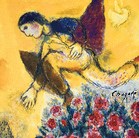
[ The following concerns this week's Torah reading (Beshalach) and the crossing of the sea... ]
01.14.22 (Shevat 12, 5782) Perhaps the central event of this week's Torah portion is how the LORD split the waters of the sea to make a path for His people to escape from Egypt. This event is commemorated in the great "Song the Sea" (i.e., Shirat Hayam: שִׁירַת הַיָּם), a hymn praising God for His deliverance (see Exod. 15:1-21). Because of its critical significance for the Jewish people, the Sabbath on which this song is chanted is called Shabbat Shirah ("Sabbath of the Song"), and the custom is for all the congregation to rise while it is recited...
The Torah states that when the Israelites entered the sea, it became dry land, with the water as "a wall (חוֹמָה) to their right and to their left" (Exod. 14:29). To commemorate this miracle, the Hebrew text of the "Song of the Sea" is stylized to resemble a "wavy wall," with the words written in alternating "blocks" to suggest a wave of water, like this:
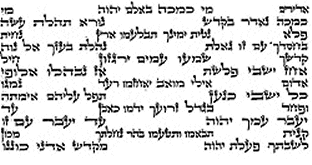 |
The soferim (Torah scribes) count exactly 198 words in this song, which is the numerical value for the word tzchok (צחק), a word that means "laughter" and is the word used to describe Sarah's response when she finally gave birth to Isaac (Gen. 21:6). According to Rabbi Bachya, the laughter in Isaac's name comes from Abraham's joy (Gen. 17:17). The joy of Isaac's birth, then, is linked with the "birth" of the nation of Israel at the time of the Exodus, just as his symbolic death during the Akedah represents Israel's rebirth...
Because it marks deliverance, both the Song of the Sea (i.e., the Song of Moses) as well as the "Song of the Lamb" will be sung in the world to come (Rev. 15:3).
Hebrew Lesson
Revelation 15:3 Hebrew reading (click):
Tu B'Shevat New Year...
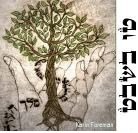
[ Sunday January 16th at sundown begins "Tu B'Shevat" (ט"ו בשבט), or the 15th of the month of Shevat, which marks the traditional date celebrating the "New Year" for Trees... ]
01.14.22 (Shevat 12, 5782) The Bible begins and ends with the great Tree of Life -- first in the orchard of Eden, and later in the midst of the paradise of heaven. "The Tree of Life (i.e., etz ha' chayim: עֵץ הַחַיִּים) was in the midst of the garden..." (Gen. 2:9). "Then the angel showed me the river of the water of life, bright as crystal, flowing from the throne of God and of the Lamb through the middle of the street of the city; also, on either side of the river, the Tree of Life (etz ha-chayim) with its twelve kinds of fruit, yielding its fruit each month" (Rev. 22:1-2). Notice that the "twelve fruits" (καρποὺς δώδεκα) from the Tree of Life are directly linked to the "twelve months" of the Jewish year (κατὰ μῆνα ἕκαστον ἀποδιδοῦν τὸν καρπὸν αὐτοῦ: "each month rendering its fruit"). Twelve months; twelve fruits.... This teaches us that the sequence of the biblical holidays (moedim) was intended to teach us revelation about God. That is why God created the Sun and the Moon for signs and for "appointed times" (Gen. 1:14), as it also says: "He made the moon to mark the appointed times (לְמוֹעֲדִים); the sun knows its time for setting" (Psalm 104:19).
Hebrew Lesson
Psalm 104:19 Hebrew reading (click):
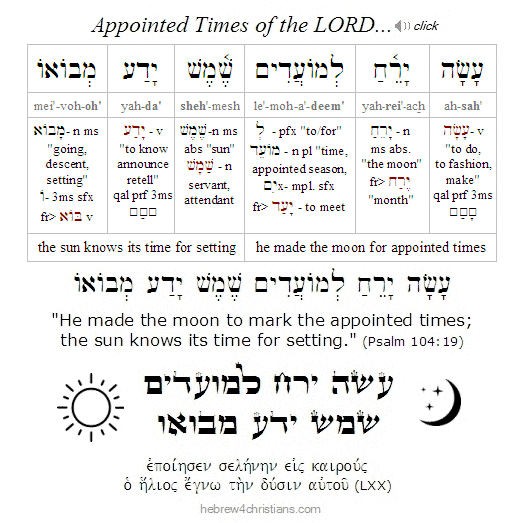 |
The Scriptures state twice: "Take root downward and bear fruit upward" (2 Kings 19:30; Isa. 37:31). As Yeshua said, "unless a grain of wheat falls to the ground and dies, it abides alone; but if it dies, it brings forth much fruit (John 12:24). We pray we might surrender ourselves to the Lord fully, being immersed in His passion, "bearing fruit in every good work (ἐν παντὶ ἔργῳ ἀγαθῷ καρποφοροῦντες) and growing in da'at HaShem (דַעַת אֱלהִים) - the knowledge of God" (Col. 1:10). The "fruit of the righteous is a Tree of Life" lit., etz chayim (עֵץ חַיִּים), literally, "the Tree of lives" (Prov. 11:30). It is the fruit of Yeshua, the Tzaddik of God, the Righteous One, who bears fruits of healing in the lives of those who turn to Him in trust...
The "Tree of Life" (i.e., etz ha'chayim: עֵץ הַחַיִּים) is mentioned ten times in Scripture, corresponding to the "ten words of God" (i.e., the Ten Commandments). In the Torah it first appears in the center of the paradise of Eden (Gen. 2:9; 3:22-4), but it is soon lost to humanity because of Adam's transgression. In the book of Revelation, it reappears in the center of the Paradise of God (Rev. 2:7, 22:2), resurrected on account of the faithful obedience of Yeshua as mankind's "last Adam" (1 Cor. 15:45). Those who have washed their robes by means of His righteousness are given access to this Tree in the heavenly Jerusalem (Rev. 22:14). The paradise lost by Adam has been regained by the greater ben-adam, the Son of Man, Yeshua the Messiah, the Savior of the children of men...
Hebrew Lesson
Prov. 11:30 Hebrew reading (click):
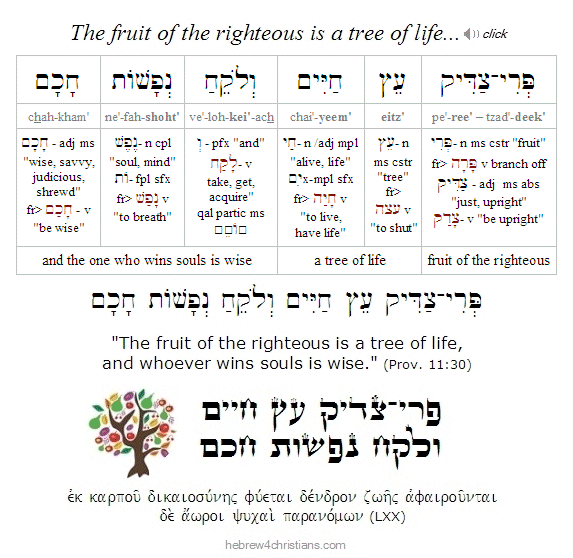 |
The Greater Exodus of Messiah...

[ The following concerns this week's Torah reading (Beshalach) and the Exodus from Egypt... ]
01.13.22 (Shevat 11, 5782) After Yeshua explained to his disciples that he would suffer, be killed, and raised to life (Luke 9:22), he took Peter, James, and John up on a mountain to pray. As Yeshua was praying, he was "transfigured" as his face and clothes becoming dazzlingly bright and radiant. The disciples then saw Moses and Elijah in their glorified state talking with Yeshua - a scene right out of the heavenly places! Notice that the topic of conversation was Yeshua's "departure" (literally, his "Exodus": τὴν ἔξοδον αὐτοῦ) which he would accomplish at Jerusalem (Luke 9:31). This is the great connecting point between the revelation of Torah at Sinai (Moses and the prophets) and the revelation of Torah at Zion (Yeshua as Messiah ben Yosef, the Suffering Servant). At Sinai the great vision was given of the Altar upon which a lamb was offered every day and night (קָרְבָּן תָּמִיד) in commemoration of the Passover in Egypt; at Zion the great vision was the cross of Messiah, upon which the blood of the true Lamb of God would be offered as "Messiah our Passover" (1 Cor. 5:7).
Recall that Yeshua said: "Do not think that I have come to abolish the Law or the Prophets; I have not come to abolish them but to fulfill them. For truly, I say to you, until heaven and earth pass away, not a Yod (י), nor a stroke of a Yod (i.e., kotzo shel yod: קוֹצוֹ שֶׁל יוֹד), shall in any way pass from the Law until all is accomplished" (Matt. 5:17-18). Both the Torah of Moses (תורת משה) and the words of the Hebrew prophets (דברי הנביאים) foretold of the coming of Messiah who would purge Israel from her sins and establish the glory of God before the nations. Yeshua is the central meaning of all true Torah....
The Exodus from Egypt is the central miracle of the Torah because it prophetically tells the story of the redemption of God's people throughout the dispensations. Israel's deliverance from bondage to Pharaoh serves as an allegory of both the salvation promised to Adam and Eve after losing their freedom to Satan as well as the fulfillment of the promises to the Jewish people of the coming Savior of Israel who would establish God's kingdom on the earth. Yeshua is both the Savior of the world as well as Israel's true King and Deliverer.
The great story of God's redemption is revealed on two levels in Scripture - one that concerns the paradise of Eden (the universal level), and the other that concerns the paradise of Israel (the particular level). Therefore Yeshua is both rightly called the "Lamb of God who takes away the sins of the world" (John 1:29) and "the Messiah our Passover Lamb who has been sacrificed for us" (1 Cor. 5:7). Likewise he is both called the "Seed of the woman," and "the Son of David"; he is called the "Second Adam," and the "King of the Jews," and so on.
God's redeeming love was present from the very beginning (Psalm 90:3). The midrash states that Adam was created from the "dust of the Temple." After Adam's transgression, the Tree of Life was "removed from reach" and guarded by cherubim until the blood that spoke a "better thing than the blood of Abel" was offered for the redemption of mankind (Heb. 12:24). This "better thing" was prefigured in many ways in Scripture: through the martyrdom of Abel, through the Akedah of Isaac, through the blood of the lamb that delivered Israel from the angel of death, through the blood sprinkled upon the kapporet ("mercy seat") of the Ark of the Covenant, through the sacrifice of the Red Heifer, and most especially through the sacrificial death of Yeshua upon the Cross at Moriah.... Those who trust in the sacrifice and victorious resurrection of the Messiah are given access to eat of the Tree of Life in the Paradise of God (Rev. 2:7; 22:14).
Yeshua "lifted up" is the antidote to the venom delivered through the serpent's bite (John 3:14-15). "For as in Adam all die, so also in Messiah shall all be made alive" (1 Cor. 15:22). The "new seed" of life given to us in Yeshua makes us into a "new creation" (בְּרִיאָה חֲדָשָׁה) that fully restores the defaced image of God within us: "Just as we have borne the image of the man of dust, we shall also bear the image of the man of heaven" (1 Cor. 15:49).
Hebrew Lesson
Rev. 5:12 Hebrew reading (click):
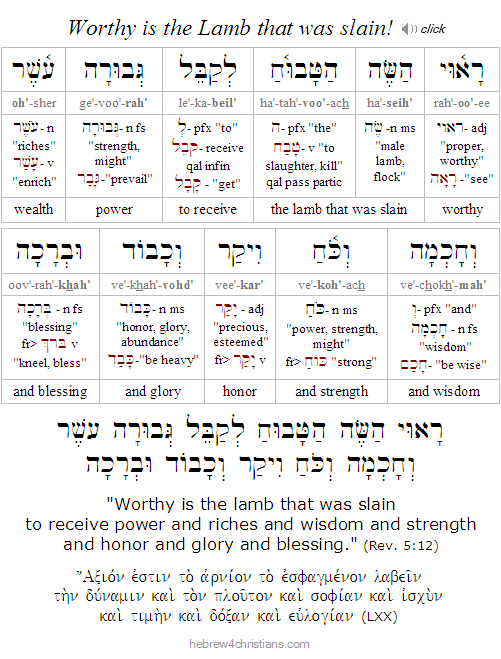 |
Baptism into Moses...

[ The following concerns this week's Torah reading (Beshalach) and the Exodus from Egypt... ]
01.13.22 (Shevat 11, 5782) Egypt represents the world system that enslaves people (the word mitzrayim comes from the word tzur (צוּר), meaning "restriction"). As the ruler of this world, Pharaoh therefore represents Satan, the original serpent who deceived Eve in the orchard. Egypt therefore represents a state of exile (similar to the original exile from Eden), and just as the blood of the lamb applied to the doorposts in Egypt caused the plague of death to pass over, so the blood of Yeshua saves us from the wrath of God and spiritual death. Yeshua said that by nature people were in bondage to the dictates of this world system and its forces and needed to be set free. The Hebrew word for salvation (יְשׁוּעָה) means to be set free from the restrictions of "Egypt" and its forces.
The Apostle Paul likened the crossing of the sea as a metaphor of baptism: "All were baptized into Moses in the cloud and in the sea" (1 Cor. 10:1-2,11). In the New Testament, baptism symbolizes our identification with Yeshua's death, burial, and resurrection (Col. 2:12; Rom. 6:3-5). Some Christian commentators make a strong distinction between these two baptisms (i.e., baptism into Moses and baptism into Messiah), though there are many profound correspondences. For instance, the Israelites were facing death and were therefore at the "end of themselves." They had no other appeal or hope than God's gracious intervention on their behalf (i.e., salvation). Still, they needed to act and move forward. After they took the step of faith, they could see the Shekhinah Glory lighting up the way of deliverance, though this meant being "buried" within the midst of the sea. Their earlier fear of death was replaced with a song of God's great deliverance. The other side of the sea represented new life, the life that comes from above, by the power and agency of the Holy Spirit... The Israelites died to their old life, were symbolically buried in the waters, but rose to new freedom by the grace and power of God... In a way, the crossing of the sea represented a "birth canal" into the realm of true freedom as God's redeemed children.
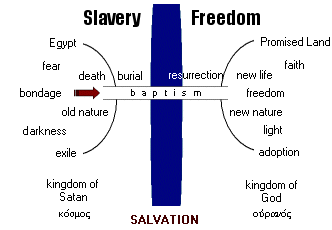 |
Just as the Israelites were made free from the tyranny of Pharaoh when they crossed the Sea - being "baptized into the death of the waters" to be reborn to serve God in freedom – so those who trust in Yeshua are "baptized into His death" and reborn to serve God by the power of the Holy Spirit.
Note that this "baptism into Moses" was not a water baptism, since even though the people went through the water, they crossed over the sea on dry ground... No, it was a baptism or "immersion" into the Shekhinah Cloud, an identification with Moses and his mission (Heb. 11:29). At Sinai Moses would later ascend into the midst of that Cloud to behold the vision of the altar of Messiah (i.e., the Mishkan, or Tabernacle) - a vision that later became a reality during the time of Yeshua's transfiguation before his crucifixion (see Luke 9:28-31). Ultimately baptism is about identifying with the redemptive mission of God through Yeshua our Savior. The meaning of baptism is to be immersed by the Ruach HaKodesh (Holy Spirit) to be made part of the greater redemptive mission of God's people.
Hebrew Lesson
Psalm 34:4 Hebrew reading (click):
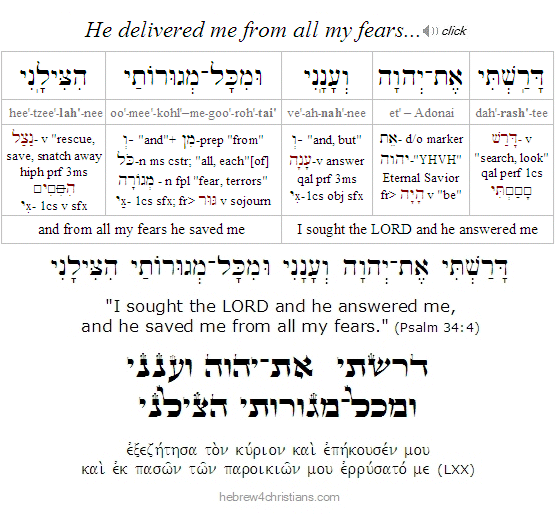 |
Bitterness for Shalom...
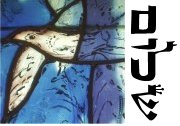
01.13.22 (Shevat 11, 5782) From our Torah portion this week (i.e., parashat Beshalach) we read that when the Israelites came to Marah, "they could not drink the water because it was bitter" (Exod. 15:23). Note that the Hebrew text allows us to read that it was the Israelites themselves who were bitter – ki marim hem (כִּי מָרִים הֵם) – "for they (i.e., the Israelites) were bitter," and their bitterness made the water seem so as well.... After the people complained, God showed Moses a tree and threw it into the water, making it drinkable. Interestingly the Hebrew text literally reads, "the LORD taught him a tree" (וַיּוֹרֵהוּ יְהוָה עֵץ), suggesting elon moreh (אֵלוֹן מוֹרֶה), the "teaching tree of Abraham" (Gen. 12:6). The sages say this tree symbolized Torah, the tree of life (etz chaim), which brings happiness to those who take hold of it (Prov. 3:18), though we see Yeshua, the fallen tree that yields mayim chayim - living water - to revive the hearts of mankind...
Healing the Inner Divide...
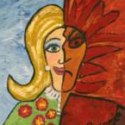
01.13.22 (Shevat 11, 5782) "Out of the same mouth come blessings and curses," and yet is this not the truth of who we are? Do we not often wrestle within our hearts, trying to form the blessing with our lips when our heart wants to curse? We are often vexed; a mess of mixed motives; we are "strong to be made weak, weak to be made strong." And yet, despite all this, despite our inner contradictions, the battle between the "old man" and the "new," this "divided house" of our inner life - both our sorrows, our troubles, our fears, as well our joys, our hopes, and our dreams – we must "endure ourselves," we must press on, and we must never let go of our faith in God's unsurpassing love. Never. Therefore we must not hide from God's presence, nor pretend to be something we are not. We are invited to come boldly before the throne of God's loving grace to receive help in our hour of need (Heb. 4:16). And since we are always in need of Him, may God heal the divide and make us whole...
Hebrew Lesson
Psalm 86:11 Hebrew reading:
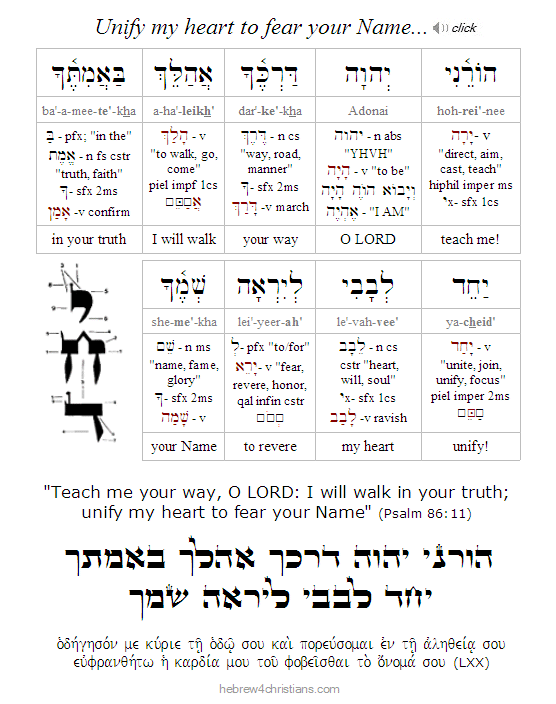 |
Heaven's Alphabet...

[ The following is related to this week's Torah reading, parashat Beshalach... ]
01.12.22 (Shevat 10, 5782) A verse from our Torah portion this week (i.e., Beshalach) contains all the letters of the Hebrew alphabet (i.e., aleph (א), bet (בּ), gimmel (ג), etc.). The special verse reads, "This is what the LORD has commanded: 'Gather of it, each one of you, as much as he can eat. You shall each take an omer (עמֶר), according to the number of the persons that each of you has in his tent'" (Exod. 16:16). Since this refers to the manna the Israelites were to collect for their daily bread, and this verse contains all the letters of the alphabet, we may "poetically" infer that if we immerse ourselves in the Scriptures, "from Aleph (א) to Tav (ת)," God will provide us with the "daily bread" (לֶחֶם חֻקֵּנוּ) we need, just as He did when the bread from heaven (לֶחֶם מִן־הַשָּׁמָיִם) was miraculously given to feed the Israelites in the desert. Therefore Yeshua, who is the Aleph and Tav, taught us to pray, "Give us this day our daily bread," which surely refers to the spiritual food (i.e., encouragement, hope, life) that we receive from the Word of Life (Deut. 8:3; Matt. 4:4).
Yeshua taught us: "Don't be anxious about tomorrow, for tomorrow has its own troubles. Live one day at a time" (Matt. 6:34). It makes no sense to worry about the future if the LORD is the Good Shepherd who tenderly watches over your way (Psalm 23:1). Every day we are given daily bread, but we must remember that manna could not be stored up without becoming rotten (Exod. 16:20). God's provision is "sufficient unto the day...."
Hebrew Lesson
Matt. 6:11 Hebrew reading (click):
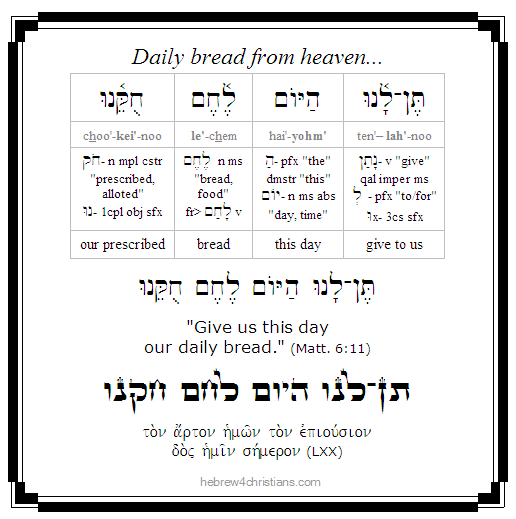 |
Isn't it amazing how studying the Hebrew text reveals further insights into the Scriptures? Kotzo shel yod... And may you rest in the promise: "My God will supply every need of yours - "from A to Z" - according to his riches in glory in Yeshua the Messiah" (Phil. 4:19). He is lechem ha'chaim - the Living Bread from heaven (John 6:51)!
The Fruit of Spirit - פרי הרוח
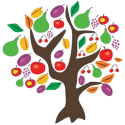
[ Sunday, January 16th at sundown begins "Tu B'Shevat" (ט"ו בשבט), or the 15th of the month of Shevat, which marks the traditional date celebrating the "New Year" for Trees... ]
01.12.22 (Shevat 10, 5782) Traditional Judaism identifies various middot ha-lev (qualities of heart) that attend to a genuinely Jewish life. Among others these include Talmud Torah (studying Scripture), ahavat Adonai (loving God), gemilut chasidim (doing works of compassion), bikkur cholim (visiting the sick), and so on. The follower of Yeshua likewise is intended to evidence middot hav-lev, though the Source for such comes directly from the power of the Ruach Ha-Kodesh (Holy Spirit) working within the heart of faith. The peirot (fruits) listed in Galatians 5:22-23 represent nine visible attributes of a true follower of Yeshua, namely: love (אהבה), joy (שׂמחה), peace (שׁלום), patience (סבלנות), generosity (נדיבות לב), kindness (חסד), faithfulness (נֶאֱמָנוּת), humility (ענוה), and modesty (צְנִיעוּת).
Note that these fruits are not realized through self-effort or attempts at human "reformation," but rather are a supernatural outgrowth of the grace and love of God in the life of one who puts their trust in Yeshua as Savior. They are fruits of the Spirit (פּרי הרוח). See John 15:1-8. Our lives are sanctified in the manner in which they were initially justified: wholly by faith in the love and grace of God...
The tough question we need to ask ourselves is whether our lives give evidence to the power and agency of the Holy Spirit within us. Strictly speaking, these nine attributes are qualities that only God Himself possesses, since He alone is perfectly loving, perfectly joyful, and so on. But since we are created be'tzelem elohim (in the image of God) and were given the Holy Spirit to help us resemble our Teacher (Luke 6:40), spiritual fruit should be seen in our own lives (John 14:12; 15:1-8; 26-7). Obtaining such fruit is invariably a matter of faith - trusting that God will help us live our lives in truthful union with Him.
Let's remember to pray for one another and ask the LORD to make each of us fruitful l'shem shamayim - for the sake of the Name of our beloved One.
Hebrew Lesson
Psalm 46:4 Hebrew reading (click):
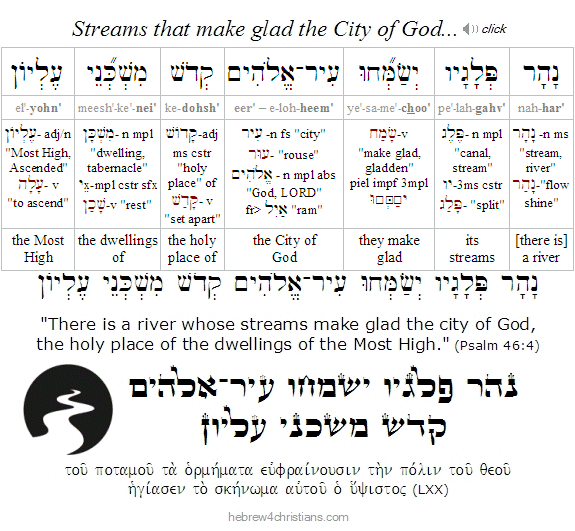 |
Stepping out in Faith...

01.12.22 (Shevat 10, 5782) From our Torah this week (i.e., Beshalach) we read how the children of Israel were trapped before the sea with no way of escape... Moses then cried out to God who told him to march forward -- right into the waters -- as the Pillar of Cloud settled between the people and Pharaoh's advancing army. According to a well-known midrash, when Moses lifted his staff to divide the sea, at first nothing happened. The people waited anxiously at the seashore, wondering what to do. Finally, Nachshon ben Aminadav, a descendant of Judah (Num. 1:7), waded into the water "up to his nose," and then the winds began blowing to divide the waters (Shemot Rabbah). The great miracle of kiryat yam suf (קרית ים סוף)- the splitting of the sea of reeds (the word "suf" means "reed,"see Exod. 2:3) therefore resulted because someone found real courage and took a step of faith: "And the people of Israel went into the midst of the sea on dry ground, the waters being a wall (חוֹמָה) to them on their right hand and on their left" (Exod. 14:22). They marched across the sea all that night (i.e., Nisan 21), under the light of the Shekhinah Glory...
The Talmud says "kasheh le'zavgom ke'kriat yam suf," which means it is more difficult for God to create a marriage than to split the sea. They reason this way because each person needs to take individual action to trust the other. Likewise with God. It is more difficult for God to get us to be in a genuine, trusting relationship with Him than it is for Him to split a sea. Of course the problem is not with God, who is the perfect "husband," but with our adulterous inner nature. It took the LORD a year to deliver Israel from Egypt, but it took Him 40 years to teach Israel to trust in His promises of love. God always awaits our teshuvah - our "answer" - to His invitation before He will reveal more to us. As Yeshua once said to his followers, "I still have many things to say to you, but you cannot bear them now" (John 16:12). Some things about God can only be known by stepping out in faith and surrendering ourselves to Him.
Hebrew Lesson
Psalm 37:5 Hebrew reading (click):
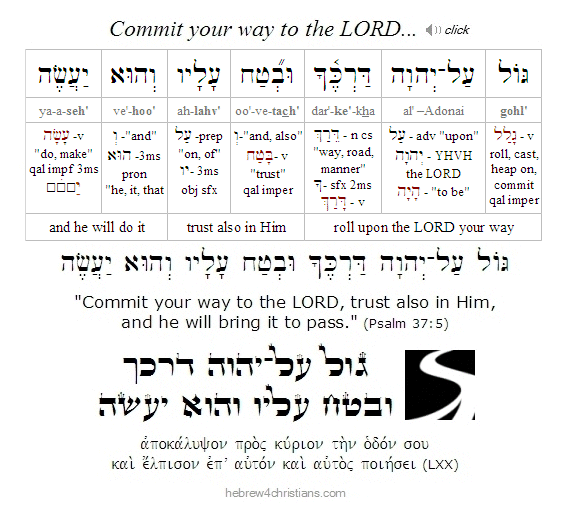 |
Note: For more on this subject, see "Stepping out in Faith..."
Transforming our Minds...
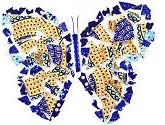
01.12.22 (Shevat 10, 5782) The Scriptures counsel us to be transformed (μεταμορφόω) by "renewing our minds" (Rom. 12:2), though just how we are to do this remains an open question. Our perspectives and attitudes are shaped by our assumptions about life, many of which are "preconscious" or hidden from our awareness. Habitual thoughts, biases, prejudices, fears, etc., all affect (and distort) the way we see and understand reality. In light of this, how can we change? How can we overcome our habitual negativity, misery, and general unhappiness? How do we develop right thinking power? How do we learn to apply our minds to perceive the good, instead of responding in unreflective and negative ways to our circumstances? How do we discipline our will so that "if there is anything worthy of praise, think about these things" (Phil. 4:8)? Surely we cannot transform ourselves, for we are the source of our own impairment; we are the patient who needs the cure....
Healing comes from receiving the light of truth, being "single-minded," with our eyes focused on what is real. "If your eye is "single" (i.e., ἁπλοῦς, sincere, focused)," Yeshua said, "your whole body will be filled with light" (Matt. 6:22). We are to "renew" (ἀνακαινόω) our minds, which means elevating our thinking by focusing on God. Likewise the Torah commands: "You shall be made whole (i.e., tamin: תָּמִים) with the LORD your God" (Deut. 18:13). We are made "whole" or "perfect" (i.e., complete) when we resolutely turn to God for healing of our inner dividedness, as it says: "The Torah of the LORD is perfect (תָּמִים), returning the soul" (Psalm 19:8). And where it is written, "Let us hear end of the matter: Fear God and love his commandments, the text adds: ki zeh kol-ha'adam (כִּי־זֶה כָּל־הָאָדָם), "for this is the whole man," suggesting that those who return will be healed of their double-mindedness (Eccl. 12:13). Ultimately we are made whole when we are united to God in Messiah, for then we are "with the LORD our God" and the Spirit writes Torah within the heart of faith (Jer. 31:33).
Hebrew Lesson
Psalm 19:7 Hebrew reading (click):
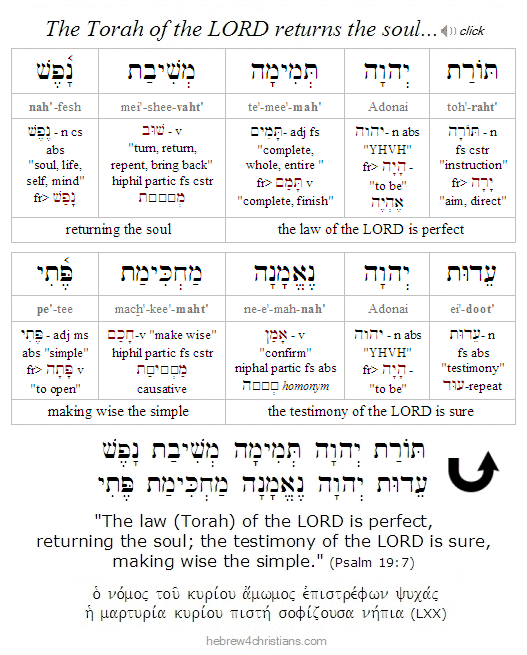 |
The Fruit of our Words...

[ The following is related to Tu B'Shevat, or the "new year" for trees, a holiday that provides opportunity for us to reflect on the idea of fruitfulness and the fruit of the Spirit in our lives... ]
01.11.22 (Shevat 9, 5782) Yeshua said that as a tree is to its fruit, so is a person's heart is to his speech. Our words arise from an underlying source and root: "I tell you, on the Day of Judgment people will give account for every careless word (πᾶν ῥῆμα ἀργὸν) they speak, for by your words you will be justified, and by your words you will be condemned" (Matt. 12:36-37). First note that the phrase translated "every careless word" can be understood as "every 'workless' word," that is, every vain or empty word spoken, every broken promise, every insincere utterance, and so on. Second, note that there is a relationship between naming and being in Hebrew thought, and indeed the Hebrew word davar (דּבר), usually translated as "word," can also mean "thing." This suggests that our words define reality - not in an absolute sense, of course - but in terms of our perspective and attitude, and for that we are held responsible before the LORD. Since our words express our thoughts, Yeshua wants us to make up our minds: "Either make the tree good and its fruit good, or make the tree bad and its fruit bad, for the tree is known by its fruit" (Matt. 12:33).
Listen to the words of your heart and understand that they are devarim (דְּבָרִים) "things" that are defining the course of your life right now. Our thoughts and words "exhale" the breath of God that was given to each of us. In a very real sense they serve as "prayers" we are constantly offering.... And may it please our gracious and long-suffering LORD to answer the cry of our heart: "Let the words of my mouth and the meditation of my heart be acceptable in your sight, O LORD, my Rock and my Redeemer." Amen.
יהיו לרצון אמרי־פי
והגיון לבי לפניך יהוה צורי וגאלי
yee·yoo · le·rah·tzon · eem·rei - fee
ve·heg·yohn · lee·bee · le·fah·ney'·kha · Adonai · tzoo·ree · ve·go·a·lee

"Let the words of my mouth and the meditation of my heart
be acceptable to You, O LORD, my Rock and my Redeemer."
(Psalm 19:14)

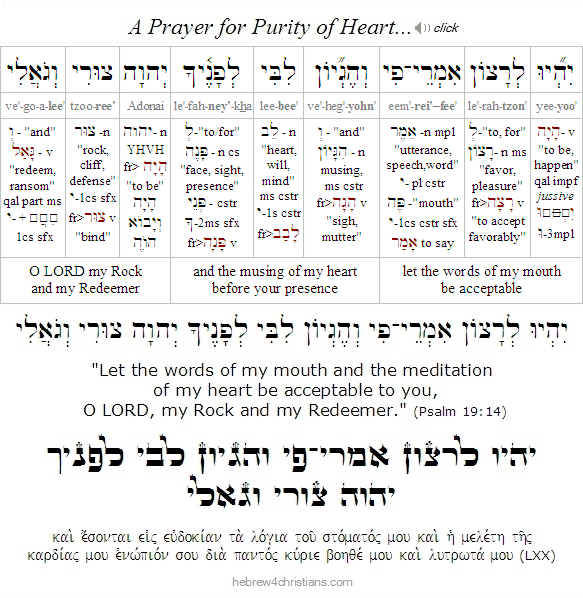
Safe in God's Love...

01.11.22 (Shevat 9, 5782) "Fear not, for I am with you..." אַל־תִּירָא כִּי עִמְּךָ־אָנִי. What we need most of all is right here, present in this hour, whether we're conscious of it or not. God is with you, even if you feel alone, lost in darkness, unclean, afraid... "Dear Lord Jesus, I don't know who I am, I don't know where I am, and I don't know what I am, but please love me" (prayer of a sufferer from Alzheimer's disease). That's what we need most, to trust that we are safe in God's love, and that's the ultimate message of our atonement in Messiah.
Hebrew Lesson
Isa. 41:10a Hebrew reading (click):
The Blessing of Torah...

01.10.22 (Shevat 8, 5782) God is not the "author of confusion," and that means that rational intelligibility is foundational to divine revelation. "The Torah was written in the language of men," which is to say, it expresses ideas people can understand. The Scriptures declare: "Blessed is the man who ... delights in the Torah of the LORD (בְּתוֹרַת יְהוָה); all that he does shall prosper" (Psalm 1:1-3). And while it is true that we are no longer 'under' the terms of the covenant given at Sinai (Rom. 3:23), we still delight 'in' the Torah and meditate on its precepts day and night (Psalm 1:2; 19:8; 119:15, 47, 97; Neh. 8:12, etc.). After all, Torah "written upon the heart" is a mark of the New Covenant believer (Jer. 31:31-33). As it is written in Proverbs: "If you seek it [i.e., the wisdom revealed in the Torah] like silver and search for it as for hidden treasures, then you will understand the fear of the LORD and find the knowledge of God" (Prov. 2:4-5). If worldly men seek money and riches for life in this world, should we be less earnest in our pursuit of true and eternal riches?
Furthermore, where it is written, "all Scripture is breathed out by God (θεόπνευστος) and is profitable for teaching, for reproof, for correction, and for training in righteousness, that the man of God may be complete, equipped for every good work" (2 Tim 3:16-17), it is evident that the Scriptures referred to here are the Jewish Scriptures (i.e., the Torah, the Prophets, and the Writings), since they are the foundation, the context, and the overarching matrix for the later New Covenant revelation... These were the Scriptures Yeshua used to contextualize and explain his ministry to his followers: "And beginning with Moses and all the Prophets, he interpreted to them in all the Scriptures the things concerning himself" (Luke 24:27; John 1:45). In other words, the Torah has both a logical, a linguistic, and a theological priority regarding our understanding of the New Testament Scriptures, and the failure to read in context invariably leads to faulty interpretations and doctrinal errors of various kinds. "To the Jew first, and [then] to the Greek" (Rom. 1:16) is a principle not only of how the gospel message would transcend ethnic Israel to be offered to all the nations, but also about how we should approach the practice of Biblical interpretation.... This much is axiomatic: God "breathed out" (θεόπνευστος) his revelation in order, and the message itself must be understood in light of that order (John 4:22).
Hebrew Lesson
Proverbs 3:18 Hebrew reading (click):
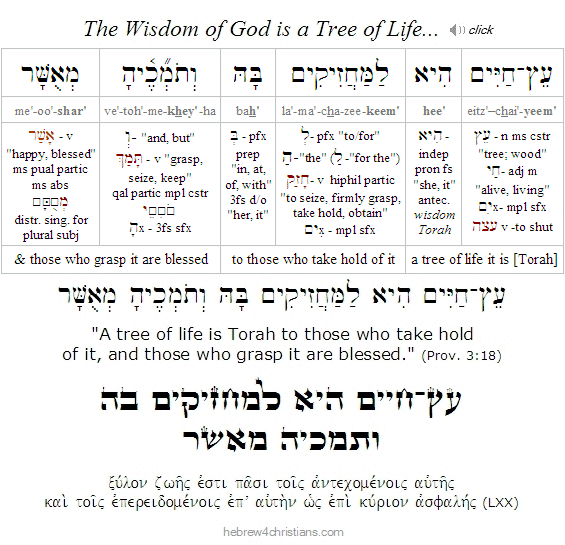 |
Believing and Seeing....

01.10.22 (Shevat 8, 5782) This week's Torah portion (parashat Beshalach) contains some of the most dramatic episodes recorded in all of the Scriptures. Here we read about the great exodus of the Israelites on the day of Passover and Pharaoh's last-ditch pursuit of the Hebrew slaves. We read how the Shekhinah Glory held back Pharaoh's army, how the LORD split the Sea of Reeds so that the Israelites could safely pass through the waters, and how Pharaoh's forces were all drowned in the sea. We further read how God personally led the Israelites into the desert and sustained them by transforming "bitter water" into sweet water, sending manna from heaven, and providing a miraculous water source from the rock that Moses struck. Yet despite all the miracles and wonders performed on behalf of the Israelites, the people inexplicably seemed to "forget" about their miraculous redemption. Indeed, it was just a few days after the awe-inspiring deliverance from Egypt that the people began to murmur, complain, and kvetch. The sorry state of the Israelites was so bad that the Midrash Rabbah plaintively wonders how it was possible that the Israelites could have so quickly forgotten all of God's miracles performed on their behalf...
The story of the disgruntled Israelites teaches us that miracles are never enough to sustain our faith. Seeing isn't believing, but rather the other way around.... This explains why those church groups that emphasize "signs and wonders" often contain so many exhausted people. Miracles are insufficient for faith; people get excited about them while they occur, but they soon forget them and return to a state of desperation and despair. Necessarily the cycle must repeat itself, with ever-increasing claims of the miraculous, in order to keep the illusion alive.... In light of this, it is wise to consider that the passion for "signs and wonders" may be little more than a counterfeit of the duty to serve God. After all, truly loving the LORD with all your heart, with all your soul, and with all your strength is the goal of faith. A genuine heart of faith, then, is a miracle of a greater kind than that of splitting the Sea of Reeds.
Regarding the case of the redeemed Israelites, what has struck some commentators is not so much the incredible signs and wonders that the LORD performed on behalf of Israel, but rather the people's persistent inability or unwillingness to believe... Some of the Jewish sages have gone so far as to say that the entire Jewish Bible may be read as a book about God's apparent inability to teach the Jewish people how to be grateful. The same certainly can be said about many professing Christians today.
It must be stressed that lasting transformation of the heart comes from "following" the LORD God of Israel. Yeshua is our Teacher. As I've mentioned elsewhere, disciples of Yeshua are called talmidim (תַּלְמִידִים) -- a word that comes from lamad (לָמַד) meaning "to learn" (the Hebrew word for teacher is melamad (מְלַמֵּד) from the same root). In the Greek New Testament, the word for "disciple" is μαθητής (the word "math" comes from this), that is, a pupil of a διδάσκαλος, or a teacher. In other words, disciples of Yeshua are automatically "enrolled" in the school of truth, which is also a "school of suffering" (Col. 1:24). In the Torah the "daily sacrifice," or korban tamid (קָרְבַּן תָּמִיד), was offered to the LORD every morning and evening upon the altar, which corresponds to being a "living sacrifice" (i.e., korban chai: קָרְבָּן חַי) to the LORD (Rom. 12:1-2). We must take up our cross daily (Luke 9:23). Yeshua plainly said: "For this purpose I was born and for this purpose I have come into the world -- to bear witness to the truth. All who are of the truth listen to my voice" (John 18:37). It is hard to imagine a follower of Yeshua who does not love, study, and value the truth...
Hebrew Lesson
Proverbs 4:7 Hebrew reading (click):
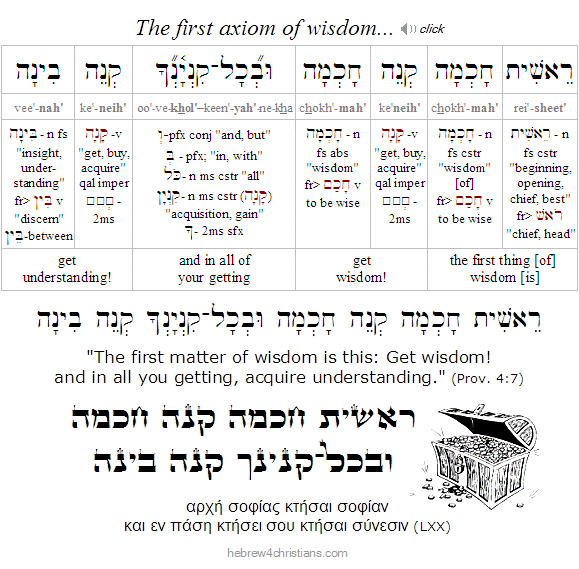 |
The Hebrew word for education is chinukh (חִנּוּךְ), a word that shares the same root as the word for "dedication" (i.e., chanukah: חֲנֻכָּה). True education of the Scriptures is therefore foundational to being a student of the Messiah. We are called to "rightly divide" (ὀρθοτομέω, lit. "cut straight") the "word of truth (2 Tim. 2:15). Among other things, then, following Yeshua means becoming a student of the Jewish Scriptures that He loved and fulfilled (Matt. 5:17-18; Luke 24:44-45). Only after learning from Yeshua as your Teacher will you be equipped to "go to all the nations and teach" others (Matt. 28:19). This is accomplished not merely by explaining (propositional) doctrine but by kiddush HaShem -- sanctifying the LORD in our lives (1 Pet. 1:15-16). As the sages noted long ago: "Upon three things the world does stand: upon the Torah (truth), upon worship, and upon acts of lovingkindness" (Avot 1:2). We are a "living letter" sent to the world to be "read" (2 Cor. 3:2-3).
It has been said that it was easier for the LORD to get Israel out of Egypt than it was for Him to get Egypt out of Israel... The LORD knew the process would be an arduous one, requiring 40 long years of study in the desert under the instruction of Moses, and yet despite all this the people "were unable to enter because of unbelief" (Heb. 3:19; 4:11; Psalm 95:7-11). This is a truly sobering warning, and we are encouraged to open our hearts to the miracle of God's love for us. "Today, if you hear His voice, do not harden your hearts." May it please God to help us make a new commitment to study and to live the truth of the Torah and Scriptures for the glory of His Name. Amen.
Parashat Beshalach - בשלח

[ In our Torah portion this week, the Lord divided the waters of the sea to make a path for the Israelites, a miracle that symbolized newness of life as God's liberated people... ]
01.09.22 (Shevat 7, 5782) Last week's Torah portion (i.e., parashat Bo) described how the Israelites were finally released from Egypt after God delivered the final plague during the time of Passover. In this week's portion (parashat Beshalach), the Israelites begin their journey home, after 430 years of troubled exile. Instead of leading them along a direct route to the Promised Land, however, God directed them south, toward the desert, where the Glory of God appeared as a Pillar of Cloud by day and as a Pillar of Fire by night to lead them on their way. When Pharaoh heard that the Israelites were at the border of the desert, however, he perversely decided to pursue them and bring them back to Egypt. God then redirected the Israelites to camp near the edge of the Sea of Reeds, where the Egyptian army finally caught up with them. Dramatically, the Israelites were caught between the vast sea on one side, and Pharaoh's formidable army on the other!
The terrified people then began to blame Moses for their predicament. Moses reassured them of God's final deliverance and raised his staff to miraculously divide the waters of the sea. All that night the Shekhinah Glory enshrouded the Egyptian army but gave light to Israel as the people crossed through the sea on dry ground. Just before dawn, the dark pillar of cloud that veiled the Egyptian army lifted, and the soldiers immediately rushed after the Israelites into pathway of the sea. God then told Moses to lift his staff again so that the waters would overwhelm the Egyptians with their chariots and horsemen. By the time dawn arrived, the Israelites saw the dead bodies of Pharaoh's army lining the seashore.
Moses and Miriam then led the people of Israel in a spontaneous hymn of thanks and praise to God for their complete deliverance from Pharaoh, which is often called the "Song of the Sea" (i.e., shirah hayam). The song begins, "The Lord is my strength and song, and he is become my salvation" / עָזִּי וְזִמְרָת יָהּ וַיְהִי־לִי לִישׁוּעָה (Exod. 15:2, cp. Isa. 12:2). For Orthodox Jews, singing Shirat Hayam every day is thought to fulfill the biblical commandment to "remember the day of your departure from the land of Egypt as long as you live" (Deut. 16:3). Note that Shirat Hayam is also sung on the 7th day of Passover, as a memorial of the deliverance by God through the waters of the Sea of Reeds.
 |
The great message of our deliverance resounds throughout Jewish history, and indeed it is regarded as a theme of the faithful love of LORD for His people:
Hebrew Lesson
Isaiah 12:2 Hebrew reading (click):
After their jubilation, the narrative resumes as God led the people away from the sea, into the desert of Sin (מִדְבַּר־סִין), a desolate region about midway to Mount Sinai. After traveling three days without finding any water, however, the people complained and God provided them with fresh water at Marah. Awhile later, the matzah (unleavened bread) the people had brought with them ran out and God tested their obedience by giving them "bread from heaven" (i.e., manna). The portion ends with the Amalekites' surprise attack of Israel at Rephidim, near Mount Sinai, and the selection of Joshua as the leader of the army of Israel.
Shabbat Shirat Hayam...

[ The following is related to this week's Torah reading, parashat Beshalach... ]
01.09.22 (Shevat 7, 5782) The Torah reading for this week (i.e., Beshlach) includes the famous Shirat Hayam (שִׁירַת הַיָּם), the "Song the Sea," a hymn of praise the Israelites sang to the LORD after they miraculously crossed the Sea of Reeds (i.e., Yam Suf: יָם סּוּף). Shirat Hayam is also traditionally sung on the 7th day of Passover (i.e., on Nisan 21) since it was first sung seven days after the people left Egypt during the time of the Exodus. When the Temple stood in Jerusalem, Shirat Hayam was sung every day by the Levites during the minchah (afternoon) offering. After the Temple was destroyed, however, the song was incorporated into the shacharit (morning) service of synagogues (i.e., "Mi Chamocha," etc.) to fulfill the Torah's commandment to "remember the day of your departure from the land of Egypt all the days of your life" (Deut. 16:3).
Today the Sabbath on which parashat Beshalach is recited is called Shabbat Shirah Hayam and the congregation rises when the song is chanted:
אָשִׁירָה לַיהוה כִּי־גָאה גָּאָה
סוּס וְרכְבוֹ רָמָה בַיָּם׃
עָזִּי וְזִמְרָת יָהּ וַיְהִי־לִי לִישׁוּעָה
זֶה אֵלִי וְאַנְוֵהוּ אֱלהֵי אָבִי וַאֲרמְמֶנְהוּ׃
יהוה אִישׁ מִלְחָמָה יהוה שְׁמוֹ׃
ah·shee'·rah · la-Adonai · kee-ga'·oh · ga'·ah
soos · ve·roh·khe·voh · rah·mah · ba·yahm.
oh·zee · ve·zeem·raht · Yah · va·hee-lee · lee·shoo·ah
zeh · ei·lee · ve·an·ve'·hoo · e·loh·hei · ah·vee · va·a·roh·me'·noo.
Adonai · eesh · meel·chah·mah · Adonai she·moh.

"I will sing to Adonai, for he has triumphed gloriously;
the horse and his rider he has thrown into the sea.
Yah is my strength and my song, and he has become my salvation;
this is my God, and I will enshrine Him, my father's God, and I will exalt him.
The LORD is a warrior; the LORD is his Name." (Exod. 15:1-3)

Download Study Card
Notice that the Hebrew text is stylized in a special way according to soferut (scribal) tradition. The Talmud (Megillah 16b) states that Shirat Hayam must be written in the form of "a half brick over a whole brick, and a whole brick over a half brick," that is, with alternating half-lines, to resemble "building a house."
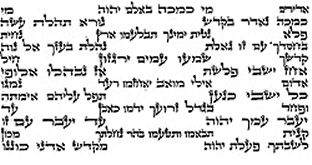 |
According to Yalkut Me'am Lo'ez, the alternating "bricks" are intended to resemble waves of water, while the blank spaces separating these (i.e., text blocks) suggest "blank spaces in our knowledge and praise of God" which we are encouraged to add to the "building." The sages count exactly 198 words in this song, which is the numerical value for the word tzchok (צחק), a word that means "laughter" and is the word used to describe Sarah's response when she finally gave birth to Isaac (Gen. 21:6). According to Rabbi Bachya, the laughter in Isaac's name comes from Abraham's joy (Gen. 17:17). The joy of Isaac's birth, then, is linked with the "birth" of the nation of Israel at the time of the Exodus, just as his symbolic death during the Akedah represents Israel's rebirth...
It is also noteworthy to remember that the Lord Yeshua was the One who saved Israel on that very day. He is the Angel of the LORD and YHVH the Redeemer, as Moses likewise stated: וַיּוֹשַׁע יהוה בַּיּוֹם הַהוּא אֶת־יִשְׂרָאֵל מִיַּד מִצְרָיִם / "On that day, the LORD saved Israel from the hand of the Egyptians" (Exod. 14:30).
It's been said that all the signs and wonders performed during the Exodus served two purposes: 1) to convince the Egyptians of the greatness of God, and 2) to convince the Israelites of the same thing... An even greater blessing, however, is to trust in the LORD without the need for signs and wonders (John 20:29). May the LORD God of Israel help us live by true bittachon (בִּטָּחוֹן) - trusting in Him and rejoicing in His salvation. Amen.
Hebrew Lesson
Exodus 15:11 Hebrew reading (click):
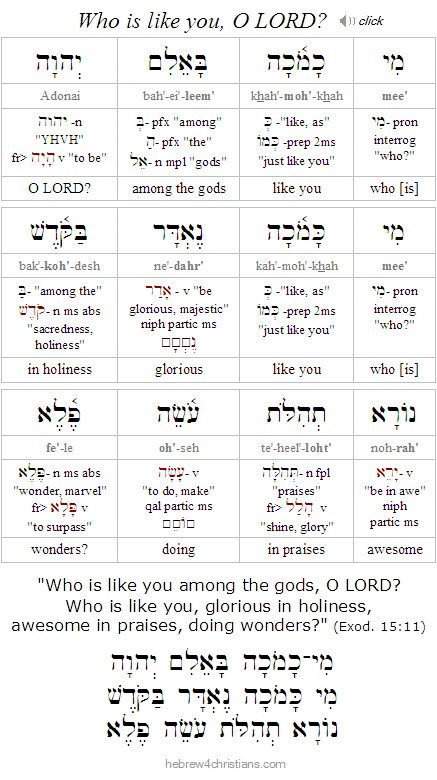 |
Freedom and Fear...

01.07.22 (Shevat 5, 5782) Those who surrender every breath and moment of their lives to God, abiding in the refuge of the Eternal, are set free from common fears. The world is crucified to them; they are no longer swayed by the praises or threats of men, but seek only to know and honor the LORD in all their ways... As it says, "The fear of the LORD is a fountain of life, to depart from the snares of death."
יראת יהוה מקור חיים
לסור ממקשׁי מות
yeer·at · Adonai · me·kohr · chai·yeem
lah·soor · mee·moh·ke·shei · mah'·vet

"The fear of the LORD is a fountain of life,
to turn away from the snares of death."
(Prov. 14:27)

The fear of the LORD, or "yirat Adonai" (יִרְאַת יְהוָה), is reverential wonder over the sacredness of our lives; it is an apprehension of the infinite value of who were are and what we do... It is a holy hush of the heart, an immense respect for the glory and sanctity of life, and an abiding sense of awe over the worth, beauty, and overmastering glory of God. The fear of the LORD is life-affirming and healing, turning us away from the snares of death...
God is ever-present and leads us to the way back home: "Now to the One who is able to keep you from falling, and to cause you to stand, rejoicing, without blemish before His glorious presence, to the only God our Savior, be glory majesty, power, and authority, before all time, and now, and for all eternity. Amen" (Jude 1:24-25). Shabbat Shalom and great peace, love, and happiness to you all...
As Sheep to the Slaughter...

01.07.22 (Shevat 5, 5782) In this present world it's a struggle not to be afraid... We see through a glass darkly; our heart's desire is often thwarted; we often walk in uncertainty; our prayers may seem to go unanswered. There are many tribulations, sorrows, and pains; we are grieved and often feel lonely; we sometimes struggle to hold fast to our confession and hope; we feel alarmed over the insanity and depravity that pervades the culture around us; we feel powerless to stop the juggernaut of unrestrained evil, yea, we lament over the battle within our own hearts -- our own inner fears, outrage, and wretchedness.
We may wonder why God does not directly intervene to help in the midst of our plight; we may pray anguished prayers beseeching heaven's intervention to deliver us from evil. Many of our brothers and sisters around the world are undergoing persecution, being murdered for the sake of their faith; others languish in prison or "reeducation" camps, being labeled as "enemies of the State," brutalized, ostracized, marginalized, rejected, and forsaken of the common welfare of others. We shed tears over the burning of churches; we are repulsed by acts of violence against God's people; we protest that Christians are regarded as political enemies for honestly questioning the logic and veracity of governmental mandates. We are often misunderstood, or worse, vilified for honoring the truth. We are made outsiders, segregated outside the camp, maligned as lepers and deplorables... Indeed, the world system hates us, and for the sake of our faith "we are being killed all the day long; we are regarded as sheep to be slaughtered" (Psalm 44:22; Rom. 8:36).
So where is God in the midst of our alienation and tribulation? As followers of Yeshua we are called to walk in the truth, to do justice, and to walk humbly with our God. More: we are to die to ourselves, love our enemies, and be faithful to God even in martyrdom. In these darkened days, however, this means walking through the the darkness of the valley of the shadow of death, for it is apparent that worldly culture has decisively rejected the truth of God and regards those who esteem it as its enemies. "The kings of the earth set themselves, and the rulers take counsel against the Lord, and against his Messiah, saying 'Let us break their bonds apart and cast away their cords from us'" (Psalm 2:3-4). Prophetically, we know what is on the horizon; we foresee the terrors of the "End of Days."
The test of faith in our circumstances, as has always been for God's people, is to remain steadfast in our conviction of God's love despite the darkness that surrounds us (Isa. 50:10). The test is summed up by C.S. Lewis this way: "We're not doubting that God will do the best for us; we're wondering how painful the best will turn out to be" (Collected Letters). We can't stay in the limbo of such questioning forever, however; we must shake off our misgivings and find settled determination to press on in faith: Our Lord has a crown and a kingdom prepared for us, and he will give us what we need in the way to attain unto it.
There is a difference between knowing about God in your head and knowing God in your heart... Unlike a merely intellectual idea of faith that passively assents to theological propositions or creeds, trusting in the Lord (i.e., bittachon: בִּטָחוֹן) is an emotional commitment to God's presence in the midst of the sorrows of our lives; it is the struggle of hope that affirms we are not truly alone, abandoned, helpless... Trust goes beyond the "head knowledge" to engage God personally, existentially, and from within the whirlwind of harrowing pain and pain's fearful loneliness. Authentic theology is "dialogical" -- a conversation of the heart with God - seeking, yearning, protesting, lamenting, and struggling with life's inscrutabilities and unfathomable questions as it appeals to God for the assurance and comfort of the Holy Spirit. Trust finds courage to voice to our sorrow and fears, inviting God into the midst of our brokenness, often yielding to tearful silence in unknowing expectation. As Dorothy Soelle wrote: "Prayer is an all-encompassing act by which people transcend the mute God of an apathetically endured reality and go over to the speaking God of a reality experience with feeling in pain and happiness" (Soelle: Suffering). This is perhaps the deepest meaning of the Shema - to listen for God's heart in the midst of your struggle; learning to encounter God's love in the place of your brokenness and need (Job 13:15).
Hebrew Lesson:
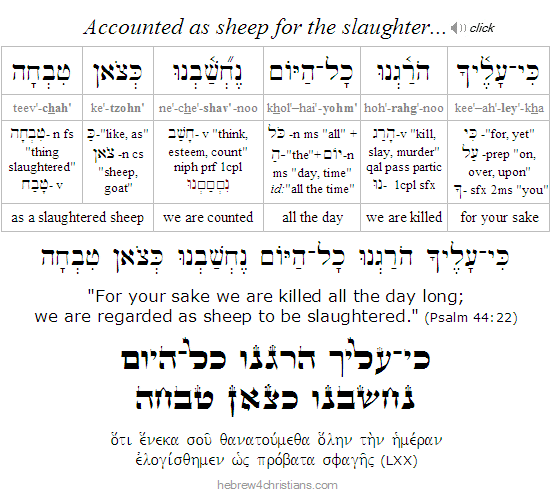 |
Reflecting on the role of suffering in the heart of faith, Dietrich Bonhoeffer (1906-1945) - who was murdered by the Nazis - once wrote: "Here is the decisive difference between Christianity and all religions. Man's religiosity makes him look in his distress to the power of God in the world: God is the deus ex machina [i.e., "quick fix"]. The Bible [on the other hand] directs man to God's powerlessness and suffering: only a suffering God can help" (Letters and Papers from Prison). Bonhoeffer's comment alludes to the difference between an "Elohim" (אֱלהִים) conception of God as the omnipotent power and Judge of reality, and the "YHVH" (יהוה) conception of God as the compassion Source and Breath of life - the Suffering God who empties himself to partake of our condition - to know our pain, to bear our sorrows, to heal us from the sickness of spiritual death, and to touch us in the loneliness of our exile... The Spirit enables us to "groan" in compassion, directing us away from the impulse to "kill the pain" to accept it as part of our lament and need for connection with God.
Heaven's Love Story...

01.07.22 (Shevat 5, 5782) The Scriptures reveal that ultimate reality is a divine love story with a "happy ending," despite the struggles we face in this world. We see this in connection with the great deliverance of the Passover, when we read the story of our redemption in the Torah, summarized in a special book called a "haggadah." Note that the Hebrew word "haggadah" (הַגָּדָה) means "retelling," which of course refers to the story of our journey from slavery to freedom by the hand of God's love. With regard to the sanctity of this story, the Torah commands us: "You shall tell (i.e., ve'higadta: וְהִגַּדְתָּ, from which "haggadah" comes) your child on that day, 'It is because of what the LORD did for me when I came out of Egypt.' And it shall be to you as a sign on your hand and as a memorial between your eyes, that the Torah of the LORD may be in your mouth. For with a strong hand the LORD has brought you out of Egypt" (Exod. 13:8-8). The sages note that the numeric value of the word "haggadah" (הַגָּדָה) is the same as the word for "good" (i.e., tov: טוֹב), which again indicates that the story of our redemption in the Messiah is truly good – indeed, the greatest story ever told...
מָה־אָשִׁיב לַיהוָה כָּל־תַּגְמוּלוֹהִי עָלָי
כּוֹס־יְשׁוּעוֹת אֶשָּׂא וּבְשֵׁם יְהוָה אֶקְרָא
mah-ah·sheev · la'donai · kohl-tahg·moo·loh'·hee · ah·lai?
kohs-ye·shoo·oht · es·sa · oov·shem · Adonai · ek·ra

"What shall I render to the LORD for all his benefits to me?
I will take the cup of salvation, and call upon the name of the LORD."
(Psalm 116:12-13)

Hebrew Lesson
Psalm 116:12-13 Hebrew reading (click):
Teshuvah of Brokenness...
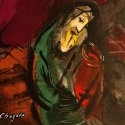
01.07.22 (Shevat 5, 5782) Regarding the call to do teshuvah (i.e., repentance) the LORD appeals: "Come back to me with all your heart (בְּכָל־לְבַבְכֶם) - with fasting, with weeping, and with mourning - and rend your hearts and not your garments, and return to the LORD your God (וְשׁוּבוּ אֶל־יְהוָה אֱלהֵיכֶם), for he is gracious and merciful, slow to anger, and abounding in love..." (Joel 2:13).
Genuine teshuvah (repentance) is not about the "outer layers" of life, but engages the deepest depths of heart; it is not expressed in religious practices or rituals but in personal brokenness and utter desperation... As King David said, "the sacrifices of God are a broken spirit (רוּחַ נִשְׁבָּרָה); a broken and contrite heart (לֵב־נִשְׁבָּר וְנִדְכֶּה), O God, you will not despise" (Psalm 51:17). And as is written in the Haftarah for Shabbat Shuvah: "Return O Israel (שׁוּבָה יִשְׂרָאֵל), to the LORD your God, for you have stumbled because of your iniquity; take with you words and return to the LORD (וְשׁוּבוּ אֶל־יְהוָה) and say to him, 'Take away all iniquity; accept what is good, and we will pay with bulls the vows of our lips'" (Hos. 14:1-2).
Note that the appeal to the LORD as "gracious and merciful, slow to anger, and abounding in steadfast love" (חַנּוּן וְרַחוּם הוּא אֶרֶךְ אַפַּיִם וְרַב־חֶסֶד) recalls the meaning of YHVH (יהוה) revealed to Moses in his state of brokenness over the sin of the Golden Calf (Exod. 34:6-7).
Hebrew Lesson:
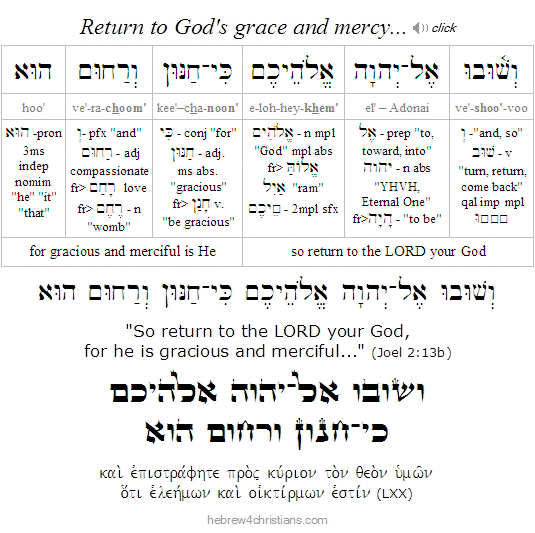 |
Sequence of the Plagues...

01.07.22 (Shevat 5, 5782) In parashat Bo we arrive at the successful conclusion of the LORD's campaign to free Israel from bondage in Egypt. Immediately following the description of ninth plague (i.e., the plague of darkness), redemption through the sacrifice of the Passover lamb (קָרְבָּן פֶּסַה) is explained. The Jewish people were saved by the blood of the lamb, just as today we call upon Yeshua as the Lamb of God. Notice that the word בּא ("go") and פרעה ("Pharoah") together equal the gematria of משׁיח ("mashiach"), providing a hint of the coming Messianic redemption that was foreshadowed in Egypt. Every jot and tittle...
Regarding the sequence of the plagues, Rabbi Bechaye (11th century, Spain) wrote that they followed one another over a twelve-month period. On Nisan 15 God spoke to Moses from the burning bush and commissioned him to go to Pharaoh. On Nisan 21, Moses told his father-in-law Yitro (Jethro) of his mission and left for Egypt. Near the end of the month of Nisan, Moses immediately went before Pharaoh and warned him to release the Jews. For the next three months (Iyyar, Sivan, and Tammuz), Moses went into hiding and instructed the elders of Israel regarding their coming deliverance. The plague of blood began on the first of Av and lasted seven days. A respite of three weeks occurred before the next plague (frogs). This was the pattern for all the ten plagues (i.e., roughly a plague a month). The last plague - that of the death of the firstborn - occurred in the month of Nisan, a year after Moses first warned Pharaoh (Exod. 4:22-23). The period of the plagues therefore totaled twelve full months, at least according to Jewish tradition (Tzenah Urenah):
- Av 1 - Blood (i.e., dam: דָם)
- Elul 1 - Frogs (i.e., tzefarde'a: צְּפַרְדֵּעַ)
- Tishri 1 - Lice (i.e., kinim: כִּנִּים)
- Cheshvan 1 - Swarms (i.e., arov: עָרוֹב)
- Kislev 1 - Pestilence (i.e., dever: דֶּבֶר)
- Tevet 1 - Boils (i.e., shechin: שְׁחִין)
- Shevat 1 - Hail and Fire (i.e., barad: בָּרָד)
- Adar 1 - Locusts (i.e., arbeh: אַרְבֶּה)
- Nisan 1 - Darkness (i.e., choshekh: חוֹשֶך)
- Nisan 15 - Death of the firstborn (i.e., makat bechorim: מַכַּת בְּכוֹרוֹת)
Here is a simplified diagram of the sequence given in the midrash:
Note: For more see "The Sequence of the Plagues: Further thoughts on parashat Bo."
The Meaning of Passover...
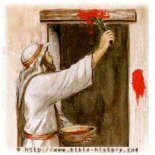
[ The following is related to this week's Torah reading (Bo) and the story of yetziat mitzrayim, the great Exodus from Egypt.... Please read the Torah portion to "find your place" here. ]
01.07.22 (Shevat 5, 5782) In our Torah portion this week (i.e., parashat Bo) we read about the institution of the Passover and the final terrible plague that was to befall the Egyptians on the Passover night. When we think of this time, we may imagine God "passing over" those houses that had the blood of the lamb smeared on their doorposts, though it might better be said that God passed into the homes of those who trusted him, while he withdrew His Presence from those that did not...
To see this note that two different words are used that can be translated as "pass over." First, God said, "I will pass over (i.e., avar: עֲבַר) the land of Egypt that night, and I will strike all the firstborn in the land of Egypt, both man and beast; and on all the gods of Egypt I will execute judgments; I am the LORD" (Exod. 12:12). But directly after saying this, God promised to "pass over" (i.e., pasach: פָּסַח) the homes of those who trusted in him to impart his protection from the plague of death: "The blood shall be a sign for you, on the houses where you are. And when I see the blood, I will pass over to you (lit. עֲלֵכֶם, 'upon you'), and no plague will befall you to destroy you, when I strike the land of Egypt" (Exod. 12:13). In other words, when God would see the blood of the Passover lamb, he would pass over to enter the house and "cover" its occupants from the judgment of death.
The blood of the Passover lamb sheltered people from the plague of death by atoning for their sin by means of a substitutionary sacrifice. The Torah states that "the life (i.e., nefesh: נֶפֶשׁ, or 'soul') of the flesh is in the blood" (Lev. 17:11), and therefore death represents the separation of the soul from the body. The life blood of a sacrificial lamb was therefore offered in exchange for the death and destruction of others. Eating the lamb "roasted by fire" meant identifying with the death offered in exchange for your own; eating matzah, or unleavened bread, signified being delivered in haste, apart from the "rise of the flesh" or human design; and eating maror, or bitter herbs, recalled the bitterness of our slavery...
The first time the word "blood" (דָם) occurs in the Scriptures concerns the death of Abel, the son of Adam and Eve who was murdered by his brother Cain. After Abel's blood was shed, the LORD confronted Cain and said, "What have you done? The voice of your brother's blood is crying to me from the ground" (Gen. 4:10). Since blood is the carrier of life, it bears the energy and vitality of life: it has its own spiritual "voice." Likewise, the blood of Yeshua, the true Lamb of God who died upon the cross, speaks on our behalf, and reverses the power of death by creating a barrier that death can no longer cross, since the death of the sacrificial victim "exchanges" the merit and power of life.
Unlike the blood of Abel that "cries out" for justice, the blood of Yeshua cries out for mercy (Heb. 12:24). Putting our trust in the provision of God's sacrifice causes His wrath (or righteous judgment) to pass over while simultaneously extending love to the sinner.... This is the essential message of the gospel itself, that we have atonement through the sacrificial death, burial, and resurrection of Yeshua our Savior, the great Lamb of God (שׂה האלהים). As Yeshua said, "I tell you the solemn truth, the one who hears my message and believes the One who sent me has eternal life (חַיֵּי עוֹלָם) and will not be condemned, but has passed over (i.e., μετά + βαίνω, lit., "crossed over" [עָבַר]) from death to life" (John 5:24). Just as God's judgment passes over from life to death on my behalf; so His love passes over from death to life on my behalf...
Hebrew Lesson
Exodus 12:13b Hebrew reading (click):
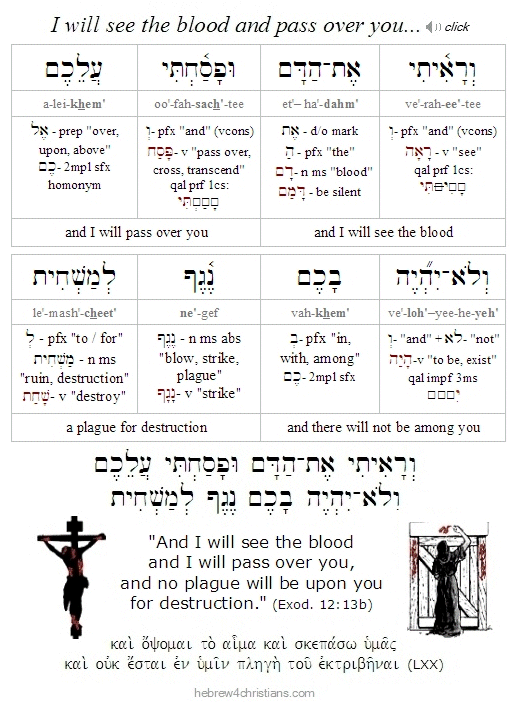 |
It was in the midst of the "dark cloud" that Yeshua made intercession for us (Matt. 27:45). The idea of substitutionary atonement is surely mysterious, but ultimately the message is simple: God loves you and has made a way for you to be eternally accepted -- despite your sin... That's the "good news" of the cross, after all. That's what Yeshua meant when he said, "Just as Moses lifted up the serpent in the wilderness, so must the Son of Man be lifted up, that whoever believes in him may have eternal life. For God so loved the world, that he gave his only Son, that whoever believes in him should not perish but have eternal life (חַיֵּי עוֹלָם). For God did not send his Son into the world to condemn the world, but in order that the world might be saved through him" (John 3:14-17). Humanity as a whole has been "bitten by the snake" and needs to be delivered from its deadly venom. Just as the image made in the likeness of the destroying snake was lifted up for Israel's healing, so the One made in the likeness of sinful flesh was to be lifted up as the Healer of the world (Rom. 8:3). All we need to do is look and believe. Yeshua died for you so you can live. He stands at the door and knocks, offering to "pass over" your sin and to impart to you his life in exchange (Rev. 3:20).
Hebrew Lesson
Isaiah 53:4a Hebrew reading (click):
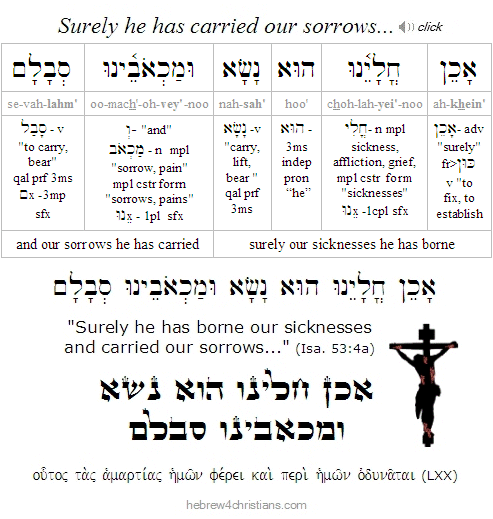 |
The Torah of Passover...
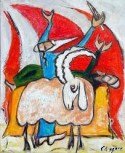
[ The following is related to this week's Torah reading, parashat Bo... ]
01.07.22 (Shevat 5, 5782) The very first occurrence of the word "Torah" (תּוֹרָה) in the Scriptures refers to the faith of Abraham (Gen. 26:5), and the second occurs in our reading for this week (i.e., parashat Bo) regarding the ordinance of Passover: "There shall be one law (תּוֹרָה) for the native and for the stranger who sojourns among you" (Exod. 12:49). There is a link here. Recall that Abraham lived before the time of the Exodus, of course, and therefore he obeyed the "Torah of Passover" by means of the Akedah (the sacrifice of his beloved son Isaac and the substitution of the lamb of God upon the altar). Abraham's faith revealed that the inner meaning of Torah is that the "righteous shall live by faith" (Hab. 2:4, Rom. 1:17), that is, by trusting God's justification of the sinner (Heb. 11:17-19). The Torah of Passover likewise teaches that redemption from death is possible through the exchange of an innocent sacrificial victim. The blood of the lamb was "a sign" of imputed righteousness obtained entirely by faith - with no "leaven," or human works, added. This is the "korban" principle of "life-for-life" that underlies the sacrificial system of the Mishkan (i.e., Tabernacle) as well. Ultimately all true Torah points to Yeshua, the Lamb of God, who is the divinely appointed Redeemer and promised Slayer of the Serpent...
"When the fullness of time (τὸ πλήρωμα τοῦ χρόνου) had come, God sent forth his Son, born of woman, born under the Torah, to redeem those who were under the Torah, so that we might receive adoption as sons" (Gal. 4:4-5).
Hebrew Lesson
Leviticus 17:11c Hebrew reading (click):
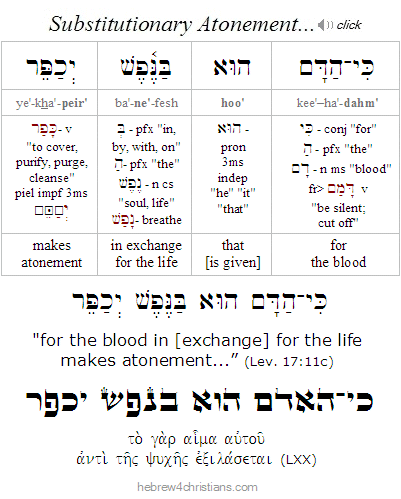 |
Redemption and Holiness...

01.07.22 (Shevat 5, 5782) In our Torah for this week (i.e., Bo) we revisit the institution of the Passover sacrifice and the deliverance of the Israelites from their bondage in Egypt. Later in the Torah we read God's reason for the redemption: "For I am the LORD who brought you up out of the land of Egypt to be your God. You shall be holy, for I am holy" (Lev. 11:45). Because we are God's people, his redeemed children, we are made holy, just as God is holy (1 Pet. 1:15-16). Holiness, however, is not a matter of what you do (such as wrapping yourself in religious rituals) but instead is a matter of what you "allow" to happen: You let go and allow yourself to be rescued and taken up from the "depths of Egypt" to be with God. Holiness is something you receive by faith; it is a gift of being "set apart" to be sacred and beloved by God. Genuine holiness (i.e., kedushah) is connected with love and grace.
In Hebrew, the word kedushah (קְדוּשָׁה) means sanctity or "set-apartness" (other Hebrew words that use this root include kadosh (holy), Kiddush (sanctifying the wine), Kaddish (sanctifying the Name), kiddushin (the ring ceremony at a marriage), and so on). Kadosh connotes the sphere of the sacred that is radically separate from all that is sinful and profane. As such, it is lofty and elevated (Isa. 57:15), beyond all comparison and utterly unique (Isa. 40:25), entirely righteous (Isa. 5:16), glorious and awesome (Psalm 99:3), full of light and power (Isa. 10:7), and is chosen and favored as God's own (Ezek. 22:26).
Hebrew Lesson
Leviticus 11:45b Hebrew reading (click):
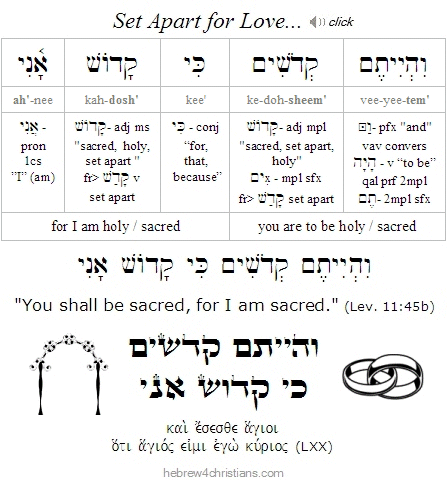 |
Facing our Pharaohs...
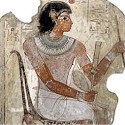
01.07.22 (Shevat 5, 5782) The sages sometimes "allegorize" the Exodus into a parable about the journey of faith. Moses represents our heart called by God, whereas Pharaoh represents our sin nature and the tyranny of the ego... Like Moses we are called by God to "go to Pharaoh," that is, to confront what keeps us from experiencing our freedom. The "heart of Pharaoh" represents our cynical and hardened self – the defensive ego that is fearful and marked by unhealed grief. We must face this "Pharaoh" and courageously demand to be set free to serve the LORD. The power of Pharaoh represents the "surface" of things - the world and its burdens, its fleeting vanities, its ongoing "need" to control others, and so on. Salvation (יְשׁוּעָה) is likened to rebirth that delivers us from the "narrow places of Egypt" (i.e., from mitzrayim: -מ, "from," and צַר, "narrow") into newness of life...
Note: None of this is meant to impugn the historical Exodus, of course, but to find a way to make it's experience felt dor va'dor - "in every generation..."
He will never leave you...

01.06.22 (Shevat 4, 5782) The Scriptures declare that though the "outward self" (ὁ ἔξω ἡμῶν ἄνθρωπος) inevitably wastes away (διαφθείρω), the "inner self" (ὁ ἔσω ἡμῶν) is being renewed (ἀνακαινόω, i.e., "raised up in newness of life") day by day (2 Cor. 4:16), which implies that we have nothing to fear regarding our perpetuity and acceptance as God's beloved children. Therefore we do not "lose heart" (lit., act badly, from ἐκ, "out" + κακός, "badly"). Despite the shadows of this world, we take hold of the words of our Savior, who said: "I give you eternal life, and you will never be destroyed (ἀπόλλυμι), and no one will snatch you out of my hand" (John 10:28). And in another place he likewise said, "Everyone who lives and believes in me shall never die (οὐ μὴ ἀποθάνη)" (John 11:26).
Hebrew Lesson
Isaiah 43:1b Hebrew reading (click):
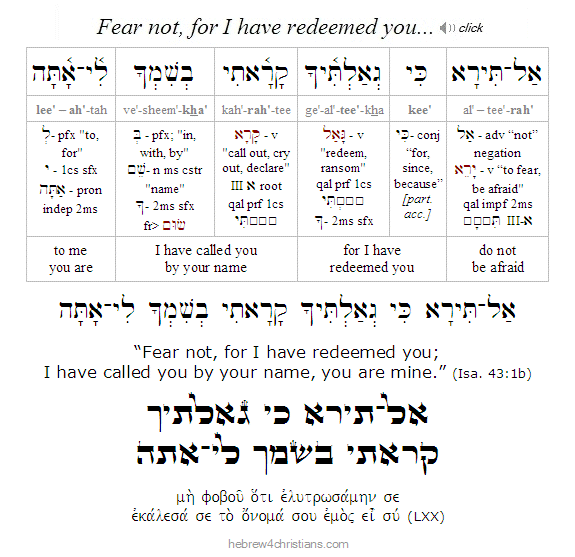 |
God has redeemed you, friend, and has called you by name; he knows you intimately, and you belong to Him. God does not call groups, but rather individuals. The Spirit calls out, "follow me..." The Lord never leaves nor forsakes those who trust in Him, even if they should face waters that seem to overwhelm or fires that seem to devour and consume.
Tears in His Bottle...
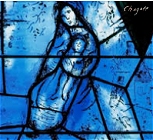
01.06.22 (Shevat 4, 5782) "Godly sorrow works teshuvah (repentance) unto salvation" (2 Cor. 7:10). This deep sorrow is more than just sadness or regret over some sin or wrongdoing of your past. Genuine godly sorrow expresses inner poverty - being "poor in spirit" - wherein the heart realizes that sin is not something "out of character," as if it did not really come from you, but rather that it is a dreadful sickness of your own soul, an inner power or corrupting force from which you need divine intervention and deliverance (Jer. 17:9). We are not sinners because we sin; we sin because we are sinners...
The Puritans prayed for the "gift of tears" by which they meant the healing virtue of experiencing genuine repentance before God. They asked God for help because doing teshuvah - really doing it as opposed to just thinking you did - requires a miracle, a profound change of direction, a new way of seeing. In general our lives are a tangled web of deceit, self-deception, ignorance, folly, and so on, and when we are confronted with a particular sin, we are quick to rationalize and even deny our responsibility. Jean Paul Sartre would call this mauvaise foi, or "bad faith," that is, the habit of denying that our actions have real consequences for which we alone must bear. Often it takes many years to truly understand the depth of our inner corruption, the sickness of our souls, the way we deceive ourselves and make excuses for the sorrows and pains we have caused others and ourselves.
So how long has it been since you have wept over your sinful condition? Not how long has it been since you have revisited some regret from your past - but how long has it been since you have "collapsed in on yourself," confessing the horror and revulsion over your forlorn and desperate soul? Do you feel in your bones the awfulness of your sinful life? Or are you quick to make excuses for your wretchedness? Do you find fault in others to justify your own hardness of heart? Do you harbor secret resentment enabling you to hold on to your sickness? These are "worldly sorrows" that work death (2 Cor. 7:10). We may give lip service that we are sinners, but do we feel the grief and weight of our sin? Do we abhor ourselves and repent in dust and ashes? (Job 42:6). Dear friend, how can God wipe away every tear from our eyes in the next world if we have not wept in this one?
On the other side of our confession of brokenness we discover that God consoles us for the wounds we suffer in this life. It is written in our Scriptures: "You have kept count of my miseries; store my tears in your bottle. Are they not in your book?" (Psalm 56:8). The LORD "numbers" or "recounts" the heartaches and wanderings of your life; He keeps an account or a record of your trouble in His "scroll of remembrance" (Mal. 3:16). God does not overlook the anguish of your heart but carefully numbers each of your tears, storing them "in His flask," which may allude to the ancient custom of putting tears shed for the death of someone into a small container (i.e., "tear bottles"). The picture is one of profound intimacy and comfort, when in the world to come the LORD will personally console you for your sorrows. Not one pain of your life will be overlooked by heaven.
May our hearts be both softened and full of conviction as we ponder these things. Amen.
Hebrew Lesson:
Psalm 56:8 Hebrew reading (click):
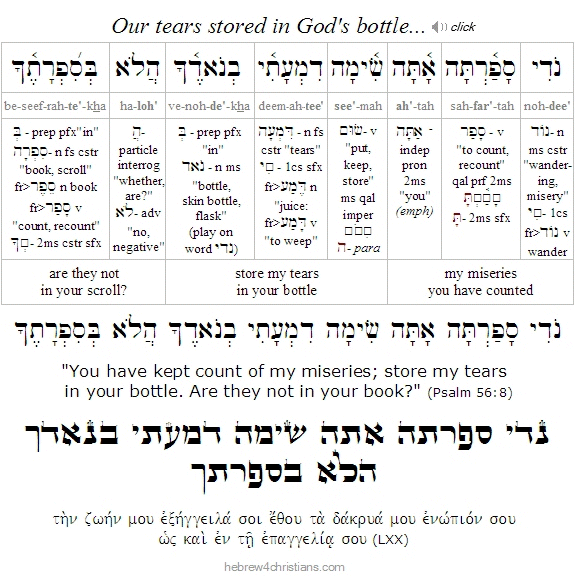 |
Should we live in fear of ourselves? After all, "the heart is deceptive above all things and desperately wicked" (Jer. 17:9), and it is woefully easy to fool ourselves regarding our sins (1 Cor. 8:2; Gal. 6:3; James 1:26). Well on the one hand we should indeed be afraid of our own sinful condition and abhor the sin in our lives, but on the other we must practice hope in God and trust in his healing and deliverance. Moreover, we can experience freedom from dread by receiving the joy that comes from the assurance that we are accepted in the Beloved. We must understand our sin in relationship to the wounds of the Savior, since without that connection, our repentance will be vain indeed.... God has not given us a spirit of slavery to fall back into fear; and there is no fear in His love (Rom. 8:15; 2 Tim. 1:7; 1 John 4:18). Of course we all will fail the test apart from the grace and love of God, and no one can be approved by means of the unaided will. We all need a miracle from God to love Him in the truth and to pass the test -- but God is the One who performs miracles for us. The LORD is Adonai Nissi (יהוה נִסִּי), the God of my miracle...
The Heart of Reality...

01.05.22 (Shevat 3, 5782) "I determined not to know any thing ... apart from Yeshua the Messiah and him crucified" (1 Cor. 2:2). This mode of "not knowing apart" bespeaks a radical intimacy that mediates and transforms all other thought within you. It is the axiom of spiritual existence, the matter of "first importance," the heart of everything: to know the healing love of Messiah and the power of his resurrection on your behalf (Phil. 3:10). When you accept the Divine Presence in Yeshua, everything becomes simple, unified, and focused. Choosing to know everything "through" Yeshua moves you to the center of reality - where the present moment is lit up with the glorious light of the eternal... You begin to see past the distractions of this world - "for God is not in the earth, wind or fire" (1 Ki. 19:11-12) - beyond the ups and downs of your life, the hunger and thirst of your heart, past all your fears, desires, and sorrows, to hear the "still small voice" (i.e., kol demamah dakkah: קוֹל דְּמָמָה דַקָּה), to enter an unimaginably wonderful peace, the place of God (i.e., ha'makom: הַמָּקוֹם) which is your true home, the habitation of our all-loving Father who calls you by name...
"To all who overcome I will give a bright stone..." (Rev. 2:17). But what do you overcome if not unbelief, the fear that the miracle is not for you, the terror that you are not welcome in the most significant sense of reality? Many forfeit the highest for the sake of lesser things. We overcome despair by means of faith - by trusting in the One who gives us the victory (1 Cor. 15:57; 1 John 5:4-5). There is no "overcoming" apart from the love of God, who takes us up into his life and gives us his triumph over sin and death. Glory belongs to the Lord...
Hebrew Lesson:
Psalm 104:31 Hebrew reading (click):
New Beginnings...

[ The following is related to this week's Torah reading, parashat Bo.... ]
01.05.22 (Shevat 3, 5782) The very first word of the Torah indicates the awareness of the significance of time - "in the beginning..." (Gen. 1:1), and according to Jewish tradition, the very first commandment given to the children of Israel (as a whole) was that of Rosh Chodesh (ראש חודש), or the declaration of the start (or head) of the "new month," particularly concerning the first month of their redemption (Exod. 12:2). In other words, Passover month was to begin Israel's year. Note that the word for month (i.e., chodesh) comes from the root chadash (חָדָש), meaning "new," and therefore the Passover redemption (chodesh yeshuah) was intended to mark a "new beginning" for the Jewish people. And indeed, God marks the start of our personal redemption as the beginning of our life as a new creation (2 Cor. 5:17), just as Yeshua is the "first of the firstfruits" of God's redeemed humanity (1 Cor. 15:45-49).
Hebrew Lesson:
Exod. 12:2 Hebrew reading (click):
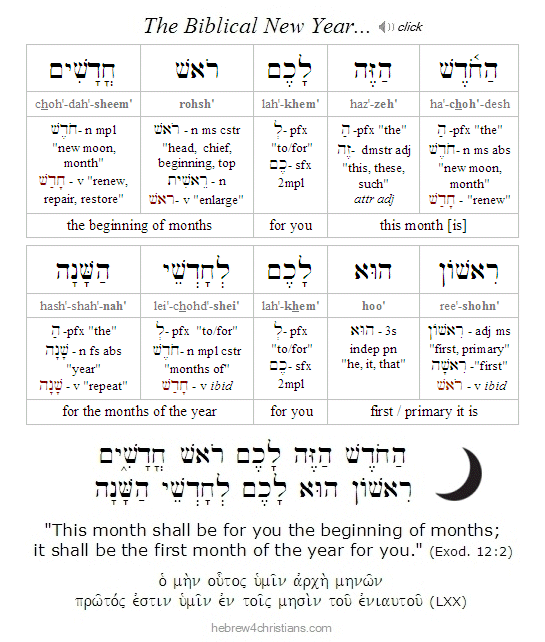 |
Created for His Glory...

01.05.22 (Shevat 3, 5782) It's been said that God sends each soul into the world with a special message to deliver, a revelation that only he or she can disclose... No one else can bring your message to this world - only you can do this. And since God is entirely unique, you are called to be who you were created to be, not someone else. On his deathbed Reb Zusya said, "I am not afraid that the Holy One will ask me, 'Zusya, why were you not more like Moses?' Rather, I fear the Holy One will say, 'Zusya, why were you not more like Zusya?'
George MacDonald once wrote: "I would rather be what God chose to make me than the most glorious creature that I could think of; for to have been thought about, born in God's thought, and then made by God, is the dearest, grandest and most precious thing in all thinking." Amen. We are God's workmanship in the Messiah; "by the grace of God I am what I am" (xάριτι δὲ θεοῦ εἰμι ὅ εἰμι).
There are no insignificant people in God's eyes, since each soul has been created by Him for His glory and purposes... As C.S. Lewis wrote, "There are no 'ordinary' people. You have never talked to a mere mortal. Nations, cultures, arts, civilizations -- these are mortal, and their life is to ours as the life of a gnat. But it is immortals whom we joke with, work with, marry, snub and exploit - immortal horrors or everlasting splendors" (The Weight of Glory).
Life is a miracle and nothing is trivial. In the world to come you will be shocked to understand that everything you thought, everything you said, and everything you did was given to you from above, and therefore has tremendous significance (Matt. 12:36-37). Therefore may it please the Lord to open our hearts and eyes to truly come alive... Amen.
Hebrew Lesson:
Psalm 119:73 Hebrew reading (click):
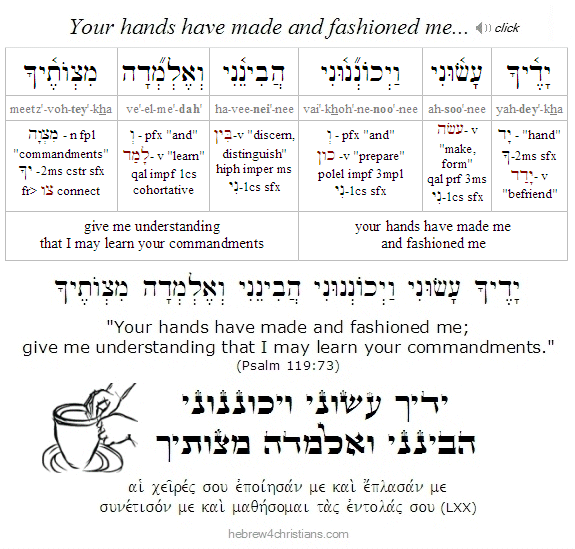 |
Not losing your mind...

01.04.22 (Shevat 2, 5782) The Apostle Paul wrote that the time before the "End of Days" would be "perilous" and full of unrelenting human depravity and lawlessness (2 Tim. 3:1-5). Yeshua warned that apostasy would abound and that the hearts of many would run cold as ice (Matt. 24:12). In light of the raging spiritual war going on all around us, the following needs to be emphatically restated: "The important thing is to not lose your mind..."
The mind is the "gateway" to your heart, and it is therefore essential to guard your thinking by immersing yourself in the truth... "Not losing your mind" therefore means being grounded in what is real, and it therefore means understanding your identity and provision as a child of God. "God has not given us the spirit of fear, but of power and of love, and of a sound mind" – literally, a "delivered" mind, "healed" from chaos and despair (2 Tim. 1:7). The Greek word "sound mind" (σωφρονισμός) comes from a verb meaning "to be made safe," in the sense of being under restraining influence of the Spirit of God... The closest Hebrew word might be musar (מוסר), or "moral discipline."
With the appearance of "mass formation psychosis" rampant today (i.e., collective insanity), it's now more important than ever to guard your heart and mind. Learn to practice clear thinking; define terms you use without equivocation; take care to avoid biased ways of seeing, and avoid common fallacies such as making appeals to fear, blaming others (tu quoque), and so on... Be on guard because the enemy of your soul wants to deceive you and lead you astray. Above all ask God for wisdom for this hour.
Hebrew Lesson:
Prov. 28:26 Hebrew reading (click):
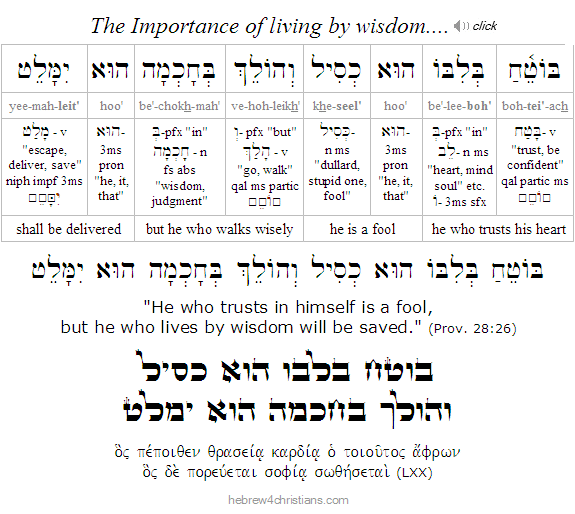 |
Retelling the Story...
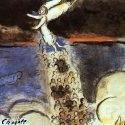
01.04.22 (Shevat 2, 5782) In our Torah reading for this week (i.e., parashat Bo) we are commanded to retell "in the hearing of your son and your grandson" how the LORD overthrew the arrogance of the Egyptians and performed wonders to deliver us" (Exod. 10:2). This commandment is the basis of the Passover haggadah (i.e., הַגָּדָה, "telling"), the "oral tradition" of our faith, when we personally retell the story from generation to generation so that the spirit of the message is not lost. We participate in the Passover seder to make it "our own story," a part of who we are. Therefore b'khol-dor vador: "Every Jew must consider himself to have been personally redeemed from Egypt." Retelling the story of the exodus enables us to "know that I am the LORD" (Exod. 10:2). We recall the words, bishvili nivra ha'olam – "For my sake was this world created," while we also recall the words, anokhi afar ve'efer – "I am but dust and ashes." When we retell the story of the great redemption, we strengthen our faith and better know the LORD our Savior.
Indeed God admonishes that the story of our redemption should be "as a sign on your hand and as a memorial (זִכָּרוֹן) between your eyes, that the Torah of the LORD may be in your mouth" (Exod. 13:9). We are instructed to "remember" (זָכַר) over and over again because our disease, our sickness of heart, induces us to forget how we were enslaved in the house of bondage. We must consciously remember and never forget that only by means of God's strong hand (בְּיָד חֲזָקָה) are we ever made free (John 8:36).
וְהָיָה לְךָ לְאוֹת עַל־יָדְךָ
וּלְזִכָּרוֹן בֵּין עֵינֶיךָ
לְמַעַן תִּהְיֶה תּוֹרַת יְהוָה בְּפִיךָ
כִּי בְּיָד חֲזָקָה הוֹצִאֲךָ יְהוָה מִמִּצְרָיִם
ve·ha·yah · le·kha · le·oht · al-yah·de·kha
ool·zee'·kah·rohn · bein · ei·ney'·kha
le·ma'·an · tee·he·yeh · toh·raht · Adonai · be·fee'·kha
kee · be·yahd · cha·zah·kah · ho·tzee·a·kha · Adonai · mee·meetz·rah'·yeem

"And it shall be to you as a sign on your hand
and for a memorial between your eyes,
that the Torah of the LORD may be in your mouth.
For with a strong hand the LORD has brought you out of Egypt."
(Exod. 13:9)

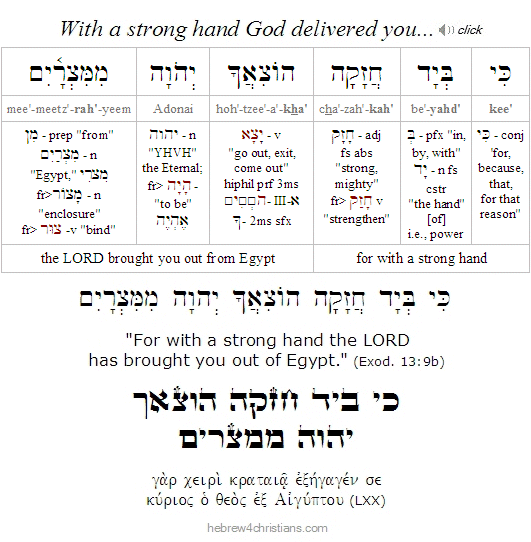
The Power of God (גְּבוּרַת אֱלהִים)

01.04.22 (Shevat 2, 5782) "For the word of the cross [i.e., ῾Ο λόγος ὁ τοῦ σταυροῦ - i.e., the meaning of the cross] is folly to those who are perishing..." But why is it regarded it as folly? Surely not because Yeshua died as a martyr for his faith, for even worldly wisdom may acknowledge the nobility of this (for example, when it esteems the death of the pagan philosopher Socrates at the hands of the Athenians). No, the offense of the cross comes from its message that we are helpless and lost apart from divine intervention. The cross is an affront to the aspirations of human reason because it states that through the lowliness and sacrifice of Yeshua - and only through Him - may a person be healed by God; and there is categorically no other way. The cross therefore exposes the sham of so-called worldly wisdom, proving it to be worthless and vain. However, to the person of faith, the cross is gevurat Elohim - "the power of God (גְּבוּרַת אֱלהִים) for those being saved" (1 Cor. 1:18).
The Hebrew word for salvation (i.e., yeshuah: יְשׁוּעָה) comes from a root (i.e., yasha: ישׁע) that means to "make wide," to make "broad," "spacious," or "free [from what blocks or holds in bondage]." The word is used to describe deliverance from Egypt (Exod. 14:13; Deut. 33:29), victory over Israel's enemies (Num. 10:9; Psalm 44:7), release from exile (Isa. 46:13; Ezek. 44:22), and the divine preservation and blessing of the Jewish people (Jer. 14:8). The word is also associated with deliverance from sin and its penalty (Jer. 17:14; Psalm 51:12,14). The LORD God of Israel is called the Savior (Isa. 45:21 - (i.e., moshia [מוֹשִׁיעַ] - from the same root). The Name transliterated as "Jesus" is Yehoshua (יְהוֹשׁוּעַ) in Hebrew, from יְהוָה and יָשַׁע, which means "YHVH is salvation" or "YHVH saves." As it is uttered by the agency of the Ruach ha'emet: אָנֹכִי אָנֹכִי יְהוָה וְאֵין מִבַּלְעָדַי מוֹשִׁיעַ - "I, even I am the LORD, and besides me there is no Savior" (Isa. 43:11).
אָנכִי אָנכִי יְהוָה
וְאֵין מִבַּלְעָדַי מוֹשִׁיעַ
ah·no·khee · ah·no·khee · Adonai
ve·ein · mee·bal·ah·dai · moh·shee'·a

"I, even I, am the LORD,
and besides me there is no Savior."
(Isa. 43:11)

Hebrew Lesson:
Isa. 43:11 Hebrew reading (click):
Shelter of the Most High...
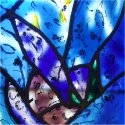
01.04.22 (Shevat 2, 5782) The "world" is a place of fearful exile from the Lord. To find healing, turn away from its faithless messages and listen (shema) to the great promises of God. As it is written: "He who abides in the secret of the Most High will dwell in the shadow of Shaddai" (Psalm 91:1).
The sages say that Moses wrote Psalm 91 as he dwelt in the secret place (סֵתֶר) of the Most High God, in the "midst of the dark cloud" (Exod. 24:18), a place of sacred and holy concealment. The thick clouds are a "hiding place" for him (Job 22:14). Notice that the one who "abides" in the secret of the Most High dwells in an ascended place of rest – being lifted up above the surrounding madness of this fallen world of flux and shadows. The Hebrew word means to lodge or to "sleep" (לִין), connecting it with death and resurrection. By dwelling in the death and resurrection of Yeshua, God will shield you with His Presence and make evil powerless before you.
When you "abide" in the secret of Elyon - the Ascended One - you are concealed by the dark clouds of His Glory, and the Presence of Shaddai overshadows you... The LORD will save you from the ensnaring trap and from the devastating pestilence (Psalm 91:3). By abiding in the truth that God's Presence pervades all things at all times - you become a "stranger" (גֵּר) with the LORD in this world, a "sojourner" (תּוֹשָׁב) who awaits the recompense of the wicked and the healing of the world at the end of the age. "You will tread on the lion and the adder; the young lion and the serpent you will trample underfoot" (Psalm 91:13).
We are made secure only on account of the LORD our God Yeshua, who gloriously ascended over the powers of this age, the hidden principalities of darkness, and who made safe passage for us to come by means of his sacrificial death on the cross. Yeshua is the Bridge and the Way to the truth that sets you free, though He indeed is the narrow bridge. Because of Him alone, we have access to the Divine Presence, the Holy of Holies made without human hands. Yeshua is the Ascended LORD of Glory, the Master of all possible worlds, and the King over all things. Nothing can stop Him or thwart His victory secured for those who trust in Him.
Hebrew Lesson:
Psalm 91:1 Hebrew reading (click):
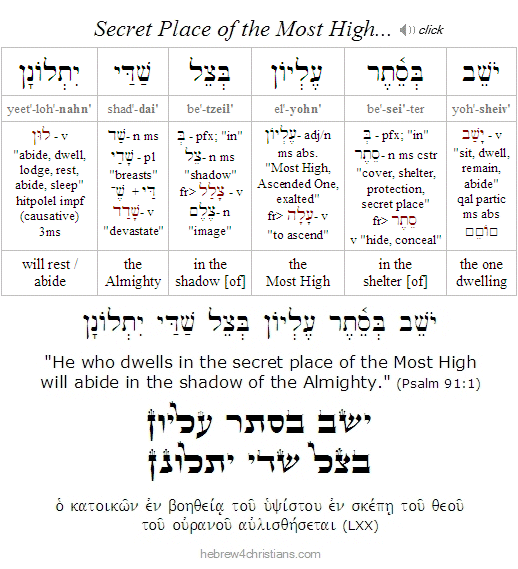 |
Since God hides Himself in this world (Isa. 45:15), we must humbly seek His face to enter into the place of His holy concealment in all things. God is Elyon – High above - but He dwells "with the lowly and the broken of heart" (Isa. 57:15). Therefore the LORD our God is called Shaddai (שַׁדַּי) – our Sustainer, Provider, Refuge, and Home. Just as we can be surrounded by the "shadow of death" (tzal mavet), so we can be surrounded by the "shadow of Shaddai" (tzal Shaddai). Like a powerful eagle brooding over her chicks, so Shaddai covers you with wings of protection (Psalm 91:4).
Torah of Empathy...

01.03.22 (Shevat 1, 5782) There is an old Chassidic story of two men sitting and enjoying a drink together. One of them then says to the other, "You know, you're my best friend. I really love you, brother!" The other man responds, "Oh yeah? If you really love me, tell me where I hurt..."
The point of this simple story is that we can't really say we love someone without taking the time to know them -- and that means knowing how they suffer. Most of us are afflicted, of course, but are we able to transcend our own pain to genuinely empathize with others? Conversely, how many people do we trust enough to to confide our own pains and heartaches? The Law of Messiah (תוֹרת המשׁיח) is to bear one another's burdens (τα βαρη, "weights," Gal. 6:2), and that means making ourselves vulnerable -- and making room inside our hearts for the vulnerability of others. James the Righteous tells us that personal healing comes from confessing outwardly (εξομολογεισθε) our sins (τας αμαρτιας) to one another so that we may be healed (James 5:16). Of course it is humbling to acknowledge our sins, our failures, and our hurts to another person, but without an audience for the inner voice of our pain, we suffer all the more...
If someone loves us, they will know "where we hurt"; and if we love them, we will know where they hurt, too. This same principle can also be applied to our relationship to Yeshua... We take comfort that Yeshua sticks closer to us than a brother, praying for us and "knowing where we hurt." But if we say that we love him, are we are not claiming that we know "where he hurts?" Does Yeshua suffer today? The Apostle Paul wrote: "Now I rejoice in my sufferings for your sake, and in my flesh I am filling up what is lacking in Christ's afflictions for the sake of his body, that is, the church" (Col. 1:24). What is "lacking in Messiah's afflictions" is our present sacrifice for the sake of others... Yeshua hungers with those who are hungry, thirsts with those who are thirsty, feels loneliness with those who are abandoned, shivers with those who are cold, weeps with those who are forlorn, is imprisoned with those who are incarcerated, is sick with those who are ill, and so on (Matt. 25:31-ff). Yeshua feels the pain of even the "least of these my brothers." This is where he hurts, chaverim, and he calls to us to extend his grace and compassion to others.
The essential difference between the righteous and the unrighteous is revealed in their response shown to those in need. After all, on the Day of Judgment, both the righteous and the unrighteous will account for their choices in light of the selfsame needy and pain-riddled world. The destiny of each person will be determined by whether he or she took the time to genuinely engage the suffering of others. May the LORD help us to share His heart and passion for a lost and hurting world. Amen.
Hebrew Lesson:
Psalm 116:1-2 Hebrew reading (click):
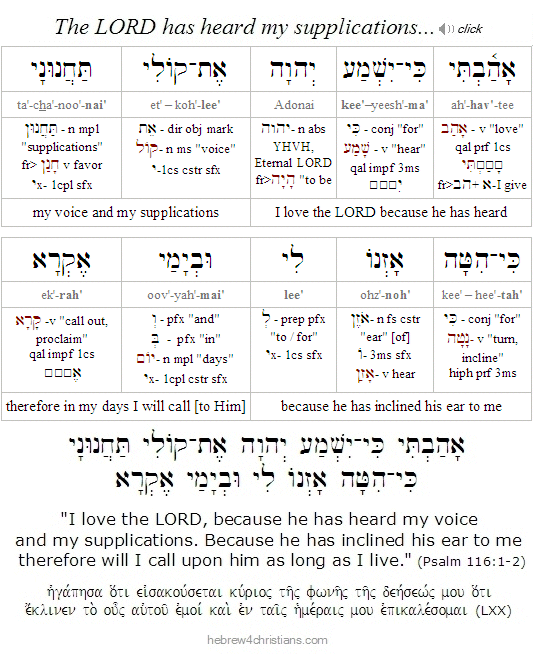 |
Keep on Trusting...
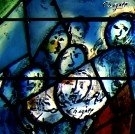
01.03.22 (Shevat 1, 5782) When Yeshua said, "Let not your heart be troubled... I go to prepare a place for you" (John 14:1-2), he was assuring us that he had matters well under his control, and therefore we need not worry, since his passion rendered our salvation completely secure... The future is a "prepared place" for you, even if life in this world is often marked by testing and various refining fires. God has not promised to rescue us according to our own schedule, however, so if it appears that your prayers are not immediately answered, keep waiting in faith: "Rejoice, even if you have been grieved by various trials, because the tested genuineness of your faith -- more precious than gold that perishes though it is tested by fire -- may result in praise and glory and honor at the revelation of Yeshua the Messiah" (1 Pet. 1:6-7). God works "all things together for good," and since the exercise of faith is your good, he engineers all things to build your faith. "For my thoughts are not your thoughts, neither are your ways my ways, says the LORD" (Isa. 55:8).
Recall the words: "Let him who walks in darkness and has no light trust in the name of the LORD and rely on his God" (Isa. 50:10). Trusting in God (i.e., bittachon - בִּטָּחוֹן) doesn't mean that we are obligated to say this is "the best of all possible worlds," though it does mean we believe that eventually God will wipe away every tear and make all things right... Bittachon is a word for this world, which says, "Though he slay me, I will trust in him..." Those who call upon the LORD can trust not only in concealed good behind ambiguous appearances ("all things work together for good") but also in a future, real, substantive good that will one day be clearly manifest for us all... We fight the "good fight" of faith, which is a worthy struggle that eventually is realized for blessing. Meanwhile, may the LORD our God keep us from such depth of sorrow that leads to sickness, darkness and despair.
The very last promise of Scripture is "I come quickly" (אֲנִי בָא מַהֵר) and the last prayer is, "Amen, come, Lord Yeshua" (אָמֵן בּאָה־נָּא הָאָדוֹן יֵשׁוּעַ) [Rev. 22:20]. Meanwhile we "inwardly groan" for the fulfillment of our redemption; since presently we are suspended between worlds, walking in hope yet subject to the vanities that befall all flesh. And though God may tarry, He declares, "I am the LORD; in its time I will hasten it" (Isa. 60:22). So we are made captives to hope, clinging to the promise of our ultimate healing and redemption. Our hearts therefore affirm that God is faithful "to keep you from falling, and to present you faultless before the presence of his glory with exceeding joy" (Jude 1:24). Amen. God will help us before He will help us, and may He come speedily, and in our day....
Hebrew Lesson
Psalm 27:14 Hebrew reading (click):
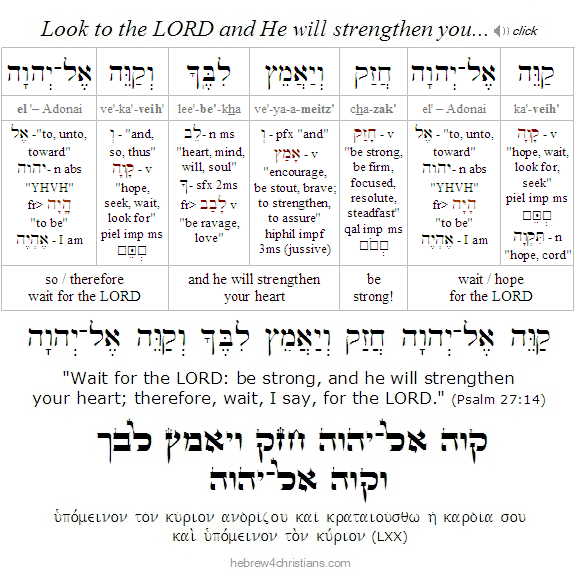 |
The Suffering of Truth...
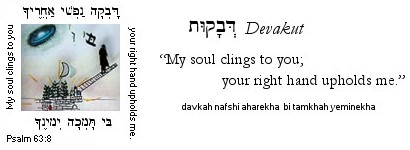
01.03.22 (Shevat 1, 5782) We may say that we should bless the Lord for the bad as well as for the good (Job 2:10), since we affirm that God does everything for our ultimate benefit (Rom. 8:28), and we may therefore infer that affliction is a "messenger" from above provoking us to do teshuvah. If we had greater understanding or more faith, we may suppose, then we would accept that our troubles and sorrows are really disguised "afflictions from love" and we would learn to accept them without protest or bitterness...
But that's how we might reason. And while it is true that we trust in God's providential plans for our lives, we still feel pain, we still get sick, we cry, we get frustrated, angry, and even feel forsaken at times. However we must not be offended over our frailty, our vulnerability, and our smallness of faith, friends. God is with us, even when we are confused or unsure...
An old story relates how some disciples wondered why their rebbe wept when he was falsely imprisoned. Didn't he regularly teach them that all trouble is for ultimate good? Said the rebbe, "When God sends bitterness, we ought to feel it..." Can you imagine someone admonishing Yeshua not to weep during his intercession at Gethsemane saying, "Where is your faith, Master?" Don't you believe that God is working all things for good?" There is very little difference between these sorts of "questions" and the taunts Yeshua received when he bled out on the cross for our sins (Matt. 27:39-45; Luke 23:35-37).
Look, there is "theology" and then there is the passion of living out your faith. Theology offers up the "right answers" while living by faith raises unanswered questions. People who live way up in their heads often forget their hearts. From a "legalistic" point of view Job was wrong to have argued with God; Moses was wrong to have despaired over his mission; Jeremiah was wrong to have lamented over the destruction of Jerusalem; David was wrong to have cried out for justice over his enemies, and John the Baptist was wrong to have doubted the identity of Messiah, to mention just a few instances where we see that passion, hunger and thirst, overruled the doctrines taught in our theology books.
This reminds me of another story I once read. A godly man died and was standing before the bar of the heavenly tribunal, undergoing questioning: "Did you learn Torah, as Moses had commanded?" he was asked. "No," he quietly answered. "Or did you pray with all your heart and soul, seeking God in all your ways?" he was asked. "No," the man again softly replied. "Well then did you do good, as implied by the categorical duty to care for others?" And again the man meekly said no... When the judgment was then given, however, the man was awarded divine favor, since he poke the truth and appealed only to God's mercy and love. The tzaddik is truthful even in his untruth; he confesses his wayward affections and acknowledges his weakness before God; he accepts the imperfection at the core of his being, and therefore he appeals only to his great need for God's love and mercy to make things right, to heal him, and to bring him home...
Hebrew Lesson
Psalm 73:25 Hebrew reading (click):
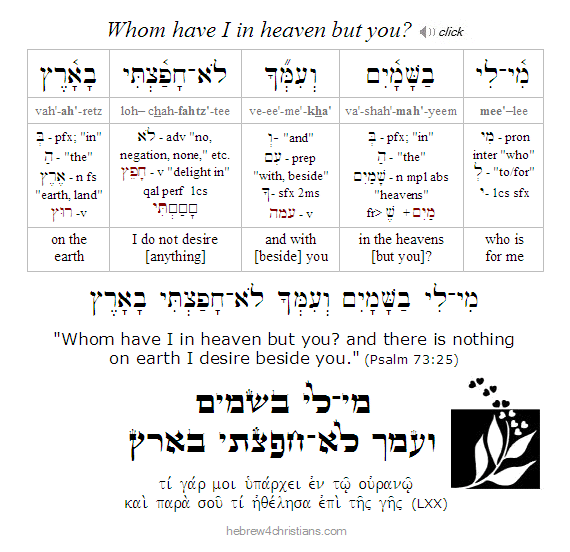 |
Know Him in all your ways...

01.02.22 (Tevet 29, 5782) Where it says, "Know Him in all your ways" (Prov. 3:6), that includes the way of your sins, old seemingly intractable habits of character, and the deepest wounds of your soul. "Pray without ceasing" -- in the midst of your temptations, as you encounter the allure of lust, the fires of anger, or simply the desire to fade away.... Do not hide your struggle - your unclean thoughts, your ambivalence, your need for deliverance - but be quick to pray, to confess, and seek God's mercies. Yeshua is the Good Shepherd, and he is looking out for you, interceding for you, calling out to you in the midst of the storm.
Hebrew Lesson
Proverbs 3:6 Hebrew reading (click):
The Torah says, "Know therefore today and return to your heart (וַהֲשֵׁבתָ אֶל־לְבָבֶךָ), for the LORD is God in heaven above and on the earth beneath; there is no other" (Deut. 4:39). Here we see the centrality of the heart as the place to encounter God (Luke 17:21). In all our ways we are to know Him, and that includes whatever way you find yourself in at this very hour. Today is the day of salvation; pour out your heart before him (Psalm 62:8).
Exodus and the Lamb...
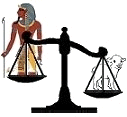
[ Our Torah reading for this week, Parashat Bo, describes the great Passover by means of faith in the efficacy of the blood of the Lamb of God and the subsequent exodus from Egypt... ]
01.02.22 (Tevet 29, 5782) Shavuah tov, chaverim. Our Torah reading for this week (Exod. 10:1-13:16) begins with God commanding Moses "to go" (i.e., bo: בּא) before the Pharaoh to announce further apocalyptic judgments upon Egypt. The purpose of this power encounter was to vindicate God's justice and great glory (deliverance/salvation) by overthrowing the tyranny of unjust human oppression. Pharaoh's nightmare of "one little lamb" outweighing all the firstborn of Egypt was about to be fulfilled....
Hebrew Lesson
Exodus 10:1 Hebrew reading (click):
Recall that last week's Torah (i.e., parashat Va'era) retold how Pharaoh defiantly refused to listen to Moses' pleas for Israel's freedom, despite seven devastating makkot (plagues) that came upon Egypt in God's Name (יהוה). In this week's portion (i.e., parashat Bo), the battle between the LORD and Pharaoh comes to a dramatic conclusion. The last three of the ten plagues are unleashed upon Egypt: a swarm of locusts devoured all the crops and greenery; a palpable darkness enveloped the land for three days and nights; and all the firstborn of Egypt were killed precisely at the stroke of midnight of the 15th of the month of Nisan... In this connection note that the word בּא ("go") and פרעה ("Pharoah") added together equal the gematria of משׁיח ("mashiach"), providing a hint of the Messianic redemption that was foreshadowed in Egypt. Every jot and tittle, chaverim!
Before the final plague, God instructed the Jewish people to establish a new calendar based on the sighting of the new moon of spring. On the tenth day of that month, God told the people to acquire a "Passover offering" to Him, namely an unblemished lamb (or goat), one for each household. On the 14th of that month ("between the evenings") the animal would be slaughtered and its blood sprinkled on the doorposts and lintel of every Israelite home, so that God would "pass over" these dwellings when He came to kill the Egyptian firstborn that night. The roasted meat of the offering was to be eaten that night with unleavened bread (matzah) and bitter herbs (maror). God then commanded the Israelites to observe a seven-day "festival of matzah" to commemorate the Exodus for all subsequent generations.
Because of this, our corporate identity begins with a shared consciousness of time from a Divine perspective. The mo'edim (festivals of the LORD) all are reckoned based on the sacred calendar given to the redeemed Israelite nation. As it is also written in the Book of Psalms: "He made the moon for the appointed times" / עָשָׂה יָרֵחַ לְמוֹעֲדִים (Psalm 104:19). Undoubtedly Yeshua followed this calendar, as did His first followers (Gal. 4:4).
Just before the dreadful final plague befell, God instructed the Israelites to ask their Egyptian neighbors for gold, silver and jewelry, thereby plundering Egypt of its wealth (this was regarded as "uncollected wages" for hundreds of years of forced labor and bondage - not to mention for the services of Joseph, whose ingenuity brought the world's wealth to Egypt in the first place). Moses then instructed the people to prepare the Passover sacrifice, that is, the korban Pesach (קָרְבָּן פֶּסַה) - the Passover lamb - and to smear its blood on the two sides and top of the doorway, resembling the shape of the Hebrew letter Chet (ח). This Hebrew letter, signifying the number eight, is connected with the word חי (chai), short for chayim (חַיִּים), "life." The blood of the lamb (דַּם הַשֶּׂה) not only saves from the judgment of death, but also is a symbol of divine life given for our redemption. The "life is in the blood."
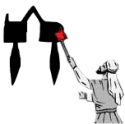
The dreadful final plague - the death of the firstborn - at last broke Pharaoh's resistance and he not only allowed the Israelites to depart without any conditions, he urged them to go. Because they left in great haste there was no time for their dough to rise. The Torah states that there were 600,000 adult men who left Egypt, along with the women, children, and a "mixed multitude" of other Egyptian slaves who tagged along.
The Israelites were commanded to consecrate all the firstborn to God and to commemorate the anniversary of the Exodus each year by celebrating the LORD's Passover in conjunction with the Feast of Unleavened Bread. During this time they were to remove all leaven from their homes for seven days, eat matzah, and retell the story of their redemption to their children. The portion ends with the commandment to wear tefillin (phylacteries) on the arm and head as a reminder of how the LORD saved the Israelites from their bondage in Egypt.
|






































